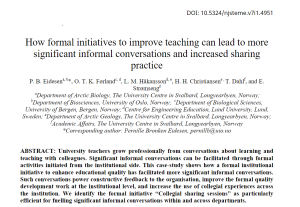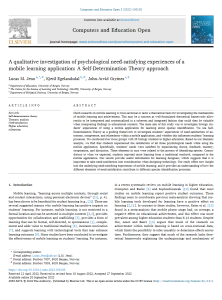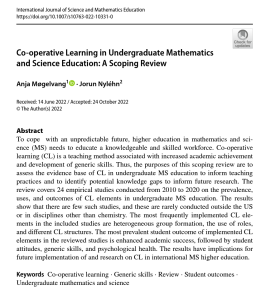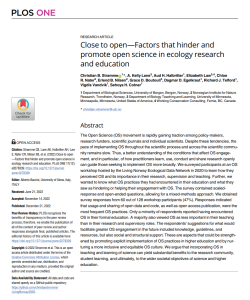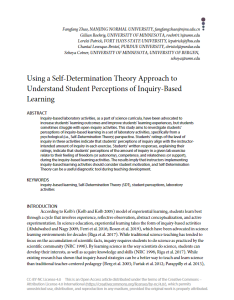Scientific Publications
2024
Abstract
Coming soon
Reference and link to the article
Johansen, M. O., Eliassen, S., & Jeno, L. M. (2024). Autonomy need satisfaction and frustration during a learning session affect perceived value, interest, and vitality among higher education students. In review - Scandinavian Journal of Educational Research.
2023
This year’s MNT-konferansen “Utdanning for fremtidens arbeidsliv” took place in Stavanger, Hotel Radisson Blu Atlantic on March 16th-17th. bioCEED contributed with posters, articles and corresponding presentations. The full list of contributions and authors is found below.
- What challenges do students face in introductory STEM courses, and how can instructors help? S.S. Bolland, E.C. Rønning, T.T. Try, S.H. Cotner, K.B. Daae and M.S. Glessmer
- Omlegging fra tradisjonelle forelesninger til studentaktiv læring – eksempel fra et grunnemne i biologi. Anne E. Bjune, Gunnar Bratbak, Sigrunn Eliassen, Bjørn Arild Hatteland, Kristin Holtermann, Maria Rigstad Langvad, Ruth-Anne Sandaa, Tone Stokka and Aina-Cathrine Øvergård
- Understanding student Sense of Belonging in introductory STEM courses. Costello, Robin, Hammarlund, Sarah, Christensen, Emily, Kiani, Kate, Glessmer, Mirjam and Cotner, Sehoya
- Certification of practical skills engages students and promotes learning. Simone I. Lang, Tina Dahl and Pernille B. Eidesen
- Surveying constructive alignment using CALEQ – exploratory factor analysis. C.B. Strømme, H. Barron, and J. Nyléhn
- Core Themes in Critical Thinking: Perspectives from Students and Teachers. J. Nyléhn, C. Boge, and J. Soulé
- Creating better work placements by understanding mentor challenges. K. Holtermann and S. Cotner
- Tools and practices for structured and documented student reflective thinking as a way to promote learning, enable better evaluation of learning activities and validate the achievement of intended learning outcomes. Kseniia Kalian
- STEM Teachers and Heads of Education as partners in change of Teaching and Learning. Oddfrid Førland, Kristin Holtermann, Anne Bjune and Sigrunn Eliassen
- Supporting Educational Change through Change Teams, Roy Andersson and Sehoya Cotner
University teachers grow professionally from conversations about learning and teaching with colleagues. Significant informal conversations can be facilitated through formal activities initiated from the institutional side. This case-study shows how a formal institutional initiative to enhance educational quality has facilitated more significant informal conversations. Such conversations power constructive feedback to the organisation, improve the formal quality development work at the institutional level, and increase the use of collegial experiences across the institution. We identify the formal initiative “Collegial sharing sessions” as particularly efficient for fuelling significant informal conversations within and across departments.
Reference and link to the article
P.B. Eidesen, O.T.K. Førland, L.M. Håkansson, H.H. Christiansen, T.Dahl & E. Strømseng (2023). How formal initiatives to improve teaching can lead to more significant informal conversations and increased sharing practice, Nordic Journal of STEM Education, DOI: https://doi.org/10.5324/njsteme.v7i1.4951
Abstract
Practical lab skills are rarely directly assessed. To improve constructive alignment between the described learning outcomes of practical skills and assessment, we developed and tested a certification procedure for microscopy skills. The procedure was embedded into the ordinary learning activity, so no additional time was needed. Three slightly different protocols were developed within the framework of sociocultural learning theory and built like a skill ladder, including direct peer assessment and elements of gamified learning. The protocols varied slightly in the way students were prepared for the certification, the number of steps/levels of achievement, and the consequences of failing. We tested the protocols at three different academic institutions and within 11 courses of varying sizes and academic levels in biology or geology. Feedbacks were collected through online surveys (n = 207) or orally after sessions. One protocol provided instruction videos as preparation material. Instruction videos provided increased understanding of the task, but tactile training was most important for learning. Regardless of institution, type of preparation, and level of former experience, the certification procedure made students clearly more engaged in the exercise. The majority reported that the certification procedure increased their motivation to learn, increased their perceived learning outcome, and was appropriate for assessing practical skills. Students with no or little experience in microscopy before the exercise were more positive about the certification procedure compared to skilled students, and the level of engagement and preparation was higher when there were some consequences of failing. Most students felt comfortable being certified by peers, but some students expressed concern about peers making mistakes. The presented certification procedure can easily be adapted to assess other practical skills and, with some adjustments, be an efficient method for assessment-as-learning, merging formative- and summative assessment.
Reference and link to the article
Eidesen, P. B., Bjune, A. E., & Lang, S. I. (2023). “Show me how to use a microscope” – The development and evaluation of certification as direct assessment of practical lab skills. Ecology and Evolution, 13, e10592. https://doi.org/10.1002/ece3.10592
Abstract
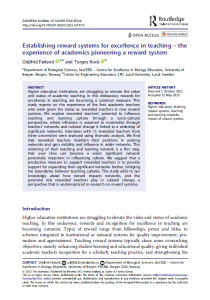 Higher education institutions are struggling to elevate the value and status of academic teaching. In this endeavour, rewards for excellence in teaching are becoming a common measure. This study reports on the experience of the first academic teachers who were given the status as rewarded teachers in new reward systems. We explore rewarded teachers’ potential to influence teaching and learning culture through a socio-cultural perspective, where influence is assumed to materialise through teachers’ networks and cultural change is linked to a widening of significant networks. Interviews with 13 rewarded teachers from three universities were analysed using thematic analysis. We find that rewarded teachers maintain their positions in existing networks and gain visibility and influence in wider networks. This widening of their teaching and learning network is a first step, that over time can become a wider significant network potentially important in influencing culture. We suggest that a productive measure to support rewarded teachers is to provide support for expanding their significant networks further, bridging the boundaries between teaching cultures. This study adds to our knowledge about how reward impacts networks, and the potential role rewarded teachers play in cultural change, a perspective that is underexplored in research on reward systems.
Higher education institutions are struggling to elevate the value and status of academic teaching. In this endeavour, rewards for excellence in teaching are becoming a common measure. This study reports on the experience of the first academic teachers who were given the status as rewarded teachers in new reward systems. We explore rewarded teachers’ potential to influence teaching and learning culture through a socio-cultural perspective, where influence is assumed to materialise through teachers’ networks and cultural change is linked to a widening of significant networks. Interviews with 13 rewarded teachers from three universities were analysed using thematic analysis. We find that rewarded teachers maintain their positions in existing networks and gain visibility and influence in wider networks. This widening of their teaching and learning network is a first step, that over time can become a wider significant network potentially important in influencing culture. We suggest that a productive measure to support rewarded teachers is to provide support for expanding their significant networks further, bridging the boundaries between teaching cultures. This study adds to our knowledge about how reward impacts networks, and the potential role rewarded teachers play in cultural change, a perspective that is underexplored in research on reward systems.
Reference and link to the article
Oddfrid Førland & Torgny Roxå (2023) Establishing reward systems for excellence in teaching – the experience of academics pioneering a reward system, European Journal of Higher Education, DOI: 10.1080/21568235.2023.2214713
Abstract
Ecology & Evolution has published its first Registered Report and offers the perspective of the editor, author, and student on the publication process.
Reference and link to the article
Gya, R., Birkeli, K., Dahle, I.J., Foote, C.G., Geange, S.R., Lynn, J.S., Töpper, J.P., Vandvik, V., Zernichow, C. and Jenkins, G.B. (2023), Registered Reports: A new chapter at Ecology & Evolution. Ecol Evol, 13: e10023. https://doi.org/10.1002/ece3.10023
Abstract
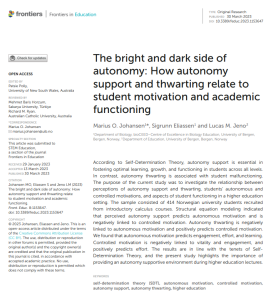 According to Self-Determination Theory, autonomy support is essential in fostering optimal learning, growth, and functioning in students across all levels. In contrast, autonomy thwarting is associated with student malfunctioning. The purpose of the current study was to investigate the relationship between perceptions of autonomy support and thwarting, students’ autonomous and controlled motivations, and aspects of student functioning in a higher education setting. The sample consisted of 414 Norwegian university students recruited from introductory calculus courses. Structural equation modeling indicated that perceived autonomy support predicts autonomous motivation and is negatively linked to controlled motivation. Autonomy thwarting is negatively linked to autonomous motivation and positively predicts controlled motivation. We found that autonomous motivation predicts engagement, effort, and learning. Controlled motivation is negatively linked to vitality and engagement, and positively predicts effort. The results are in line with the tenets of Self-Determination Theory, and the present study highlights the importance of providing an autonomy supportive environment during higher education lectures.
According to Self-Determination Theory, autonomy support is essential in fostering optimal learning, growth, and functioning in students across all levels. In contrast, autonomy thwarting is associated with student malfunctioning. The purpose of the current study was to investigate the relationship between perceptions of autonomy support and thwarting, students’ autonomous and controlled motivations, and aspects of student functioning in a higher education setting. The sample consisted of 414 Norwegian university students recruited from introductory calculus courses. Structural equation modeling indicated that perceived autonomy support predicts autonomous motivation and is negatively linked to controlled motivation. Autonomy thwarting is negatively linked to autonomous motivation and positively predicts controlled motivation. We found that autonomous motivation predicts engagement, effort, and learning. Controlled motivation is negatively linked to vitality and engagement, and positively predicts effort. The results are in line with the tenets of Self-Determination Theory, and the present study highlights the importance of providing an autonomy supportive environment during higher education lectures.
Reference and link to the article
Johansen MO, Eliassen S and Jeno LM (2023) The bright and dark side of autonomy: How autonomy support and thwarting relate to student motivation and academic functioning. Front. Educ. 8:1153647. doi: 10.3389/feduc.2023.1153647
Abstract
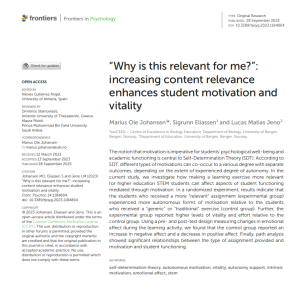 The notion that motivation is imperative for students’ psychological well-being and academic functioning is central to Self-Determination Theory (SDT). According to SDT, different types of motivations can co-occur to a various degree with separate outcomes, depending on the extent of experienced degree of autonomy. In the current study, we investigate how making a learning exercise more relevant for higher education STEM students can affect aspects of student functioning mediated through motivation. In a randomized experiment, results indicate that the students who received a more “relevant” assignment (experimental group) experienced more autonomous forms of motivation relative to the students who received a “generic” or “traditional” exercise (control group). Further, the experimental group reported higher levels of vitality and effort relative to the control group. Using a pre- and post-test design measuring changes in emotional affect during the learning activity, we found that the control group reported an increase in negative affect and a decrease in positive affect. Finally, path analysis showed significant relationships between the type of assignment provided and motivation and student functioning.
The notion that motivation is imperative for students’ psychological well-being and academic functioning is central to Self-Determination Theory (SDT). According to SDT, different types of motivations can co-occur to a various degree with separate outcomes, depending on the extent of experienced degree of autonomy. In the current study, we investigate how making a learning exercise more relevant for higher education STEM students can affect aspects of student functioning mediated through motivation. In a randomized experiment, results indicate that the students who received a more “relevant” assignment (experimental group) experienced more autonomous forms of motivation relative to the students who received a “generic” or “traditional” exercise (control group). Further, the experimental group reported higher levels of vitality and effort relative to the control group. Using a pre- and post-test design measuring changes in emotional affect during the learning activity, we found that the control group reported an increase in negative affect and a decrease in positive affect. Finally, path analysis showed significant relationships between the type of assignment provided and motivation and student functioning.
Reference and link to the article
Johansen MO, Eliassen S and Jeno LM (2023). “Why is this relevant for me?”: increasing content relevance enhances student motivation and vitality. Front. Psychol. 14:1184804. doi: 10.3389/fpsyg.2023.1184804
Abstract
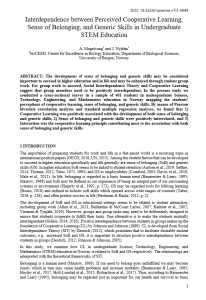 The development of sense of belonging and generic skills may be considered important to succeed in higher education and in life and may be enhanced through student group work. For group work to succeed, Social Interdependence Theory and Cooperative Learning suggest that group members need to be positively interdependent. In the present study we conducted a cross-sectional survey in a sample of 401 students in undergraduate Science, Technology, Engineering, and Mathematics education in Norway mapping the students’ perceptions of cooperative learning, sense of belonging and generic skills. By means of Pearson bivariate correlation analyses and standard multiple regression analyses, we found that 1) Cooperative Learning was positively associated with the development of both sense of belonging and generic skills, 2) Sense of belonging and generic skills were positively interrelated, and 3) Interaction was the cooperative learning principle contributing most to the association with both sense of belonging and generic skills.
The development of sense of belonging and generic skills may be considered important to succeed in higher education and in life and may be enhanced through student group work. For group work to succeed, Social Interdependence Theory and Cooperative Learning suggest that group members need to be positively interdependent. In the present study we conducted a cross-sectional survey in a sample of 401 students in undergraduate Science, Technology, Engineering, and Mathematics education in Norway mapping the students’ perceptions of cooperative learning, sense of belonging and generic skills. By means of Pearson bivariate correlation analyses and standard multiple regression analyses, we found that 1) Cooperative Learning was positively associated with the development of both sense of belonging and generic skills, 2) Sense of belonging and generic skills were positively interrelated, and 3) Interaction was the cooperative learning principle contributing most to the association with both sense of belonging and generic skills.
Reference and link to the article
Møgelvang, A., & Nyléhn, J. (2023). Interdependence between Perceived Cooperative Learning, Sense of Belonging, and Generic Skills in Undergraduate STEM Education. Nordic Journal of STEM Education, 7(1), 1-14. https://doi.org/10.5324/njsteme.v7i1.4949
Abstract
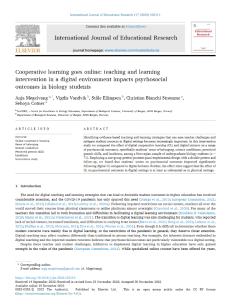 Identifying evidence-based teaching and learning strategies that can ease teacher challenges and mitigate student concerns in digital settings becomes increasingly important. In this intervention study we compared the effect of digital cooperative learning (CL) and digital lectures on a range of psychosocial outcomes, specifically students’ sense of belonging, science confidence, perceived generic skills, and loneliness, among a Norwegian sample of undergraduate biology students (n = 71). Employing a one-group pretest/posttest quasi-experimental design with a double pretest and follow-up, we found that students’ scores on psychosocial outcomes improved significantly following digital CL compared to digital lectures. Further, the effect sizes suggest that the effect of CL on psychosocial outcomes in digital settings is at least as substantial as in physical settings.
Identifying evidence-based teaching and learning strategies that can ease teacher challenges and mitigate student concerns in digital settings becomes increasingly important. In this intervention study we compared the effect of digital cooperative learning (CL) and digital lectures on a range of psychosocial outcomes, specifically students’ sense of belonging, science confidence, perceived generic skills, and loneliness, among a Norwegian sample of undergraduate biology students (n = 71). Employing a one-group pretest/posttest quasi-experimental design with a double pretest and follow-up, we found that students’ scores on psychosocial outcomes improved significantly following digital CL compared to digital lectures. Further, the effect sizes suggest that the effect of CL on psychosocial outcomes in digital settings is at least as substantial as in physical settings.
Reference and link to the article
Møgelvang, A., Vandvik, V., Ellingsen, S., Strømme, C. B., & Cotner, S. (2023). Cooperative learning goes online: Teaching and learning intervention in a digital environment impacts psychosocial outcomes in biology students. International Journal of Educational Research, 117, 102114. https://doi.org/10.1016/j.ijer.2022.102114
2022
Abstract
In May 2021, the Norwegian parliament voted unanimously to again require the use of two evaluators to assess all student work given a grade on the A-F scale in higher education. This revision of the law regulating higher education marks a return to a rule that had been rescinded with the Quality Reform of 2001, and has the potential to lead to a cascade of negative consequences for the quality of practices in STEM higher education. We first provide an overview of the problem, and then offer practical, constructive, and evidence-based suggestions for how instructors can meet these requirements while still offering students opportunities to gain formative feedback, to engage in deep and meaningful learning, and be assessed in ways that are aligned with the intended learning outcomes of the course. These recommendations are certainly not exclusive to a STEM learning context, but two of us (CJ and SC) are STEM educators and bring that perspective to this work.
Reference and link to the article
Abstract
Doubts about belonging in the classroom are often shouldered disproportionately by students from historically marginalized groups, which can lead to underperformance. Ecological-belonging interventions use a classroom-based activity to instill norms that adversity is normal, temporary, and surmountable. Building on prior studies, we sought to identify the conditions under which such interventions are effective. In a chemistry course (study 1), students from underrepresented ethnic backgrounds underperformed relative to their peers in the absence of the intervention. This performance gap was eliminated by the intervention. In an introductory biology course (study 2), there were no large performance gaps in the absence of the intervention, and the intervention had no effect. Study 2 also explored the role of the instructor that delivers the intervention. The intervention boosted scores in the classrooms of instructors with a fixed (versus growth-oriented) intelligence mindset. Our results suggest that ecological-belonging interventions are more effective in more threatening classroom contexts.
Reference and link to the article
Abstract
Recent development in policy and learning theory encourages higher education institutions to send their students out of campus and into work placements. In this paper, we report on students’ engagement with various aspects of knowing through practice in work placements. We employed focus group discussions to gather students’ accounts of their knowing in the three higher education programmes: Teacher Education, Aqua Medicine, and Music Performance. The students’ accounts of knowing were analysed as personal epistemologies. Thereby, we aimed to focus on how enacted practices in work develop students’ appraisals of knowing and subjectivities. Three prominent epistemologies were present across all three student groups: professional judgment, professional practice, and professional identity. After the work placements, the students better understand how to enact their knowledge and what knowledge to pursue further. Based on these findings, we hold that there are key educational processes that arise in the interplay between students’ situated enactment of practices, knowing, and personal epistemologies through work placements, and propose a conceptual model to frame students’ learning in work placements.
Reference and link to the article
Abstract
Much research on mobile learning is cross-sectional or lacks a theoretical basis for investigating the mechanisms of mobile learning and achievement. This may be a concern as well-formulated theoretical frameworks allow results to be interpreted and contextualized in a coherent and integrated fashion that could then be valuable when interpreting findings in educational contexts. The main aim of this study was to investigate biology students’ experiences of using a mobile application for learning about species identification. We use Self-Determination Theory as a guiding framework to investigate students’ experiences of need-satisfaction of autonomy, competence, and relatedness within a mobile application, and whether this influences students’ learning processes. We conducted four focus groups with 26 biology students in higher education. Based on our thematic analysis, we find that students experienced the satisfaction of all three psychological needs while using the mobile application. Specifically, students’ needs were satisfied by experiencing choice, feedback, mastery, cooperation, and discussion. These elements in turn were related to the process of identifying species. Contradictory to what we expected, students reported more learning from a traditional textbook, compared to the mobile application. Our results provide useful information for learning designers, which suggests that it is important to take need-satisfaction into consideration when designing technology. Our study offers new insight into the underlying need-satisfying experiences of mobile learning, and it provides an understanding of how the different elements of need-satisfaction contribute to different species identification processes.
Reference and link to the article
Lucas M. Jeno, Kjetil Egelandsdal, John-Arvid Grytnes. A qualitative investigation of psychological need-satisfying experiences of a mobile learning application: A Self-Determination Theory approach. Computers and Education Open, Volume 3, 2022, 100108. https://doi.org/10.1016/j.caeo.2022.100108.
Abstract
To cope with an unpredictable future, higher education in mathematics and science (MS) needs to educate a knowledgeable and skilled workforce. Co-operative learning (CL) is a teaching method associated with increased academic achievement and development of generic skills. Thus, the purposes of this scoping review are to assess the evidence base of CL in undergraduate MS education to inform teaching practices and to identify potential knowledge gaps to inform future research. The review covers 24 empirical studies conducted from 2010 to 2020 on the prevalence, uses, and outcomes of CL elements in undergraduate MS education. The results show that there are few such studies, and these are rarely conducted outside the US or in disciplines other than chemistry. The most frequently implemented CL elements in the included studies are heterogeneous group formation, the use of roles, and different CL structures. The most prevalent student outcome of implemented CL elements in the reviewed studies is enhanced academic success, followed by student attitudes, generic skills, and psychological health. The results have implications for future implementation of and research on CL in international MS higher education.
Reference and link to the article
Møgelvang, A., Nyléhn, J. Co-operative Learning in Undergraduate Mathematics and Science Education: A Scoping Review. Int J of Sci and Math Educ (2022). https://doi.org/10.1007/s10763-022-10331-0
Abstract
The Open Science (OS) movement is rapidly gaining traction among policy-makers, research funders, scientific journals and individual scientists. Despite these tendencies, the pace of implementing OS throughout the scientific process and across the scientific community remains slow. Thus, a better understanding of the conditions that affect OS engagement, and in particular, of how practitioners learn, use, conduct and share research openly can guide those seeking to implement OS more broadly. We surveyed participants at an OS workshop hosted by the Living Norway Ecological Data Network in 2020 to learn how they perceived OS and its importance in their research, supervision and teaching. Further, we wanted to know what OS practices they had encountered in their education and what they saw as hindering or helping their engagement with OS. The survey contained scaled-response and open-ended questions, allowing for a mixed-methods approach. We obtained survey responses from 60 out of 128 workshop participants (47%). Responses indicated that usage and sharing of open data and code, as well as open access publication, were the most frequent OS practices. Only a minority of respondents reported having encountered OS in their formal education. A majority also viewed OS as less important in their teaching than in their research and supervisory roles. The respondents’ suggestions for what would facilitate greater OS engagement in the future included knowledge, guidelines, and resources, but also social and structural support. These are aspects that could be strengthened by promoting explicit implementation of OS practices in higher education and by nurturing a more inclusive and equitable OS culture. We argue that incorporating OS in teaching and learning of science can yield substantial benefits to the research community, student learning, and ultimately, to the wider societal objectives of science and higher education.
Reference and link to the article
Strømme CB, Lane AK, Halbritter AH, Law E, Nater CR, Nilsen EB, Boutouli GD, Egelkraut DD, Telford RJ, Vandvik V, Cotner SH (2022) Close to open—Factors that hinder and promote open science in ecology research and education. PLoS ONE 17(12): e0278339. https://doi.org/10.1371/journal.pone.0278339
2021
Abstract
Vi presenterer ein metode for å engasjere undervisarar i SoTL (Scholarship of Teaching and Learning) derundervisingsutvikling i eigen praksisvert delt gjennom deltaking på læringskonferansar. Utviklingsarbeidet blir gjort i ramma av eit pedagogisk kurs, der deltakarane gjennomfører gruppebaserte SoTL-prosjekt meiningsfulle for deira kontekst og praksis. Som del av kursetvert arbeidet sendt inn som bidrag til ein kollegavurdert læringskonferanse. Kursdesignet med kollegiale grupper ogprosjekt i eigen kontekst sikrar ei viktig lokal forankring av SoTL-arbeidet. Konferansedeltaking som kursaktivitet tilfører ein ekstra dimensjon og enarenafor læring og deling. Undervisarane utset arbeidet sitt for kritisk gransking og formidling i eit større miljø, og slik blir utviklingsarbeidet relevant og ekte –og ikkje berre ei oppgåve i eit kurs.Vi finn at deltakarane hadde stort utbytte av å presentere på læringskonferansar, og opplevde at konferansedeltaking gav meirverdi til kurset. Å presentere for eit interessert og kunnskapsrikt publikum var inspirerande og meiningsfullt, men undervisarane kjende òg på usikkerheit om kvalitetog kunnskapsnivå. Førebuande kursaktivitetar bidrog til å styrke sjølvtillit og kvalitet, og førebygge usikkerheit.Konferanse som kursaktivitet er krevjandefor både deltakarar og kursleiar. Andre potensielle utfordringarer t.d. høgare terskel for å delta, risikofor refuserte bidrag, auka arbeidsmengde, kostnad og tidsbruk.
Reference and link to the article
Førland O and Andersson R. 2021. Conferences as a learning arena in a pedagogical course – MNT-konferansen 2021 - https://doi.org/10.5324/njsteme.v5i1.3930
Abstract
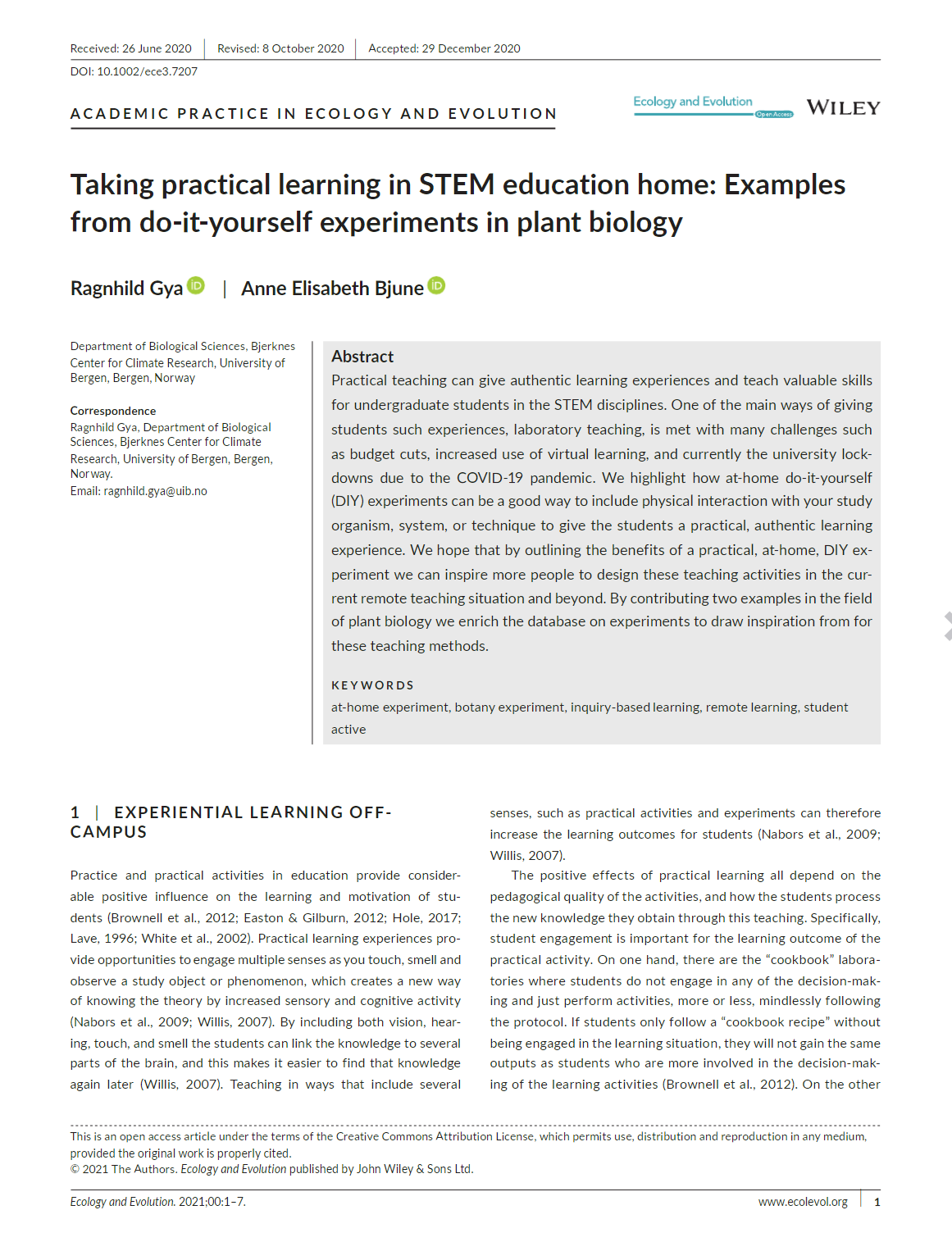
Practical teaching can give authentic learning experiences and teach valuable skills for undergraduate students in the STEM disciplines. One of the main ways of giving students such experiences, laboratory teaching, is met with many challenges such as budget cuts, increased use of virtual learning, and currently the university lockdowns due to the COVID‐19 pandemic. We highlight how at‐home do‐it‐yourself (DIY) experiments can be a good way to include physical interaction with your study organism, system, or technique to give the students a practical, authentic learning experience. We hope that by outlining the benefits of a practical, at‐home, DIY experiment we can inspire more people to design these teaching activities in the current remote teaching situation and beyond. By contributing two examples in the field of plant biology we enrich the database on experiments to draw inspiration from for these teaching methods.
Keywords: at-home experiment, botany experiment, inquiry-based learning, remote learning, student active
Reference and link to the article
Gya, R, Bjune, AE. Taking practical learning in STEM education home: Examples from do‐it‐yourself experiments in plant biology. Ecol Evol. 2021; 00: 1– 7. https://doi.org/10.1002/ece3.7207
Abstract
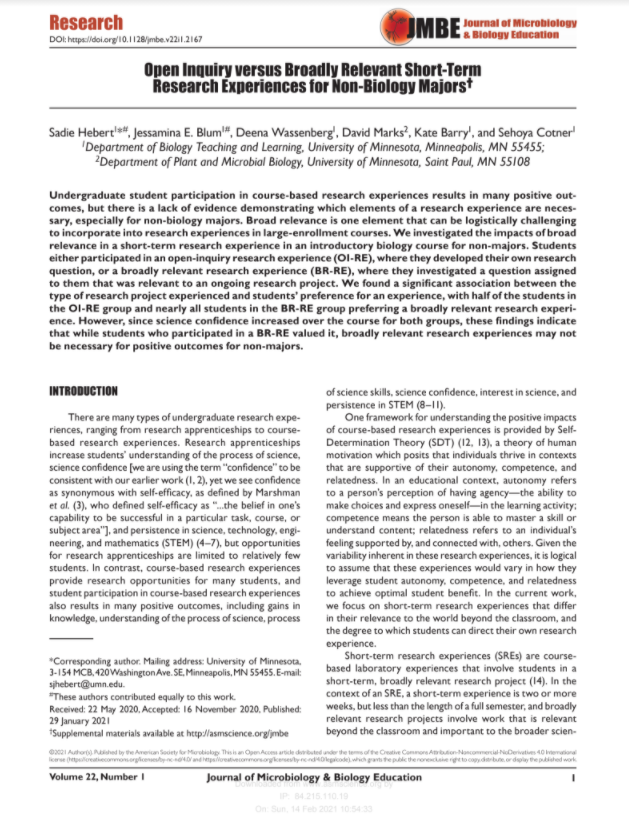
Undergraduate student participation in course-based research experiences results in many positive outcomes, but there is a lack of evidence demonstrating which elements of a research experience are necessary, especially for non-biology majors. Broad relevance is one element that can be logistically challenging to incorporate into research experiences in large-enrollment courses. We investigated the impacts of broad relevance in a short-term research experience in an introductory biology course for non-majors. Students either participated in an open-inquiry research experience (OI-RE), where they developed their own research question, or a broadly relevant research experience (BR-RE), where they investigated a question assigned to them that was relevant to an ongoing research project. We found a significant association between the type of research project experienced and students’ preference for an experience, with half of the students in the OI-RE group and nearly all students in the BR-RE group preferring a broadly relevant research experience. However, since science confidence increased over the course for both groups, these findings indicate that while students who participated in a BR-RE valued it, broadly relevant research experiences may not be necessary for positive outcomes for non-majors.
Reference and link to the article
Hebert S, Blum J, Wassenberg D, Marks D, Barry K, Cotner S. 2021. Open inquiry versus broadly relevant short-term research experiences for non-biology majors†. J. Microbiol. Biol. Educ. 22(1): doi:10.1128/jmbe.v22i1.2167
Abstract
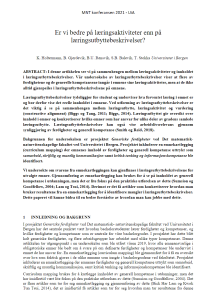
I denne artikkelen ser vi på sammenhengen mellom læringsaktiviteter og innholdeti læringsutbyttebeskrivelser. Vår undersøkelse av læringsutbyttebeskrivelser viser at flere avferdighetene og de generelle kompetansene inngår i emnene sine læringsaktiviteter, men at de ikkealltid gjenspeiles i læringsutbyttebeskrivelsene på emnene.Læringsutbyttebeskrivelser tydeliggjør for student og underviser hva forventet læring i emnet er og bør derfor vise det reelle innholdet i emnene. Ved utforming av læringsutbyttebeskrivelser er det viktig å se på sammenhengen mellom læringsutbytte, læringsaktivitet og vurdering(constructive alignment) (Biggs og Tang, 2011; Biggs, 2014). Læringsutbyttet gir oversikt overinnhold i emner og konkretiserer hvilke emner som har ansvar for ulike deler av gradens samledelæringsutbytte. Læringsutbyttebeskrivelser kan også vise arbeidslivsrelevans gjennomsynliggjøring av ferdigheter og generell kompetanse (Smith og Reid, 2018).Bakgrunnen for undersøkelsen er prosjektetGeneriske ferdigheterved Det matematisk- naturvitenskapelige fakultet ved Universitetet i Bergen. Prosjektet inkluderer en emnekartlegging(curriculum mapping) der emnenes innhold av ferdigheter og generell kompetanse uttrykt somsamarbeid, skriftlig og muntlig kommunikasjon samtkritisk tenking og informasjonskompetanse bleidentifisert. Vi undersøkte om svarene fra emnekartleggingen kan gjenfinnes i læringsutbyttebekrivelsene for utvalgte emner. Gjennomføring av emnekartlegging kan brukes for å se på innholdet av generell kompetanse i utdanningen, men det er lite fokus på den praktiske utførelsen av dette (Sumsion og Goodfellow, 2004; Lam og Tsui, 2014). Derimot er det få artikler som konkretiserer hvordan man bruker resultatene fra en emnekartlegging for å identifisere mangler i læringsutbyttebeskrivelser. Dette paperet vil kunne bidra til en bedre forståelse av hvordan man kan jobbe med dette..
Reference and link to the article
Holtermann K, Gjerdevik B., Rensvik B U, Balevik S B and Stokka T. 2021. Er vi bedre på læringsaktiviteter enn på læringsutbyttebeskrivelser – MNT-konferansen 2021 https://doi.org/10.5324/njsteme.v5i1.3913
Abstract
The main aim of this study is to test the validity of the Motivation, Engagement, and Thriving in User Experience (METUX) model (Peters, Calvo, & Ryan, 2018) in higher education. We propose a process model in which we investigate how the need-satisfaction of digital learning tools within the interface sphere and task sphere accounts for engagement, learning, and well-being. A total of 426 higher education students drawn from two subsamples participated in this cross-sectional study. A structural equation model shows that interface autonomy and competence satisfaction positively predict task autonomy and competence. Task competence, in turn, negatively predicts focused attention and positively perceived usability and well-being. Task autonomy positively predicts perceived usability and reward. Based on our results, we provide some initial support for the METUX model in higher education. However, more validation work is needed to improve the scale that measures need-satisfaction in the interface and task spheres. Moreover, we find no support for the effect of task sphere on learning. Further investigations are needed into how METUX can be used in domain- and situation-specific contexts to account for increases in engagement, learning, and well-being. Finally, future studies need to include all aspects of the METUX model in order to fully test its validity.
Keywords: Higher education, Self-determination theory, METUX, Achievement, Technology
Reference and link to the article
Jeno LM, Diseth Å and Grytnes J-A (2021) Testing the METUX Model in Higher Education: Interface and Task Need–Satisfaction Predict Engagement, Learning, and Well-Being. Front. Psychol. 12:631564. doi: 10.3389/fpsyg.2021.631564
Abstract
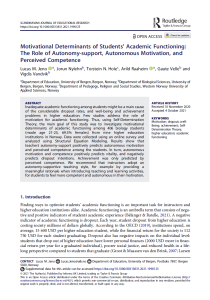 Inadequate academic functioning among students might be a main cause of the considerable dropout rates, and well-being and achievement problems in higher education. Few studies address the role of motivation for academic functioning. Thus, using Self-Determination Theory, the main goal of this study was to investigate motivational determinants of academic functioning among 406 biology students (mode age 21-25, 69.5% females) from nine higher education institutions in Norway. Data were collected using an online survey and analyzed using Structural Equation Modeling. Results show that teacherś autonomy-support positively predicts autonomous motivation and perceived competence among the students. In turn, autonomous motivation and competence positively predicts vitality, and negatively predicts dropout intentions. Achievement was only predicted by perceived competence. We recommend that instructors adopt an autonomy-supportive teaching style, for example by providing a meaningful rationale when introducing teaching and learning activities, for students to feel more competent and autonomous in their motivation.
Inadequate academic functioning among students might be a main cause of the considerable dropout rates, and well-being and achievement problems in higher education. Few studies address the role of motivation for academic functioning. Thus, using Self-Determination Theory, the main goal of this study was to investigate motivational determinants of academic functioning among 406 biology students (mode age 21-25, 69.5% females) from nine higher education institutions in Norway. Data were collected using an online survey and analyzed using Structural Equation Modeling. Results show that teacherś autonomy-support positively predicts autonomous motivation and perceived competence among the students. In turn, autonomous motivation and competence positively predicts vitality, and negatively predicts dropout intentions. Achievement was only predicted by perceived competence. We recommend that instructors adopt an autonomy-supportive teaching style, for example by providing a meaningful rationale when introducing teaching and learning activities, for students to feel more competent and autonomous in their motivation.
Keywords: Motivation; dropout; well-Being; achievement; Self-Determination Theory; higher education; academic functioning
Reference and link to the article
Lucas M. Jeno, Jorun Nylehn, Torstein N. Hole, Arild Raaheim, Gaute Velle & Vigdis Vandvik (2021): Motivational Determinants of Students’ Academic Functioning: The Role of Autonomy-support, Autonomous Motivation, and Perceived Competence, Scandinavian Journal of Educational Research, DOI: 10.1080/00313831.2021.1990125
Abstract
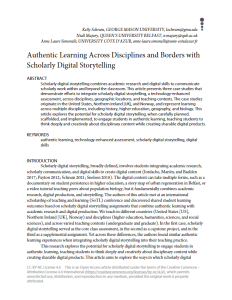 Scholarly digital storytelling combines academic research and digital skills to communicate scholarly work within and beyond the classroom. This article presents three case studies that demonstrate efforts to integrate scholarly digital storytelling, a technology-enhanced assessment, across disciplines, geographic locations, and teaching contexts. The case studies originate in the United States, Northern Ireland [UK], and Norway, and represent learning across multiple disciplines, including history, higher education, geography, and biology. This article explores the potential for scholarly digital storytelling, when carefully planned, scaffolded, and implemented, to engage students in authentic learning, teaching students to think deeply and creatively about disciplinary content while creating sharable digital products.
Scholarly digital storytelling combines academic research and digital skills to communicate scholarly work within and beyond the classroom. This article presents three case studies that demonstrate efforts to integrate scholarly digital storytelling, a technology-enhanced assessment, across disciplines, geographic locations, and teaching contexts. The case studies originate in the United States, Northern Ireland [UK], and Norway, and represent learning across multiple disciplines, including history, higher education, geography, and biology. This article explores the potential for scholarly digital storytelling, when carefully planned, scaffolded, and implemented, to engage students in authentic learning, teaching students to think deeply and creatively about disciplinary content while creating sharable digital products.
Keywords: authentic learning, technology-enhanced assessment, scholarly digital storytelling, digital skills
Reference and link to the article
Schrum, Kelly, Niall Majury, and Anne Laure Simonelli. 2021. “Authentic Learning Across Disciplines and Borders With Scholarly Digital Storytelling”. Teaching and Learning Inquiry 9 (2). https://doi.org/10.20343/teachlearninqu.9.2.8
Abstract
Inquiry-based laboratory activities, as a part of science curricula, have been advocated to increase students’ learning outcomes and improve students’ learning experiences, but students sometimes struggle with open-inquiry activities. This study aims to investigate students’ perceptions of inquiry-based learning in a set of laboratory activities, specifically from a psychological (i.e., Self-Determination Theory) perspective. Students’ ratings of the level of inquiry in these activities indicate that students’ perceptions of inquiry align with the instructor-intended amount of inquiry in each exercise. Students’ written responses, explaining their ratings, indicate that students’ perceptions of the amount of inquiry in a given lab exercise relate to their feeling of freedom (or autonomy), competence, and relatedness (or support), during the inquiry-based learning activities. The results imply that instructors implementing inquiry-based learning activities should consider student motivation, and Self-Determination Theory can be a useful diagnostic tool during teaching development.
Keywords: inquiry-based learning, Self-Determination Theory (SDT), student perceptions, laboratory activities
Reference and link to the article
Zhao, FangFang, Gillian Roehrig, Lorelei Patrick, Chantal Levesque-Bristol, and Sehoya Cotner. 2021. “Using a Self-Determination Theory Approach to Understand Student Perceptions of Inquiry-Based Learning”. Teaching and Learning Inquiry 9 (2). doi: https://doi.org/10.20343/teachlearninqu.9.2.5
2020
Abstract
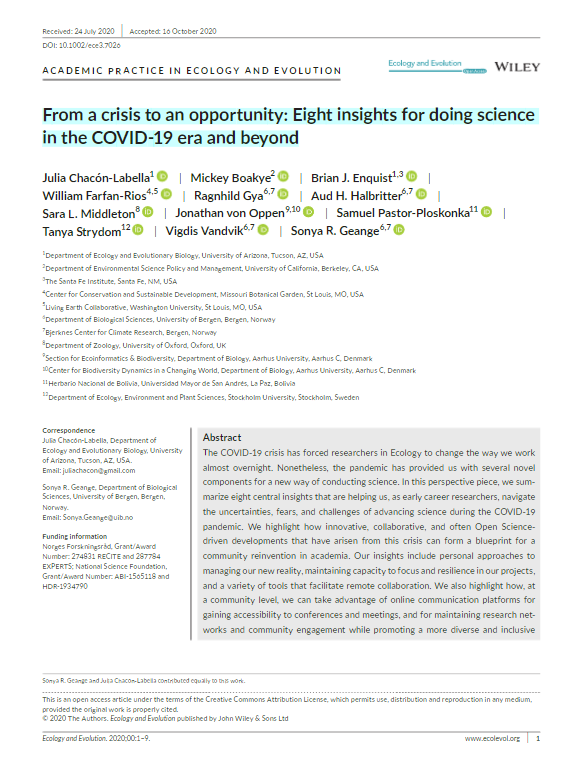
The COVID‐19 crisis has forced researchers in Ecology to change the way we work almost overnight. Nonetheless, the pandemic has provided us with several novel components for a new way of conducting science. In this perspective piece, we summarize eight central insights that are helping us, as early career researchers, navigate the uncertainties, fears, and challenges of advancing science during the COVID‐19 pandemic. We highlight how innovative, collaborative, and often Open Science‐driven developments that have arisen from this crisis can form a blueprint for a community reinvention in academia. Our insights include personal approaches to managing our new reality, maintaining capacity to focus and resilience in our projects, and a variety of tools that facilitate remote collaboration. We also highlight how, at a community level, we can take advantage of online communication platforms for gaining accessibility to conferences and meetings, and for maintaining research networks and community engagement while promoting a more diverse and inclusive community. Overall, we are confident that these practices can support a more inclusive and kinder scientific culture for the longer term.
Keywords: data sharing, early career, inclusivity, networking, online collaboration, skill development
Reference and link to the article
Chacón-Labella, J., Boakye, M., Enquist, B. J., Farfan-Rios, W., Gya, R., Halbritter, A. H., Middleton, S. L., von Oppen, J., Pastor-Ploskonka, S., Strydom, T., Vandvik, V., and Geange, S. R. (2020). From a crisis to an opportunity: Eight insights for doing science in the COVID-19 era and beyond. Ecology and Evolution. 2020;00:1–9. DOI: 10.1002/ece3.7026
Abstract
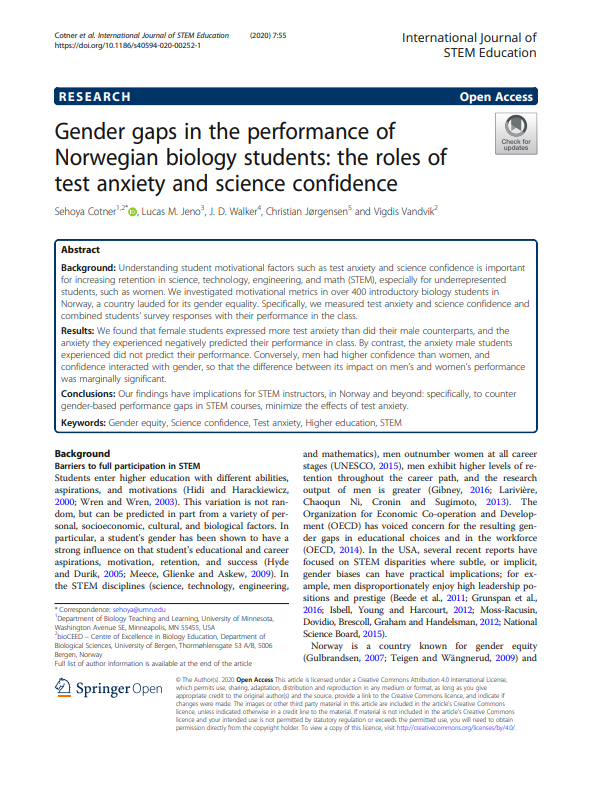
Background: understanding student motivational factors such as test anxiety and science confidence is important for increasing retention in science, technology, engineering, and math (STEM), especially for underrepresented students, such as women. We investigated motivational metrics in over 400 introductory biology students in Norway, a country lauded for its gender equality. Specifically, we measured test anxiety and science confidence and combined students’ survey responses with their performance in the class.
Results: we found that female students expressed more test anxiety than did their male counterparts, and the anxiety they experienced negatively predicted their performance in class. By contrast, the anxiety male students experienced did not predict their performance. Conversely, men had higher confidence than women, and confidence interacted with gender, so that the difference between its impact on men’s and women’s performance was marginally significant.
Conclusions: our findings have implications for STEM instructors, in Norway and beyond: specifically, to counter gender-based performance gaps in STEM courses, minimize the effects of test anxiety.
Keywords: Gender equity, Science confidence, Test anxiety, Higher education, STEM
Reference and link to the article
Cotner, S., Jeno, L.M., Walker, J.D. et al. Gender gaps in the performance of Norwegian biology students: the roles of test anxiety and science confidence. IJ STEM Ed 7, 55 (2020). https://doi.org/10.1186/s40594-020-00252-1
Abstract
Being trapped in Peru as countries went into lockdown showed us just how little support is available to researchers working abroad, a group of biologists writes
Reference and link to the article
Cotner, S, et al. 2020. International scientists need better support during global emergencies. https://www.timeshighereducation.com/blog/international-scientists-need-better-support-during-global-emergencies
Abstract
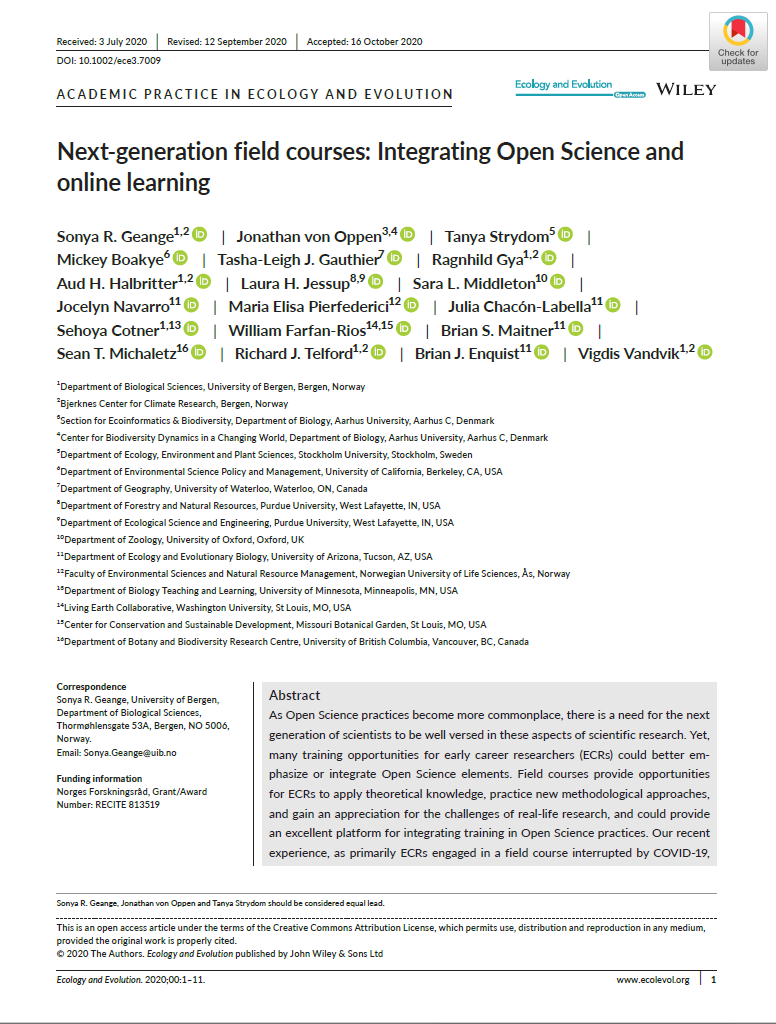
As Open Science practices become more commonplace, there is a need for the next generation of scientists to be well versed in these aspects of scientific research. Yet, many training opportunities for early career researchers (ECRs) could better emphasize or integrate Open Science elements. Field courses provide opportunities for ECRs to apply theoretical knowledge, practice new methodological approaches, and gain an appreciation for the challenges of real‐life research, and could provide an excellent platform for integrating training in Open Science practices. Our recent experience, as primarily ECRs engaged in a field course interrupted by COVID‐19, led us to reflect on the potential to enhance learning outcomes in field courses by integrating Open Science practices and online learning components. Specifically, we highlight the opportunity for field courses to align teaching activities with the recent developments and trends in how we conduct research, including training in: publishing registered reports, collecting data using standardized methods, adopting high‐quality data documentation, managing data through reproducible workflows, and sharing and publishing data through appropriate channels. We also discuss how field courses can use online tools to optimize time in the field, develop open access resources, and cultivate collaborations. By integrating these elements, we suggest that the next generation of field courses will offer excellent arenas for participants to adopt Open Science practices.
Keywords: career development, early career researchers, FAIR principles, higher education, pedagogy, reproducible research
Reference and link to the article
Geange SR, von Oppen J, Strydom T, et al. Next-generation field courses: Integrating Open Science and online learning. Ecol Evol. 2020;00:1–11. https://doi.org/10.1002/ece3.7009
Abstract
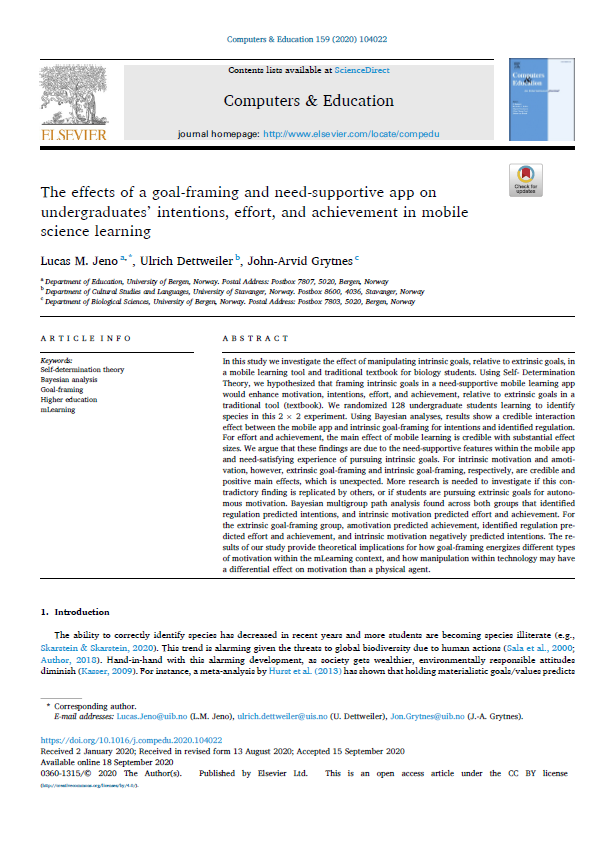
In this study we investigate the effect of manipulating intrinsic goals, relative to extrinsic goals, in a mobile learning tool and traditional textbook for biology students. Using Self- Determination Theory, we hypothesized that framing intrinsic goals in a need-supportive mobile learning app would enhance motivation, intentions, effort, and achievement, relative to extrinsic goals in a traditional tool (textbook). We randomized 128 undergraduate students learning to identify species in this 2 × 2 experiment. Using Bayesian analyses, results show a credible interaction effect between the mobile app and intrinsic goal-framing for intentions and identified regulation. For effort and achievement, the main effect of mobile learning is credible with substantial effect sizes. We argue that these findings are due to the need-supportive features within the mobile app and need-satisfying experience of pursuing intrinsic goals. For intrinsic motivation and amotivation, however, extrinsic goal-framing and intrinsic goal-framing, respectively, are credible and positive main effects, which is unexpected. More research is needed to investigate if this contradictory finding is replicated by others, or if students are pursuing extrinsic goals for autonomous motivation. Bayesian multigroup path analysis found across both groups that identified regulation predicted intentions, and intrinsic motivation predicted effort and achievement. For the extrinsic goal-framing group, amotivation predicted achievement, identified regulation predicted effort and achievement, and intrinsic motivation negatively predicted intentions. The results of our study provide theoretical implications for how goal-framing energizes different types of motivation within the mLearning context, and how manipulation within technology may have a differential effect on motivation than a physical agent.
Keywords: Self-determination theory, Bayesian analysis, Goal-framing, Higher education, mLearning
Reference and link to the articleJeno, L. M., Dettweiler, U. and Grytnes, J.-A. (2020). The effects of a goal-framing and need-supportive app on undergraduates’ intentions, effort, and achievement in mobile science learning. Computers & Education 159 (2020) 104022 https://doi.org/10.1016/j.compedu.2020.104022
Abstract
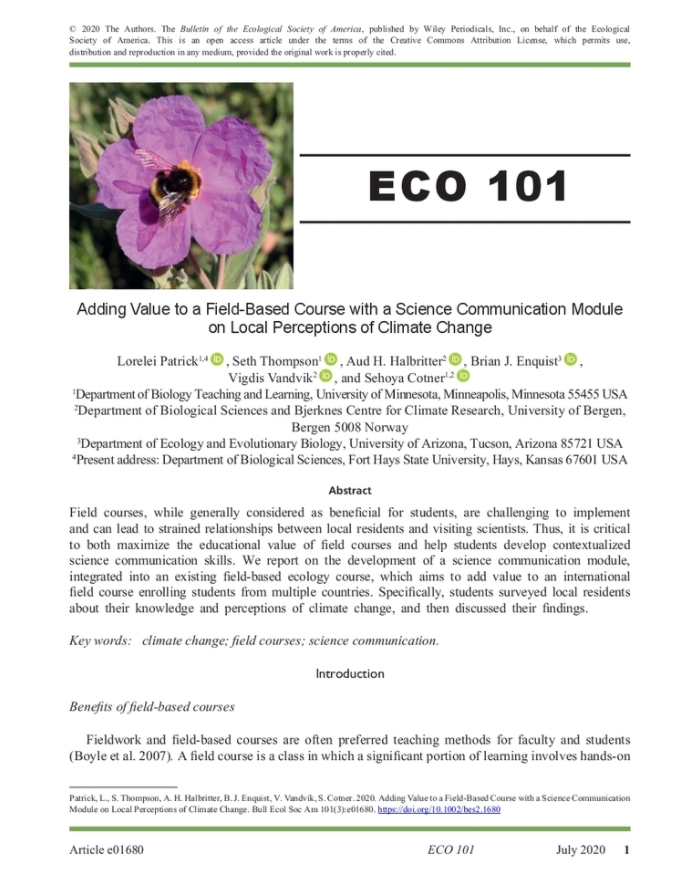
Field courses, while generally considered as beneficial for students, are challenging to implement and can lead to strained relationships between local residents and visiting scientists. Thus, it is critical to both maximize the educational value of field courses and help students develop contextualized science communication skills. We report on the development of a science communication module, integrated into an existing field-based ecology course, which aims to add value to an international field course enrolling students from multiple countries. Specifically, students surveyed local residents about their knowledge and perceptions of climate change, and then discussed their findings.
Keywords: climate change, field courses, science communication.
Reference and link to the article
Patrick, L., S. Thompson, A. H. Halbritter, B. J. Enquist, V. Vandvik, S. Cotner. 2020. Adding Value to a Field-Based Course with a Science Communication Module on Local Perceptions of Climate Change. Bull Ecol Soc Am 101(3):e01680. https://doi.org/10.1002/bes2.1680
Abstract
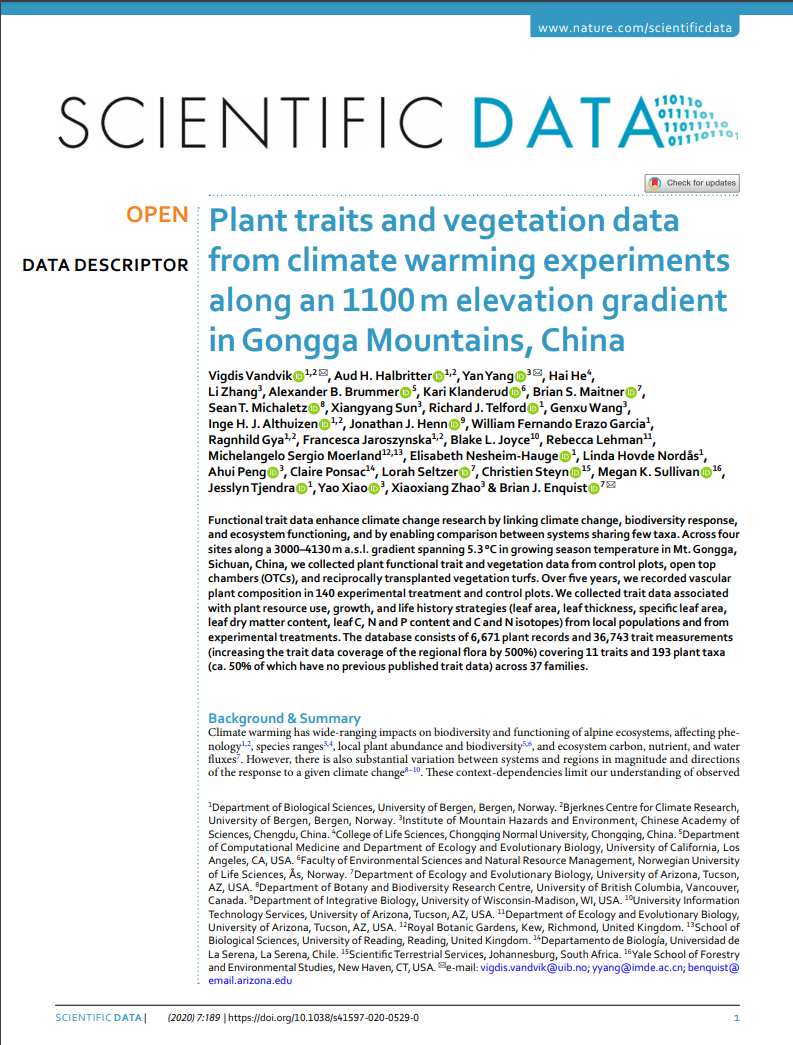
Functional trait data enhance climate change research by linking climate change, biodiversity response, and ecosystem functioning, and by enabling comparison between systems sharing few taxa. Across four sites along a 3000–4130m a.s.l. gradient spanning 5.3°C in growing season temperature in Mt. Gongga, Sichuan, China, we collected plant functional trait and vegetation data from control plots, open top chambers (OTCs), and reciprocally transplanted vegetation turfs. Over fve years, we recorded vascular plant composition in 140 experimental treatment and control plots. We collected trait data associated with plant resource use, growth, and life history strategies (leaf area, leaf thickness, specifc leaf area, leaf dry matter content, leaf C, N and P content and C and N isotopes) from local populations and from experimental treatments. The database consists of 6,671 plant records and 36,743 trait measurements (increasing the trait data coverage of the regional fora by 500%) covering 11 traits and 193 plant taxa (ca. 50% of which have no previous published trait data) across 37 families.
Keywords: climate-change ecology, community ecology, natural variation in plants.
Reference and link to the article
Vandvik, V., Halbritter, A.H., Yang, Y. et al. Plant traits and vegetation data from climate warming experiments along an 1100 m elevation gradient in Gongga Mountains, China. Sci Data 7, 189 (2020). https://doi.org/10.1038/s41597-020-0529-0
2019
This year’s MNT-konferansen “Transformative education” took place in Tromsø, Hotel Soria Moria on March 28th-29st. bioCEED contributed with 3 articles and corresponding presentations as well as an overview of the goals and activities of the Centre of Excellence.
- Use of Active Learning Methods and Technologies – Obstacles, Incentives, and Bottlenecks, by Katja Enberg, Ståle Ellingsen and Ida Helene Steen
- Learning by doing and reflection: the redesign of an alpine ecology field course, by Ragnhild Gya, Siri V Haugum, Franscesca Jaroszynska and Jorun Nylehn
- Learning Outcomes at Master Level in Biology. Current Expectations and Guidelines for the Future, by Selina Våge, Aina-Cathrine Øvergård, Mariann Eilertsen, Florian Berg and Jorun Nylehn
The articles are available here.
Abstract
 As science, technology, engineering, and mathematics (STEM) classrooms in higher education transition from lecturing to active learning, the frequency of student interactions in class increases. Previous research documents a gender bias in participation, with women participating less than would be expected on the basis of their numeric proportions. In the present study, we asked which attributes of the learning environment contribute to decreased female participation: the abundance of in-class interactions, the diversity of interactions, the proportion of women in class, the instructor’s gender, the class size, and whether the course targeted lower division (first and second year) or upper division (third or fourth year) students. We calculated likelihood ratios of female participation from over 5300 student–instructor interactions observed across multiple institutions. We falsified several alternative hypotheses and demonstrate that increasing class size has the largest negative effect. We also found that when the instructors used a diverse range of teaching strategies, the women were more likely to participate after small-group discussions.
As science, technology, engineering, and mathematics (STEM) classrooms in higher education transition from lecturing to active learning, the frequency of student interactions in class increases. Previous research documents a gender bias in participation, with women participating less than would be expected on the basis of their numeric proportions. In the present study, we asked which attributes of the learning environment contribute to decreased female participation: the abundance of in-class interactions, the diversity of interactions, the proportion of women in class, the instructor’s gender, the class size, and whether the course targeted lower division (first and second year) or upper division (third or fourth year) students. We calculated likelihood ratios of female participation from over 5300 student–instructor interactions observed across multiple institutions. We falsified several alternative hypotheses and demonstrate that increasing class size has the largest negative effect. We also found that when the instructors used a diverse range of teaching strategies, the women were more likely to participate after small-group discussions.
Reference and link to the article
Cissy J Ballen, Stepfanie M Aguillon, Azza Awwad, Anne E Bjune, Daniel Challou, Abby Grace Drake, Michelle Driessen, Aziza Ellozy, Vivian E Ferry, Emma E Goldberg, William Harcombe, Steve Jensen, Christian Jørgensen, Zoe Koth, Suzanne McGaugh, Caroline Mitry, Bryan Mosher, Hoda Mostafa, Renee H Petipas, Paula A G Soneral, Shana Watters, Deena Wassenberg, Stacey L Weiss, Azariah Yonas, Kelly R Zamudio, Sehoya Cotner, Smaller Classes Promote Equitable Student Participation in STEM, BioScience, Volume 69, Issue 8, August 2019, Pages 669–680, https://doi.org/10.1093/biosci/biz069
Abstract
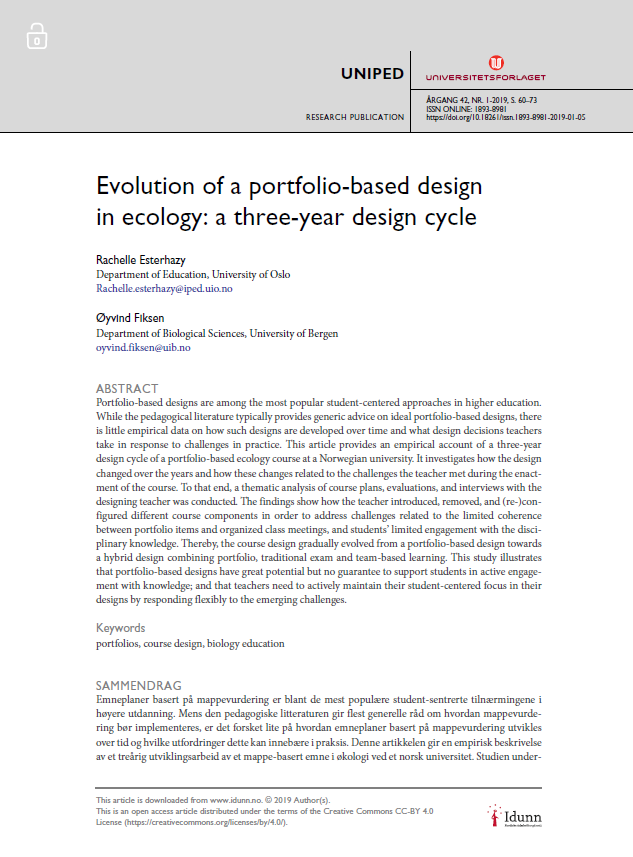
Portfolio-based designs are among the most popular student-centered approaches in higher education. While the pedagogical literature typically provides generic advice on ideal portfolio-based designs, there is little empirical data on how such designs are developed over time and what design decisions teachers take in response to challenges in practice. This article provides an empirical account of a three-year design cycle of a portfolio-based ecology course at a Norwegian university. It investigates how the design changed over the years and how these changes related to the challenges the teacher met during the enactment of the course. To that end, a thematic analysis of course plans, evaluations, and interviews with the designing teacher was conducted. The findings show how the teacher introduced, removed, and (re-)configured different course components in order to address challenges related to the limited coherence between portfolio items and organized class meetings, and students’ limited engagement with the disciplinary knowledge. Thereby, the course design gradually evolved from a portfolio-based design towards a hybrid design combining portfolio, traditional exam and team-based learning. This study illustrates that portfolio-based designs have great potential but no guarantee to support students in active engagement with knowledge; and that teachers need to actively maintain their student-centered focus in their designs by responding flexibly to the emerging challenges.
Keywords: portfolios, course design, biology education
Reference and link to the article
Esterhazy, R. and Fiksen, Ø. (2019). Evolution of a portfolio-based design in ecology: a three-year design cycle. Uniped, 01/2019 (volum 42) https://doi.org/10.18261/issn.1893-8981-2019-01-05
Abstract
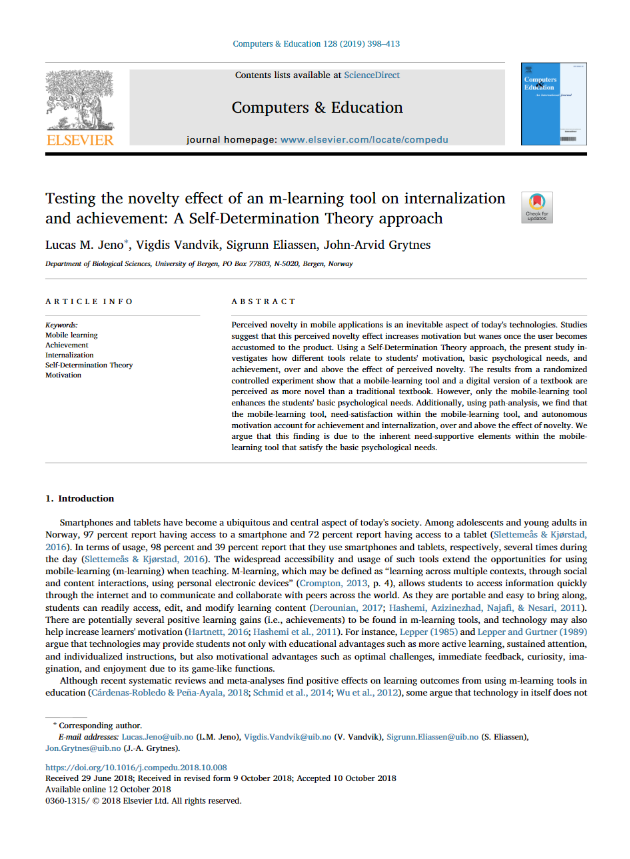
Perceived novelty in mobile applications is an inevitable aspect of today’s technologies. Studies suggest that this perceived novelty effect increases motivation but wanes once the user becomes accustomed to the product. Using a Self-Determination Theory approach, the present study investigates how different tools relate to students’ motivation, basic psychological needs, and achievement, over and above the effect of perceived novelty. The results from a randomized controlled experiment show that a mobile-learning tool and a digital version of a textbook are perceived as more novel than a traditional textbook. However, only the mobile-learning tool enhances the students’ basic psychological needs. Additionally, using path-analysis, we find that the mobile-learning tool, need-satisfaction within the mobile-learning tool, and autonomous motivation account for achievement and internalization, over and above the effect of novelty. We argue that this finding is due to the inherent need-supportive elements within the mobile-learning tool that satisfy the basic psychological needs.
Reference and link to the article
Jeno L.M., Vandvik V., Eliassen S. & Grytnes J.-A. Testing the novelty effect of an m-learning tool on internalization and achievement: A Self-Determination Theory approach, Computers & Education (2019), doi: https://doi.org/10.1016/j.compedu.2018.10.008
Abstract
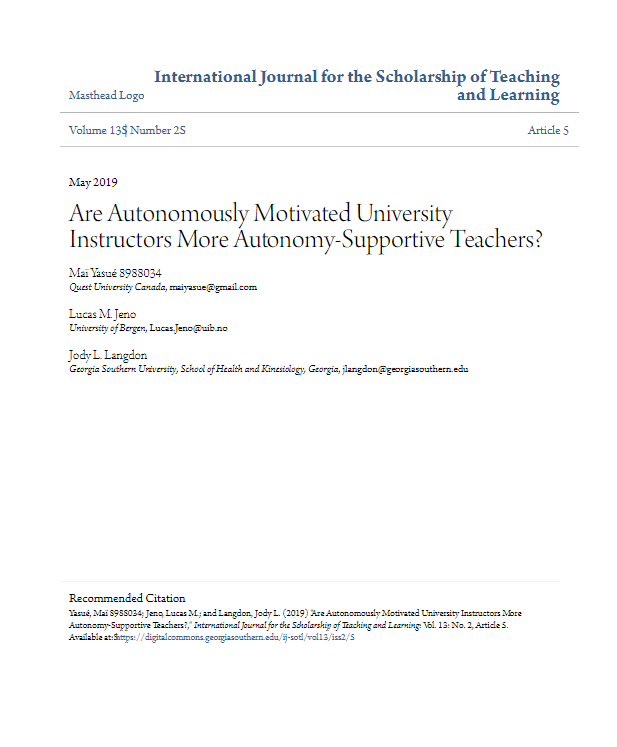
We extended the research on autonomy-supportive teaching to universities and examined the relationships between autonomous motivation to teach and autonomy-supportive teaching. Autonomously motivated university instructors were more autonomy-supportive instructors. The freedom to make pedagogical decisions was negatively correlated with external motivation towards teaching. Participants indicated that large class sizes, high teaching loads, publication pressures, and a culture that undervalues effective undergraduate teaching undermined both student learning and their feelings of autonomy. Together these results present a picture of a subset of university instructors who remained autonomously motivated to teach, irrespective of barriers they experienced from university administrators or policies.
Reference and link to the article
Yasué, Maï, Jeno, Lucas M., and Langdon, Jody L. (2019) "Are Autonomously Motivated University Instructors More Autonomy-Supportive Teachers?," International Journal for the Scholarship of Teaching and Learning: Vol. 13: No. 2, Article 5.
Available at: https://digitalcommons.georgiasouthern.edu/ij-sotl/vol13/iss2/5
2018
Abstract
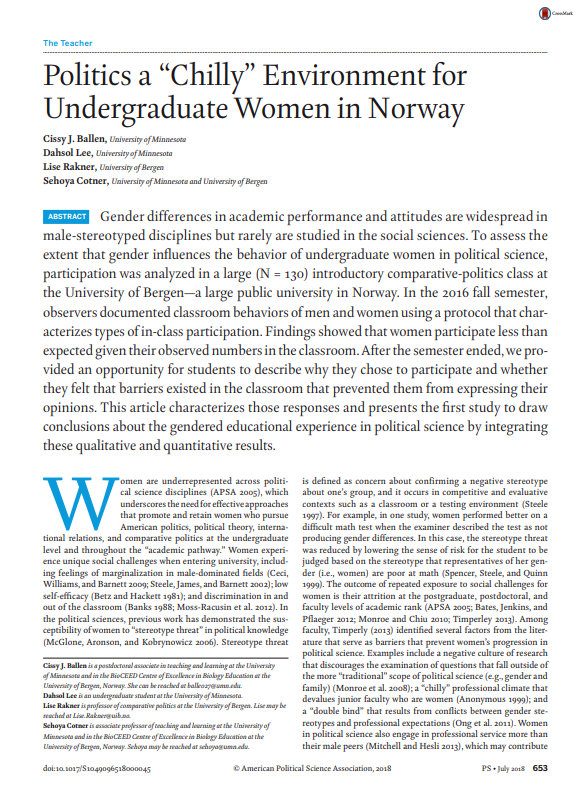
Gender differences in academic performance and attitudes are widespread in male-stereotyped disciplines but rarely are studied in the social sciences. To assess the extent that gender influences the behavior of undergraduate women in political science, participation was analyzed in a large (N = 130) introductory comparative-politics class at the University of Bergen—a large public university in Norway. In the 2016 fall semester, observers documented classroom behaviors of men and women using a protocol that characterizes types of in-class participation. Findings showed that women participate less than expected given their observed numbers in the classroom. After the semester ended, we provided an opportunity for students to describe why they chose to participate and whether they felt that barriers existed in the classroom that prevented them from expressing their opinions. This article characterizes those responses and presents the first study to draw conclusions about the gendered educational experience in political science by integrating these qualitative and quantitative results.
Reference and link to the article
Ballen, Cissy J.; Lee, Dahsol; Rakner, Lise; Cotner, Sehoya Harris Politics a “Chilly” Environment for Undergraduate Women in Norway. PS: Political Science and Politics 2018 (1049-0965) Vol. 51 (3), s.653-658. DOI: https://doi.org/10.1017/S1049096518000045
Abstract
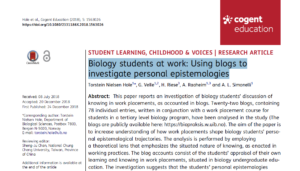
This paper reports an investigation of biology students’ discussion of knowing in work placements, as accounted in blogs. Twenty-two blogs, containing 78 individual entries, written in conjunction with a work placement course for students in a tertiary level biology program, have been analysed in the study (The blogs are publicly available here: https://biopraksis.w.uib.no). The aim of the paper is to increase understanding of how work placements shape biology students’ personal epistemological trajectories. The analysis is performed by employing a theoretical lens that emphasizes the situated nature of knowing, as enacted in working practices. The blog accounts consist of the students’ appraisal of their own learning and knowing in work placements, situated in biology undergraduate education. The investigation suggests that the students’ personal epistemologies develop in an interplay with context and personal epistemologies to shape their trajectories toward biology knowing. These trajectories have been analysed in terms of their procedural, conceptual, and dispositional dimensions. The use of blogs as a data source is argued to be appropriate to analyse personal epistemologies. Other strengths and weaknesses of this design are discussed.
Reference and link to the article
Hole, T. N., Velle, G., Riese, H., Raaheim, A., & Simonelli, A. L. (2018). Biology students at work: Using blogs to investigate personal epistemologies. Cogent Education, 5(1), 1563026. https://doi.org/10.1080/2331186X.2018.1563026
Abstract
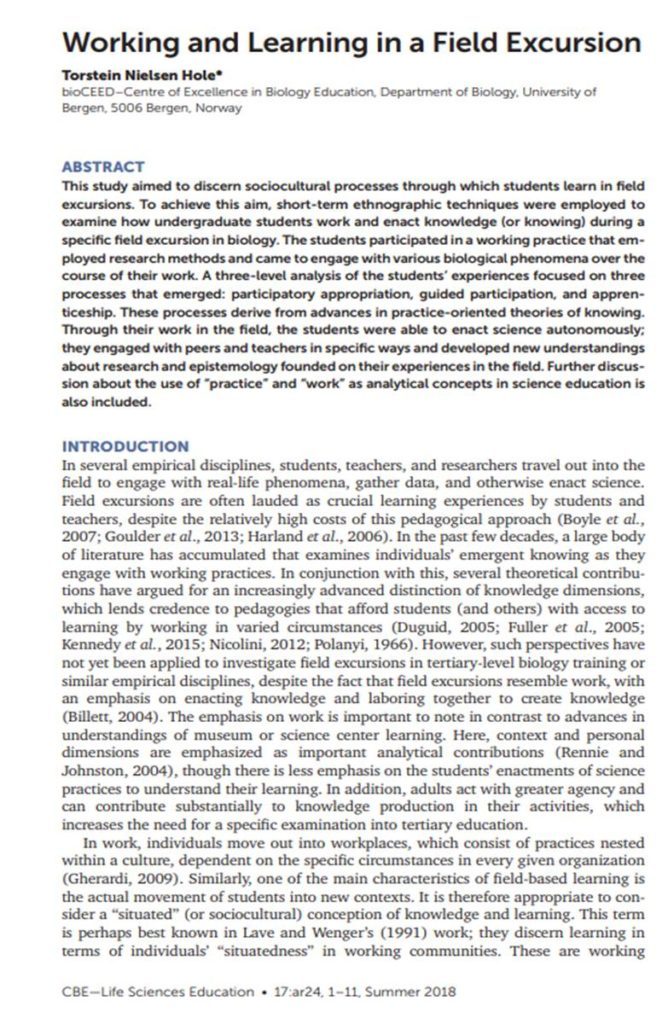 This study aimed to discern sociocultural processes through which students learn in field excursions. To achieve this aim, short-term ethnographic techniques were employed to examine how undergraduate students work and enact knowledge (or knowing) during a specific field excursion in biology. The students participated in a working practice that employed research methods and came to engage with various biological phenomena over the course of their work. A three-level analysis of the students` experiences focused on three processes that emerged: participatory appropriation, guided participation, and apprenticeship. These processes derive from advances in practice-oriented theories of knowing. Through their work in the field, the students were able to enact science autonomously; they engaged with peers and teachers in specific ways and developed new understandings about research and epistemology founded on their experiences in the field. Further discussion about the use of “practice” and “work” as analytical concepts in science education is also included.
This study aimed to discern sociocultural processes through which students learn in field excursions. To achieve this aim, short-term ethnographic techniques were employed to examine how undergraduate students work and enact knowledge (or knowing) during a specific field excursion in biology. The students participated in a working practice that employed research methods and came to engage with various biological phenomena over the course of their work. A three-level analysis of the students` experiences focused on three processes that emerged: participatory appropriation, guided participation, and apprenticeship. These processes derive from advances in practice-oriented theories of knowing. Through their work in the field, the students were able to enact science autonomously; they engaged with peers and teachers in specific ways and developed new understandings about research and epistemology founded on their experiences in the field. Further discussion about the use of “practice” and “work” as analytical concepts in science education is also included.
Reference and link to the article
Hole (2018). Working and Learning in a Field Excursion. CBE – Life Sciences Educational Vol 17, No 2 (2018), pp 1-11
Abstract
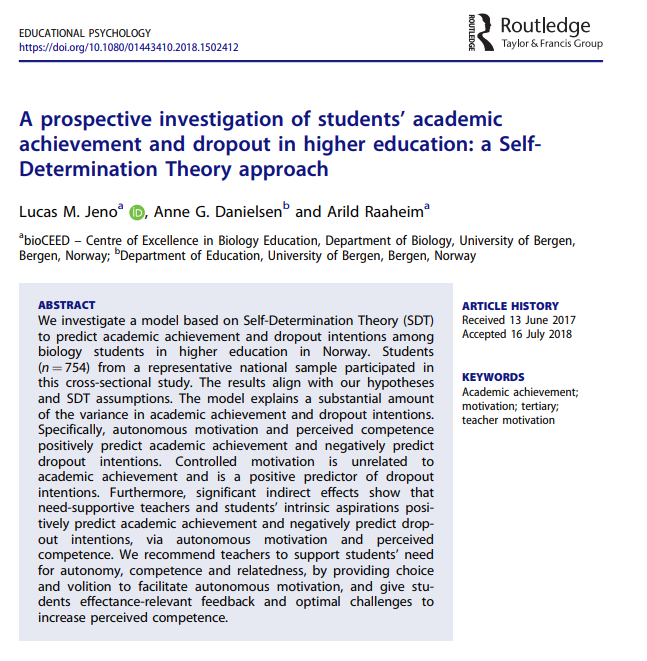
We investigate a model based on Self-Determination Theory (SDT) to predict academic achievement and dropout intentions among biology students in higher education in Norway. Students (n = 754) from a representative national sample participated in this cross-sectional study. The results align with our hypotheses and SDT assumptions. The model explains a substantial amount of the variance in academic achievement and dropout intentions. Specifically, autonomous motivation and perceived competence positively predict academic achievement and negatively predict dropout intentions. Controlled motivation is unrelated to academic achievement and is a positive predictor of dropout intentions. Furthermore, significant indirect effects show that need-supportive teachers and students’ intrinsic aspirations positively predict academic achievement and negatively predict dropout intentions, via autonomous motivation and perceived competence. We recommend teachers to support students’ need for autonomy, competence and relatedness, by providing choice and volition to facilitate autonomous motivation, and give students effectance-relevant feedback and optimal challenges to increase perceived competence.
Reference and link to the article
Lucas M. Jeno, Anne G. Danielsen & Arild Raaheim (2018) A prospective investigation of students’ academic achievement and dropout in higher education: a Self-Determination Theory approach, Educational Psychology, DOI: 10.1080/01443410.2018.1502412
Abstract
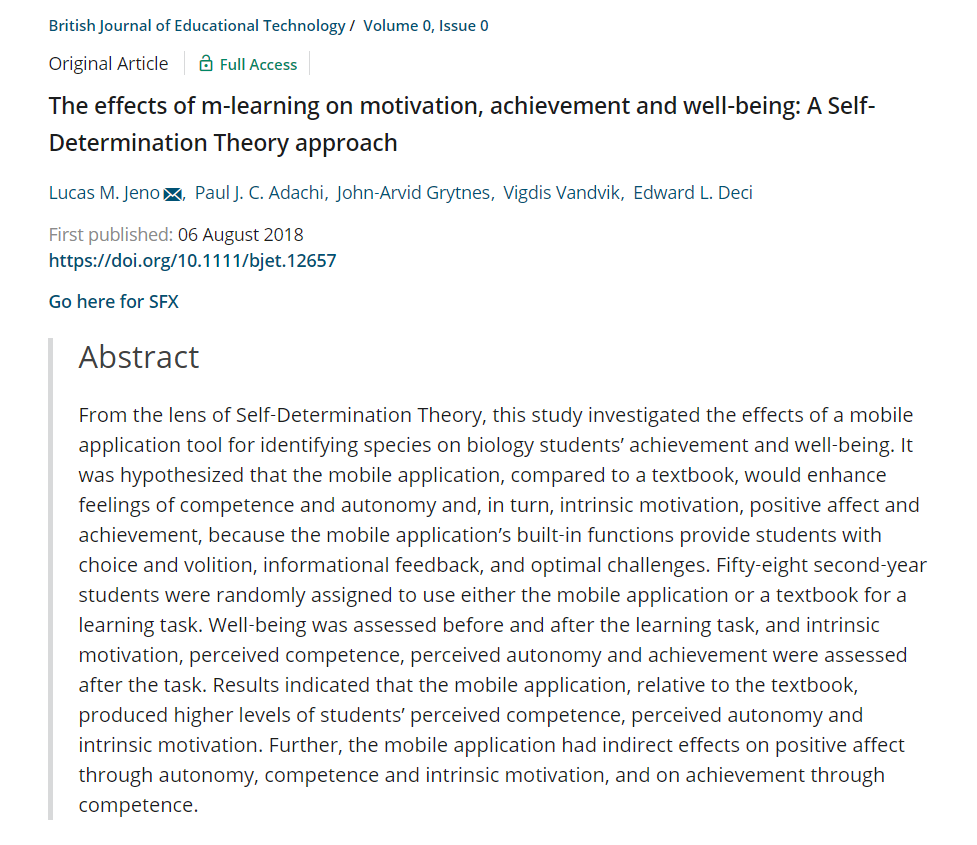 From the lens of Self‐Determination Theory, this study investigated the effects of a mobile application tool for identifying species on biology students’ achievement and well‐being. It was hypothesized that the mobile application, compared to a textbook, would enhance feelings of competence and autonomy and, in turn, intrinsic motivation, positive affect and achievement, because the mobile application’s built‐in functions provide students with choice and volition, informational feedback, and optimal challenges. Fifty‐eight second‐year students were randomly assigned to use either the mobile application or a textbook for a learning task. Well‐being was assessed before and after the learning task, and intrinsic motivation, perceived competence, perceived autonomy and achievement were assessed after the task. Results indicated that the mobile application, relative to the textbook, produced higher levels of students’ perceived competence, perceived autonomy and intrinsic motivation. Further, the mobile application had indirect effects on positive affect through autonomy, competence and intrinsic motivation, and on achievement through competence.
From the lens of Self‐Determination Theory, this study investigated the effects of a mobile application tool for identifying species on biology students’ achievement and well‐being. It was hypothesized that the mobile application, compared to a textbook, would enhance feelings of competence and autonomy and, in turn, intrinsic motivation, positive affect and achievement, because the mobile application’s built‐in functions provide students with choice and volition, informational feedback, and optimal challenges. Fifty‐eight second‐year students were randomly assigned to use either the mobile application or a textbook for a learning task. Well‐being was assessed before and after the learning task, and intrinsic motivation, perceived competence, perceived autonomy and achievement were assessed after the task. Results indicated that the mobile application, relative to the textbook, produced higher levels of students’ perceived competence, perceived autonomy and intrinsic motivation. Further, the mobile application had indirect effects on positive affect through autonomy, competence and intrinsic motivation, and on achievement through competence.
Reference and link to the article
Jeno, L. M., Adachi, P. J. C., Grytnes, J.-A., Vandvik, V., Deci, E. L. The effects of m‐learning on motivation, achievement and well‐being: A Self‐Determination Theory approach (2018). British journal of educational technology , 2018.
Abstract
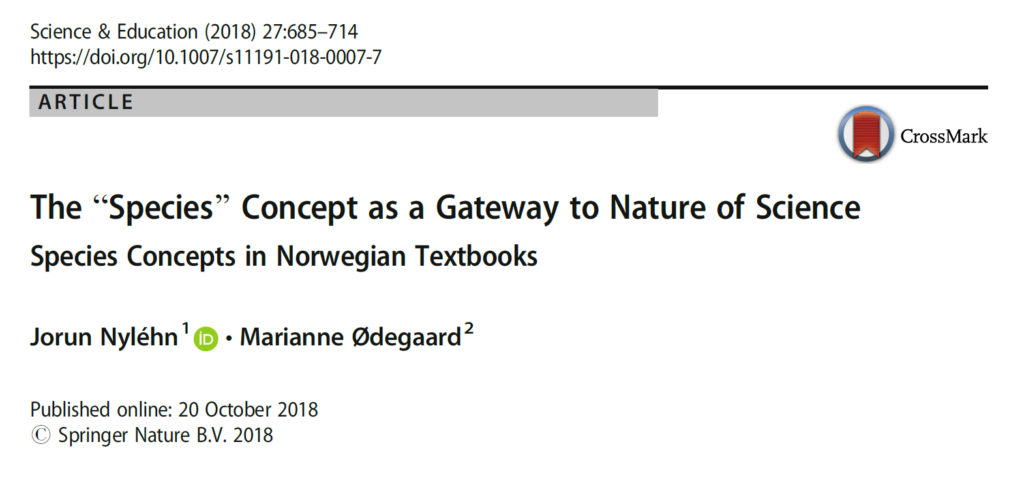
The nature of science (NOS) is a primary goal in school science. Most teachers are not well-prepared for teaching NOS, but a sophisticated and in-depth understanding of NOS is necessary for effective teaching. Some authors emphasize the need for teaching NOS in context. Species, a central concept in biology, is proposed in this article as a concrete example of a means for achieving increased understanding of NOS. Although species are commonly presented in textbooks as fixed entities with a single definition, the concept of species is a highly discussed one in the science and the philosophy of biology. A multitude of species concepts exist, reflecting both the views and interests of researchers and their utility in different organism groups. The present study serves to address the following questions: How do textbooks in Norwegian primary and lower secondary schools present the concept of species? Can inquiries into the concept of “species” serve to highlight aspects of NOS? A review of the available literature on species and species concepts in school is also performed. In the schoolbooks, the biological species concept is commonly used as the main definition, whereas the morphological species concept is represented by additional remarks of similarity. The potential and pitfalls of using the species concept for teaching NOS are discussed, with NOS being discussed both as a family resemblance concept and as a consensus list. Teacher education is proposed as a starting point for inducing a more sophisticated view of biology into schools.
Reference and link to the article
Nyléhn, J., & Ødegaard, M. (2018). The “Species” Concept as a Gateway to Nature of Science. Species Concepts in Norwegian Textbooks. Science & Education, 27(7-8), 685-714. doi: https://doi.org/10.1007/s11191-018-0007-7
2017
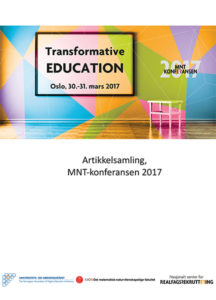 Korleis få professorar med på ein kollegial SoTL-kultur? – R. Andersson, P. B. Eidesen, Ø. Fiksen, O. Førland, S. Stefansson og V. Vandvik.
Korleis få professorar med på ein kollegial SoTL-kultur? – R. Andersson, P. B. Eidesen, Ø. Fiksen, O. Førland, S. Stefansson og V. Vandvik.- Collegial evaluation of writing as a learning activity in a bachelor programme – Heidi Lie Andersen, Øyvind Fiksen, Lawrence Kirkendall, Sigurd Stefansson.
- Strategies to document active learning practices in biology – Sehoya Cotner, Lucas M Jeno, Cissy Ballen.
- Utnytter vi potensialet for læring og personlig utvikling i feltundervisning? – P. B. Eidesen, A. Vader og J. E. Søreide.
- Hvordan teknologi bidrar til biologi-studenters motivasjon og læring – L. M. Jeno, J.A. Grytnes og Vigdis Vandvik.
- Developing work placements in a discipline education – G. Velle and T. Nielsen Hole.
- Numerical competence and quantitative skills in biology education – S. Eliassen, J. Kolding, J. Smedmark, and V. Vandvik.
- Sense and sensibility in workload calculation – Jonathan Soulé, Oddfrid Førland, and Tina Dahl.
- Norway’s gender gap: classroom participation in undergraduate introductory science – Cissy Ballen, Marie Danielsen, Christian Jørgensen, John-Arvid Grytnes, and Sehoya Cotner.
- Kan integrering i fagmiljøet øke motivasjon hos studenter? R. Gya og M. V. Bjordal.
- bioCEED – Senter for fremragende utdanning i biologi
This year’s EuroSoTL Conference “Transforming patterns through the scholarship of teaching and learning” took place at the Faculty of Engineering Campus at Lund University June 8th-9th. bioCEED contributed with 5 articles and corresponding presentations.
- Testing the impact of active learning in first year undergraduate natural science courses. A. E. Bjune, B. Grung, B. Holst, L. C. Olsen
- Active learning and course alignment in thematically complex courses. C. Borstad, M. Forchhammer, and T. M. Gabrielsen
- Are learning outcomes affected by course intensity and workload? B. Damsgård, E. Strømseng & Ø. Varpe
- Exams as learning arena: A criterion-based system for justified marking, student feedback, and enhanced constructive alignment. C. Jørgensen, A. Goksøyr, K. L. Hjelle, and H. Linge
- How Technologies Motivate and Enhance Student Learning. H. Keers, A. G. V. Salvanes, J-A. Grytnes, R. Waagbø
All articles submitted to the conference are available HERE.
Abstract
To assess the extent that gender disparities exist at the undergraduate level in STEM, we analyzed participation in three large introductory biology classes in Norway, a country with one of the highest ratings of gender equality in the world. Biology 100 is a traditionally taught lecture course for first year students that has one instructor, and employs diverse pedagogical techniques to increase engagement. Biology 102A and 102B are two immersive field courses for second year students; classes often take place in atypical teaching venues both indoors and outside. In Biology 100 and Biology 102B, we discovered that women participate less than would be expected given their numerical dominance, matching results from similar research conducted in the United States. In Biology 102A women participate the amount that would be expected given their numbers, and in no instances did we observe women speaking significantly more than would be expected. We discuss our results in the context of female success in STEM. If gender gaps in participation and performance are mutually reinforcing, educators seeking to promote women should address both factors simultaneously to maximize student achievement. Effective interventions are of critical importance for women in science, and have strong implications for the achievement of equity in STEM disciplines.
Reference and link to the article
Ballen, Cissy & Danielsen, Marie & Jørgensen, Christian & Grytnes, John Arvid & Cotner, Sehoya. (2017). Norway's gender gap: classroom participation in undergraduate introductory science. Nordic Journal of STEM Education. 1. 179-186. 10.5324/njsteme.v1i1.2325.
Abstract
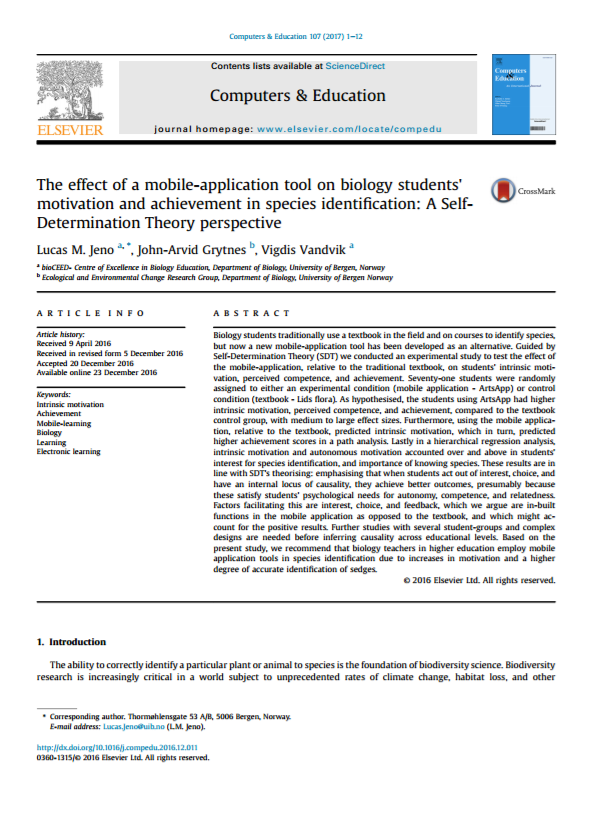 Biology students traditionally use a textbook in the field and on courses to identify species, but now a new mobile-application tool has been developed as an alternative. Guided by Self-Determination Theory (SDT) we conducted an experimental study to test the effect of the mobile-application, relative to the traditional textbook, on students’ intrinsic motivation, perceived competence, and achievement. Seventy-one students were randomly assigned to either an experimental condition (mobile application – ArtsApp) or control condition (textbook – Lids flora). As hypothesised, the students using ArtsApp had higher intrinsic motivation, perceived competence, and achievement, compared to the textbook control group, with medium to large effect sizes. Furthermore, using the mobile application, relative to the textbook, predicted intrinsic motivation, which in turn, predicted higher achievement scores in a path analysis. Lastly in a hierarchical regression analysis, intrinsic motivation and autonomous motivation accounted over and above in students’ interest for species identification, and importance of knowing species. These results are in line with SDT’s theorising: emphasising that when students act out of interest, choice, and have an internal locus of causality, they achieve better outcomes, presumably because these satisfy students’ psychological needs for autonomy, competence, and relatedness. Factors facilitating this are interest, choice, and feedback, which we argue are in-built functions in the mobile application as opposed to the textbook, and which might account for the positive results. Further studies with several student-groups and complex designs are needed before inferring causality across educational levels. Based on the present study, we recommend that biology teachers in higher education employ mobile application tools in species identification due to increases in motivation and a higher degree of accurate identification of sedges.
Biology students traditionally use a textbook in the field and on courses to identify species, but now a new mobile-application tool has been developed as an alternative. Guided by Self-Determination Theory (SDT) we conducted an experimental study to test the effect of the mobile-application, relative to the traditional textbook, on students’ intrinsic motivation, perceived competence, and achievement. Seventy-one students were randomly assigned to either an experimental condition (mobile application – ArtsApp) or control condition (textbook – Lids flora). As hypothesised, the students using ArtsApp had higher intrinsic motivation, perceived competence, and achievement, compared to the textbook control group, with medium to large effect sizes. Furthermore, using the mobile application, relative to the textbook, predicted intrinsic motivation, which in turn, predicted higher achievement scores in a path analysis. Lastly in a hierarchical regression analysis, intrinsic motivation and autonomous motivation accounted over and above in students’ interest for species identification, and importance of knowing species. These results are in line with SDT’s theorising: emphasising that when students act out of interest, choice, and have an internal locus of causality, they achieve better outcomes, presumably because these satisfy students’ psychological needs for autonomy, competence, and relatedness. Factors facilitating this are interest, choice, and feedback, which we argue are in-built functions in the mobile application as opposed to the textbook, and which might account for the positive results. Further studies with several student-groups and complex designs are needed before inferring causality across educational levels. Based on the present study, we recommend that biology teachers in higher education employ mobile application tools in species identification due to increases in motivation and a higher degree of accurate identification of sedges.
Reference and link to the article
Jeno, L. M., Grytnes, J.-A. and Vandvik, V. (2017). The effect of a mobile-application tool on biology students’ motivation and achievement in species identification: A Self-Determination Theory perspective. Computers and Education, 107, 1-12
Abstract
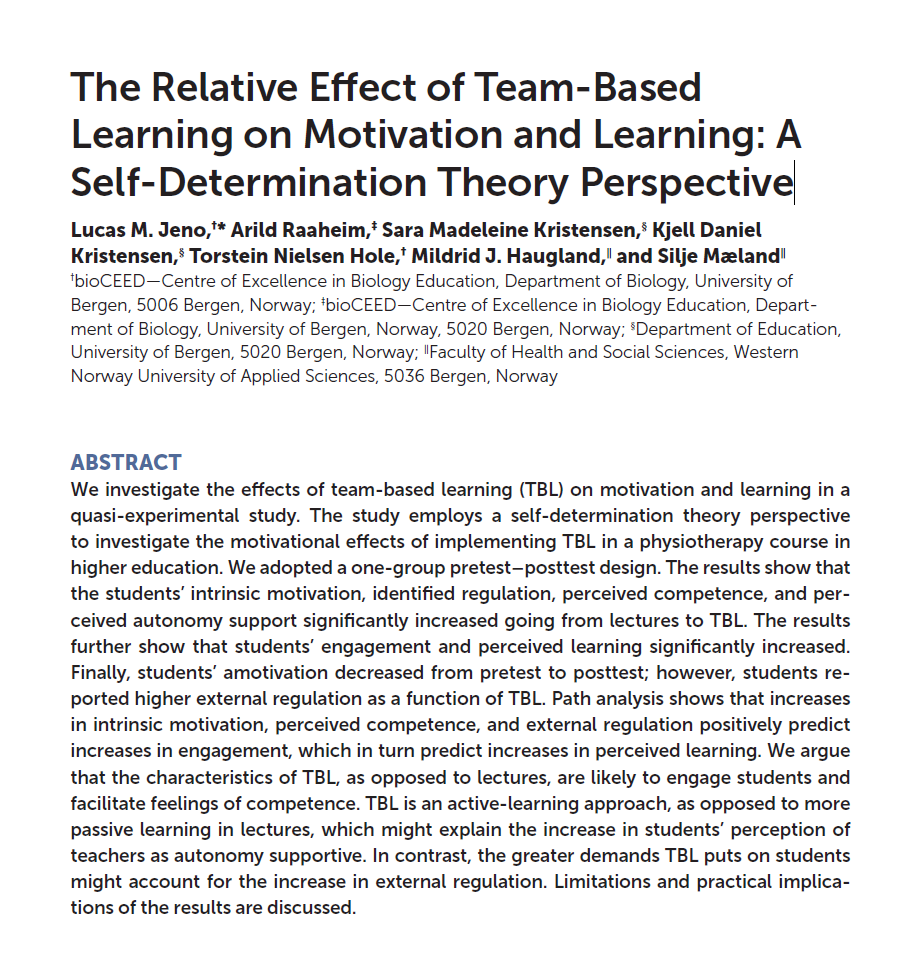 We investigate the effects of team-based learning (TBL) on motivation and learning in a quasi-experimental study. The study employs a self-determination theory perspective to investigate the motivational effects of implementing TBL in a physiotherapy course in higher education. We adopted a one-group pretest–posttest design. The results show that the students’ intrinsic motivation, identified regulation, perceived competence, and perceived autonomy support significantly increased going from lectures to TBL. The results further show that students’ engagement and perceived learning significantly increased. Finally, students’ amotivation decreased from pretest to posttest; however, students reported higher external regulation as a function of TBL. Path analysis shows that increases in intrinsic motivation, perceived competence, and external regulation positively predict increases in engagement, which in turn predict increases in perceived learning. We argue that the characteristics of TBL, as opposed to lectures, are likely to engage students and facilitate feelings of competence. TBL is an active-learning approach, as opposed to more passive learning in lectures, which might explain the increase in students’ perception of teachers as autonomy supportive. In contrast, the greater demands TBL puts on students might account for the increase in external regulation. Limitations and practical implications of the results are discussed.
We investigate the effects of team-based learning (TBL) on motivation and learning in a quasi-experimental study. The study employs a self-determination theory perspective to investigate the motivational effects of implementing TBL in a physiotherapy course in higher education. We adopted a one-group pretest–posttest design. The results show that the students’ intrinsic motivation, identified regulation, perceived competence, and perceived autonomy support significantly increased going from lectures to TBL. The results further show that students’ engagement and perceived learning significantly increased. Finally, students’ amotivation decreased from pretest to posttest; however, students reported higher external regulation as a function of TBL. Path analysis shows that increases in intrinsic motivation, perceived competence, and external regulation positively predict increases in engagement, which in turn predict increases in perceived learning. We argue that the characteristics of TBL, as opposed to lectures, are likely to engage students and facilitate feelings of competence. TBL is an active-learning approach, as opposed to more passive learning in lectures, which might explain the increase in students’ perception of teachers as autonomy supportive. In contrast, the greater demands TBL puts on students might account for the increase in external regulation. Limitations and practical implications of the results are discussed.
Reference and link to the article
Jeno, L. M., Raaheim, A., Kristensen, S. M., Kristensen, K. D., Hole, T. N., Haugland, M. J., and Mæland, S. (2017). The Relative Effect of Team-Based Learning on Motivation and Learning: A Self-Determination Theory Perspective. CBE—Life Sciences Education • 16:ar59, Winter 2017.
Abstract
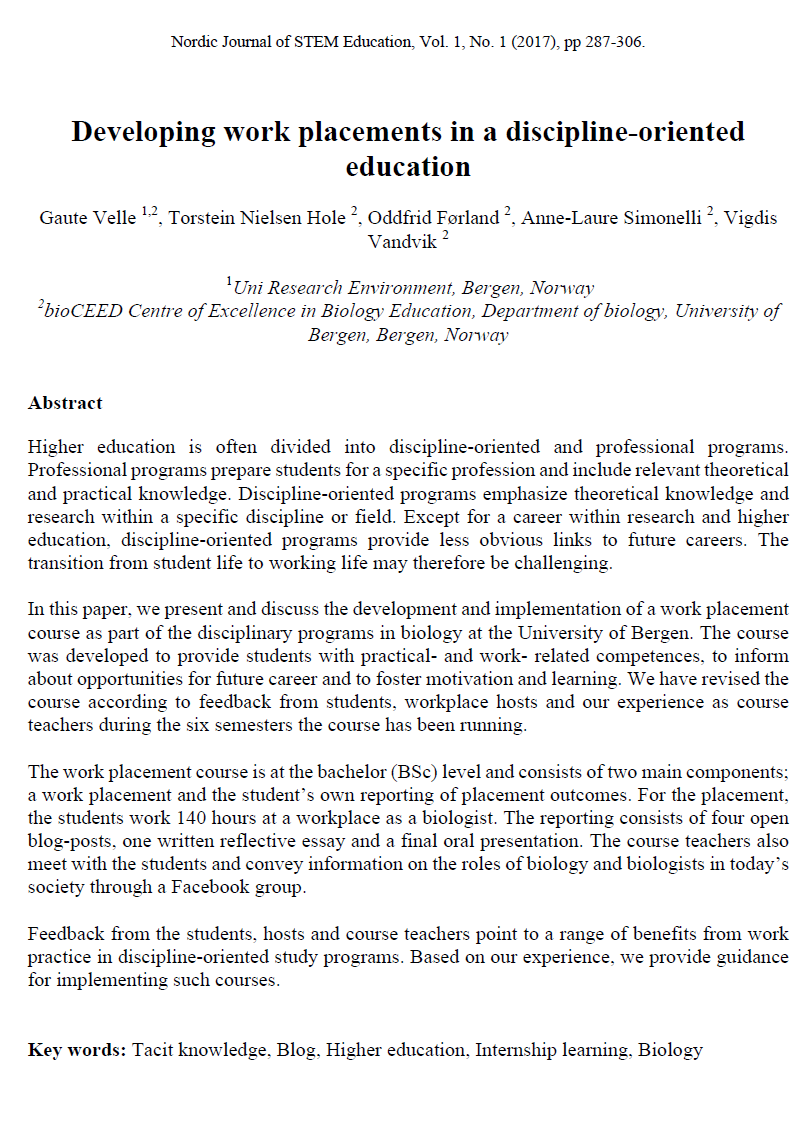 Higher education is often divided into discipline-oriented and professional programs. Professional programs prepare students for a specific profession and include relevant theoretical and practical knowledge. Discipline-oriented programs emphasize theoretical knowledge and research within a specific discipline or field. Except for a career within research and higher education, discipline-oriented programs provide less obvious links to future careers. The transition from student life to working life may therefore be challenging.
Higher education is often divided into discipline-oriented and professional programs. Professional programs prepare students for a specific profession and include relevant theoretical and practical knowledge. Discipline-oriented programs emphasize theoretical knowledge and research within a specific discipline or field. Except for a career within research and higher education, discipline-oriented programs provide less obvious links to future careers. The transition from student life to working life may therefore be challenging.
In this paper, we present and discuss the development and implementation of a work placement course as part of the disciplinary programs in biology at the University of Bergen. The course was developed to provide students with practical- and work- related competences, to inform
about opportunities for future career and to foster motivation and learning. We have revised the course according to feedback from students, workplace hosts and our experience as course teachers during the six semesters the course has been running.
The work placement course is at the bachelor (BSc) level and consists of two main components; a work placement and the student’s own reporting of placement outcomes. For the placement, the students work 140 hours at a workplace as a biologist. The reporting consists of four open blog-posts, one written reflective essay and a final oral presentation. The course teachers also meet with the students and convey information on the roles of biology and biologists in today’s society through a Facebook group. Feedback from the students, hosts and course teachers point to a range of benefits from work practice in discipline-oriented study programs. Based on our experience, we provide guidance for implementing such courses.
Reference and link to the article
Velle, G., Hole, T. N., Førland, O., Simonelli, A.-L., and Vandvik, V. (2017). Developing work placements in a discipline-oriented education Nordic Journal of STEM Education, Vol. 1, No. 1 (2017), pp 287-306.
2016
Abstract
There has been a gradual change over time towards an increased focus on the collegial and cultural aspects of teaching and learning. According to this perspective, quality emerges not within the individual, but within communities of teachers and students. Developing a quality culture requires a cultural shift supported by training and development activities to ensure that the teachers, as a collegium, have the knowledge and will to develop and change towards learner-centered teaching. Building a scholarly and collegial teaching culture, using the research culture as a model, was a first priority of Centre of Excellence in Biology Education (bioCEED). This paper discusses how a shift towards such a collegial Scholarly Teaching and Learning (SoTL) culture can come about, using the story of bioCEED as a case.
Reference and link to the article
Førland, O., Vandvik, V. and Andersson, R. (2016) The story of bioCEED or how to grow a SoTL culture from scratch. Proceedings of The 38th ANNUAL EAIR FORUM. https://lup.lub.lu.se/search/publication/21da69fd-e9cf-491d-926b-46d4d5e53751
2015
Abstract
Transferable skills as a concept in tertiary education has received increased interest since the Bologna process and through developments in the work market. The concept as a learning goal is seen as a means for ensuring employability in a changing industrial economy as well as increasing legitimacy of skills that are desirable across different disciplines. In this paper I will present some means to develop legitimacy in transferable skill learning in discipline education in general and biology education specifically. A concrete focus is collaboration, which functions as an example of how the intangible nature of some educational goals requires a theoretical response. This is performed on the basis of theoretical conceptions about tacit and work-place learning.
Reference and link to the article
Hole, T. N. (2015). Developing Collaboration as a Transferrable Skills in Biology Tertiary Education. Literacy Information and Computer Education Journal, 6(3), 1971-1975.
Abstract
Based on the work of Self-Determination Theory, this article suggests how to implement Self-Determination Theory based principle in a learner-centered perspective. Higher education has traditionally rested on learning methods that render passive students. Societal changes require self-regulatory skills and an active motivational set. However, lack of theoretical, empirical and practical driven theory in implementation of learner-centered education has lead to a philosophical debate. It is argued for a holistic model for implementing principles derived from Self-Determination Theory (SDT) in a learner-centered paradigm. SDT makes specific prediction for nurturing vs. neglecting learning environments, and thus highly appropriate framework. An important differentiation between types of motivations that differs in relative autonomy, and social climates that may be perceived as amotivating, controlling, and informational is necessary for understanding learning and educational practices. Finally, practical recommendations for teachers in higher education to put into practice. It is argued for a system in which all levels of education supports motivation to support student motivation. Both the institutional level and teacher culture must have a learner centered perspective, further, pre-during-post class preparations are important for high quality learning.
Reference and link to the article
Jeno, L. M. (2015). Encouraging Active Learning in Higher Education: A Self-Determination Theory Perspective. International Journal of Technology and Inclusive Education, 5(1), 716-721
Heidi Lie Andersen, Øyvind Fiksen, Lawrence Kirkendall, Sigurd Stefansson. Collegial evaluation of writing as a learning activity in a bachelor programme – MNT-konferansen 2017. https://doi.org/10.5324/njsteme.v1i1.2248
R. Andersson, P. B. Eidesen, Ø. Fiksen, O. Førland, S. Stefansson og V. Vandvik. Korleis få professorar med på ein kollegial SoTL-kultur? – MNT-konferansen 2017. https://doi.org/10.5324/njsteme.v1i1.2248
Cissy J Ballen, Stepfanie M Aguillon, Azza Awwad, Anne E Bjune, Daniel Challou, Abby Grace Drake, Michelle Driessen, Aziza Ellozy, Vivian E Ferry, Emma E Goldberg, William Harcombe, Steve Jensen, Christian Jørgensen, Zoe Koth, Suzanne McGaugh, Caroline Mitry, Bryan Mosher, Hoda Mostafa, Renee H Petipas, Paula A G Soneral, Shana Watters, Deena Wassenberg, Stacey L Weiss, Azariah Yonas, Kelly R Zamudio, Sehoya Cotner, Smaller Classes Promote Equitable Student Participation in STEM, BioScience, Volume 69, Issue 8, August 2019, Pages 669–680, https://doi.org/10.1093/biosci/biz069
Ballen, Cissy & Danielsen, Marie & Jørgensen, Christian & Grytnes, John Arvid & Cotner, Sehoya. (2017). Norway's gender gap: classroom participation in undergraduate introductory science. Nordic Journal of STEM Education. 1. 179-186. 10.5324/njsteme.v1i1.2325.
Ballen, Cissy J.; Lee, Dahsol; Rakner, Lise; Cotner, Sehoya Harris Politics a “Chilly” Environment for Undergraduate Women in Norway. PS: Political Science and Politics 2018 (1049-0965) Vol. 51 (3), s.653-658. DOI: https://doi.org/10.1017/S1049096518000045
Cissy Ballen, Marie Danielsen, Christian Jørgensen, John-Arvid Grytnes, and Sehoya Cotner. Norway’s gender gap: classroom participation in undergraduate introductory science – MNT-konferansen 2017. https://doi.org/10.5324/njsteme.v1i1.2325
Bjune, A., Grung, B., Holst, B. & Olsen, L. (2017). Testing the impact of active learning in first year undergraduate natural science courses. TALK & PAPER at The 2nd EuroSoTL Conference 2017, Lund, June 8th
Borstad, C., Forchhammer, M., & Gabrielsen T. M. (2017). Active learning and course alignment in thematically complex courses. TALK & PAPER at The 2nd EuroSoTL Conference 2017, Lund, June 8th
Chacón-Labella, J., Boakye, M., Enquist, B. J., Farfan-Rios, W., Gya, R., Halbritter, A. H., Middleton, S. L., von Oppen, J., Pastor-Ploskonka, S., Strydom, T., Vandvik, V., and Geange, S. R. (2020). From a crisis to an opportunity: Eight insights for doing science in the COVID-19 era and beyond. Ecology and Evolution. 2020;00:1–9. DOI: 10.1002/ece3.7026
Cotner, S., Jeno, L.M., Walker, J.D. et al. Gender gaps in the performance of Norwegian biology students: the roles of test anxiety and science confidence. IJ STEM Ed 7, 55 (2020). https://doi.org/10.1186/s40594-020-00252-1
Cotner, S, et al. 2020. International scientists need better support during global emergencies. https://www.timeshighereducation.com/blog/international-scientists-need-better-support-during-global-emergencies
Sehoya Cotner, Lucas M Jeno, Cissy Ballen. – Strategies to document active learning practices in biology – MNT-konferansen 2017. https://doi.org/10.5324/njsteme.v1i1.2248
Damsgård, B., Strømseng, E., & Varpe, Ø. (2017). Are learning outcomes affected by course intensity and workload? TALK & PAPER at The 2nd EuroSoTL Conference 2017, Lund, June 8th
P. B. Eidesen, A. Vader og J. E. Søreide. Utnytter vi potensialet for læring og personlig utvikling i feltundervisning? – MNT-konferansen 2017. https://doi.org/10.5324/njsteme.v1i1.2248
P.B. Eidesen, O.T.K. Førland, L.M. Håkansson, H.H. Christiansen, T.Dahl & E. Strømseng (2023). How formal initiatives to improve teaching can lead to more significant informal conversations and increased sharing practice, Nordic Journal of STEM Education, DOI: https://doi.org/10.5324/njsteme.v7i1.4951
Eidesen, P. B., Bjune, A. E., & Lang, S. I. (2023). “Show me how to use a microscope” – The development and evaluation of certification as direct assessment of practical lab skills. Ecology and Evolution, 13, e10592. DOI: 10.1002/ece3.10592
S. Eliassen, J. Kolding, J. Smedmark, and V. Vandvik. Numerical competence and quantitative skills in biology education – MNT-konferansen 2017. https://doi.org/10.5324/njsteme.v1i1.2248
K. Enberg; S. Ellingsen; I.H. Steen. (2019). Use of Active Learning Methods and Technologies – Obstacles, Incentives, and Bottlenecks. MNT-konferansen 2019
Esterhazy, R. and Fiksen, Ø. (2019). Evolution of a portfolio-based design in ecology: a three-year design cycle. Uniped, 01/2019 (volum 42) https://doi.org/10.18261/issn.1893-8981-2019-01-05
Førland, O., Vandvik, V. and Andersson, R. (2016) The story of bioCEED or how to grow a SoTL culture from scratch. Proceedings of The 38th ANNUAL EAIR FORUM. https://lup.lub.lu.se/search/publication/21da69fd-e9cf-491d-926b-46d4d5e53751
Førland, O. and Andersson, R. 2021. Conferences as a learning arena in a pedagogical course – MNT-konferansen 2021. https://doi.org/10.5324/njsteme.v5i1.3930
Oddfrid Førland & Torgny Roxå (2023) Establishing reward systems for excellence in teaching – the experience of academics pioneering a reward system, European Journal of Higher Education, DOI: 10.1080/21568235.2023.2214713
Geange SR, von Oppen J, Strydom T, et al. Next-generation field courses: Integrating Open Science and online learning. Ecol Evol. 2020;00:1–11. https://doi.org/10.1002/ece3.7009
Gya, R, Bjune, AE. Taking practical learning in STEM education home: Examples from do‐it‐yourself experiments in plant biology. Ecol Evol. 2021; 00: 1– 7. https://doi.org/10.1002/ece3.7207
R. Gya og M. V. Bjordal. Kan integrering i fagmiljøet øke motivasjon hos studenter? – MNT-konferansen 2017. https://doi.org/10.5324/njsteme.v1i1.2248
Gya R, Birkeli K, Dahle IJ, Foote CG, Geange SR, Lynn JS, Töpper JP, Vandvik V, Zernichow C, & Jenkins GB 2023. Registered Reports: A new chapter at Ecology & Evolution 13: e10023 (4 pp). https://doi.org/10.1002/ece3.10023
R. Gya; S.V. Haugum; F. Jaroszynska; J. Nylehn (2019). Learning by Doing and Reflection: the Redesign of an Alpine Ecology Field Course. MNT-konferansen 2019
Hammarlund, Sarah P.; Scott, Cheryl; Binning, Kevin R.; Cotner, Sehoya Harris Context Matters: How an Ecological-Belonging Intervention Can Reduce Inequities in STEM. BioScience 2022 (0006-3568) Vol. 72 (4), s. 387-396
Harlap, Y., Jørgensen, C., & Cotner, S. (2022). Maintaining quality assessment practices in Norwegian higher education after the two-evaluator law. Nordic Journal of STEM Education, 6(1).
Hebert S, Blum J, Wassenberg D, Marks D, Barry K, Cotner S. 2021. Open inquiry versus broadly relevant short-term research experiences for non-biology majors†. J. Microbiol. Biol. Educ. 22(1): doi:10.1128/jmbe.v22i1.2167
Hole, Torstein Nielsen; Velle, Gaute; Helleve, Ingrid; Ulvik, Marit; Sætre, Jon Helge; Brøske , Brit Ågot; Raaheim, Arild Learning and personal epistemologies among students in three work placement settings. Education Inquiry 2021 (2000-4508)
Hole, T. N., Velle, G., Riese, H., Raaheim, A., & Simonelli, A. L. (2018). Biology students at work: Using blogs to investigate personal epistemologies. Cogent Education, 5(1), 1563026. https://doi.org/10.1080/2331186X.2018.1563026
Hole, T. N. (2018). Working and Learning in a Field Excursion. CBE – Life Sciences Educational Vol 17, No 2 (2018), pp 1-11, https://doi.org/10.1187/cbe.17-08-0185
Hole, T. N. (2015). Developing Collaboration as a Transferrable Skills in Biology Tertiary Education. Literacy Information and Computer Education Journal, 6(3), 1971-1975. DOI:10.20533/licej.2040.2589.2015.0263
Holtermann, K., Gjerdevik, B., Rensvik, B. U., Balevik, S. B. and Stokka, T. 2021. Er vi bedre på læringsaktiviteter enn på læringsutbyttebeskrivelser – MNT-konferansen 2021. https://doi.org/10.5324/njsteme.v5i1.3913
Lucas M. Jeno, Kjetil Egelandsdal, John-Arvid Grytnes. (2022). A qualitative investigation of psychological need-satisfying experiences of a mobile learning application: A Self-Determination Theory approach. Computers and Education Open, Volume 3, 2022, 100108. https://doi.org/10.1016/j.caeo.2022.100108.
Lucas M. Jeno, Jorun Nylehn, Torstein N. Hole, Arild Raaheim, Gaute Velle & Vigdis Vandvik (2021): Motivational Determinants of Students’ Academic Functioning: The Role of Autonomy-support, Autonomous Motivation, and Perceived Competence, Scandinavian Journal of Educational Research, DOI: 10.1080/00313831.2021.1990125
Jeno, L. M., Diseth , Å. and Grytnes, J.-A. (2021). Testing the METUX Model in Higher Education: Interface and task need-satisfaction predict engagement, learning, and well-being. Front. Psychol. | doi: 10.3389/fpsyg.2021.631564
Jeno, L. M., Dettweiler, U. and Grytnes, J.-A. (2020). The effects of a goal-framing and need-supportive app on undergraduates’ intentions, effort, and achievement in mobile science learning. Computers & Education 159 (2020) 104022. https://doi.org/10.1016/j.compedu.2020.104022
Jeno, L. M., Adachi, P. J. C., Grytnes, J.-A., Vandvik, V., Deci, E. L. The effects of m‐learning on motivation, achievement and well‐being: A Self‐Determination Theory approach (2018). British journal of educational technology. https://doi.org/10.1111/bjet.12657
Lucas M. Jeno, Anne G. Danielsen & Arild Raaheim (2018) A prospective investigation of students’ academic achievement and dropout in higher education: a Self-Determination Theory approach, Educational Psychology, DOI: 10.1080/01443410.2018.1502412
Jeno L.M., Vandvik V., Eliassen S. & Grytnes J.-A. (2019). Testing the novelty effect of an m-learning tool on internalization and achievement: A Self-Determination Theory approach. Computers & Education. doi: https://doi.org/10.1016/j.compedu.2018.10.008
Jeno, L. M., Grytnes, J.-A. and Vandvik, V. (2017). The effect of a mobile-application tool on biology students’ motivation and achievement in species identification: A Self-Determination Theory perspective. Computers and Education, 107, 1-12. https://doi.org/10.1016/j.compedu.2016.12.011
Jeno, L. M., Raaheim, A., Kristensen, S. M., Kristensen, K. D., Hole, T. N., Haugland, M. J., and Mæland, S. (2017). The Relative Effect of Team-Based Learning on Motivation and Learning: A Self-Determination Theory Perspective. CBE—Life Sciences Education • 16:ar59, Winter 2017. https://doi.org/10.1187/cbe.17-03-0055
L. M. Jeno, J.A. Grytnes og Vigdis Vandvik. Hvordan teknologi bidrar til biologi-studenters motivasjon og læring – MNT-konferansen 2017. https://doi.org/10.5324/njsteme.v1i1.2248
Jeno, L. M. (2015). Encouraging Active Learning in Higher Education: A Self-Determination Theory Perspective. International Journal of Technology and Inclusive Education, 5(1), 716-721
Johansen MO, Eliassen S and Jeno LM (2023). “Why is this relevant for me?”: increasing content relevance enhances student motivation and vitality. Front. Psychol. 14:1184804. doi: 10.3389/fpsyg.2023.1184804
Johansen M.O., Eliassen S. and Jeno L.M. (2023). The bright and dark side of autonomy: How autonomy support and thwarting relate to student motivation and academic functioning. Front. Educ. 8:1153647. doi: 10.3389/feduc.2023.1153647
Johansen, M. O., Eliassen, S., & Jeno, L. M. (2024). Autonomy need satisfaction and frustration during a learning session affect perceived value, interest, and vitality among higher education students. In review - Scandinavian Journal of Educational Research.
Jørgensen, C., Goksøyr, A., Hjelle, K.L. & Linge, H. (2017). Exams as learning arena: A criterion-based system for justified marking, student feedback, and enhanced constructive alignment. TALK & PAPER at The 2nd EuroSoTL Conference 2017, Lund, June 8th
Keers, H., Salvanes, A.G., Grytnes, JA & Waagbø, R. (2017). How Technologies Motivate and Enhance Student Learning. TALK & PAPER at The 2nd EuroSoTL Conference 2017, Lund, June 8th
Møgelvang, A., Nyléhn, J. (2022) Co-operative Learning in Undergraduate Mathematics and Science Education: A Scoping Review. Int J of Sci and Math Educ. https://doi.org/10.1007/s10763-022-10331-0
Møgelvang, A., Vandvik, V., Ellingsen, S., Strømme, C. B., & Cotner, S. (2023). Cooperative learning goes online: Teaching and learning intervention in a digital environment impacts psychosocial outcomes in biology students. International Journal of Educational Research, 117, 102114. https://doi.org/10.1016/j.ijer.2022.102114
Møgelvang, A., & Nyléhn, J. (2023). Interdependence between Perceived Cooperative Learning, Sense of Belonging, and Generic Skills in Undergraduate STEM Education. Nordic Journal of STEM Education, 7(1), 1-14. DOI: https://doi.org/10.5324/njsteme.v7i1.4949
Nyléhn, J., & Ødegaard, M. (2018). The “Species” Concept as a Gateway to Nature of Science. Species Concepts in Norwegian Textbooks. Science & Education, 27(7-8), 685-714. doi: https://doi.org/10.1007/s11191-018-0007-7
Patrick, L., S. Thompson, A. H. Halbritter, B. J. Enquist, V. Vandvik, S. Cotner. 2020. Adding Value to a Field-Based Course with a Science Communication Module on Local Perceptions of Climate Change. Bull Ecol Soc Am 101(3):e01680. https://doi.org/10.1002/bes2.1680
Schrum, Kelly, Niall Majury, and Anne Laure Simonelli. 2021. “Authentic Learning Across Disciplines and Borders With Scholarly Digital Storytelling”. Teaching and Learning Inquiry 9 (2). https://doi.org/10.20343/teachlearninqu.9.2.8
Strømme CB, Lane AK, Halbritter AH, Law E, Nater CR, Nilsen EB, Boutouli GD, Egelkraut DD, Telford RJ, Vandvik V, Cotner SH (2022) Close to open—Factors that hinder and promote open science in ecology research and education. PLoS ONE 17(12): e0278339. https://doi.org/10.1371/journal.pone.0278339
Jonathan Soulé, Oddfrid Førland, and Tina Dahl. Sense and sensibility in workload calculation – MNT-konferansen 2017. https://doi.org/10.5324/njsteme.v1i1.2248
Vandvik, V., Halbritter, A.H., Yang, Y. et al. Plant traits and vegetation data from climate warming experiments along an 1100 m elevation gradient in Gongga Mountains, China. Sci Data 7, 189 (2020). https://doi.org/10.1038/s41597-020-0529-0
S. Våge; M. Eilertsen; A.C. Øvergård;F. Berg; J.Nylehn. (2019). Learning outcomes at master level in biology. Current expectations and guidelines for the future. MNT-konferansen 2019
G. Velle and T. Nielsen Hole. Developing work placements in a discipline education – MNT-konferansen 2017. https://doi.org/10.5324/njsteme.v1i1.2248
Velle, G., Hole, T. N., Førland, O., Simonelli, A.-L., and Vandvik, V. (2017). Developing work placements in a discipline-oriented education Nordic Journal of STEM Education, Vol. 1, No. 1 (2017), pp 287-306. https://doi.org/10.5324/njsteme.v1i1.2344
Zhao, FangFang, Gillian Roehrig, Lorelei Patrick, Chantal Levesque-Bristol, and Sehoya Cotner. 2021. “Using a Self-Determination Theory Approach to Understand Student Perceptions of Inquiry-Based Learning”. Teaching and Learning Inquiry 9 (2). https://doi.org/10.20343/teachlearninqu.9.2.5.
Yasué, Maï; Jeno, Lucas M.; and Langdon, Jody L. (2019) "Are Autonomously Motivated University Instructors More Autonomy-Supportive Teachers?," International Journal for the Scholarship of Teaching and Learning: Vol. 13: No. 2, Article 5.
Available at: https://digitalcommons.georgiasouthern.edu/ij-sotl/vol13/iss2/5 - https://doi.org/10.20429/ijsotl.2019.130205
2023
Abstract
 Identifying evidence-based teaching and learning strategies that can ease teacher challenges and mitigate student concerns in digital settings becomes increasingly important. In this intervention study we compared the effect of digital cooperative learning (CL) and digital lectures on a range of psychosocial outcomes, specifically students’ sense of belonging, science confidence, perceived generic skills, and loneliness, among a Norwegian sample of undergraduate biology students (n = 71). Employing a one-group pretest/posttest quasi-experimental design with a double pretest and follow-up, we found that students’ scores on psychosocial outcomes improved significantly following digital CL compared to digital lectures. Further, the effect sizes suggest that the effect of CL on psychosocial outcomes in digital settings is at least as substantial as in physical settings.
Identifying evidence-based teaching and learning strategies that can ease teacher challenges and mitigate student concerns in digital settings becomes increasingly important. In this intervention study we compared the effect of digital cooperative learning (CL) and digital lectures on a range of psychosocial outcomes, specifically students’ sense of belonging, science confidence, perceived generic skills, and loneliness, among a Norwegian sample of undergraduate biology students (n = 71). Employing a one-group pretest/posttest quasi-experimental design with a double pretest and follow-up, we found that students’ scores on psychosocial outcomes improved significantly following digital CL compared to digital lectures. Further, the effect sizes suggest that the effect of CL on psychosocial outcomes in digital settings is at least as substantial as in physical settings.
Reference and link to the article
Møgelvang, A., Vandvik, V., Ellingsen, S., Strømme, C. B., & Cotner, S. (2023). Cooperative learning goes online: Teaching and learning intervention in a digital environment impacts psychosocial outcomes in biology students. International Journal of Educational Research, 117, 102114. https://doi.org/10.1016/j.ijer.2022.102114
2022
Abstract
Much research on mobile learning is cross-sectional or lacks a theoretical basis for investigating the mechanisms of mobile learning and achievement. This may be a concern as well-formulated theoretical frameworks allow results to be interpreted and contextualized in a coherent and integrated fashion that could then be valuable when interpreting findings in educational contexts. The main aim of this study was to investigate biology students’ experiences of using a mobile application for learning about species identification. We use Self-Determination Theory as a guiding framework to investigate students’ experiences of need-satisfaction of autonomy, competence, and relatedness within a mobile application, and whether this influences students’ learning processes. We conducted four focus groups with 26 biology students in higher education. Based on our thematic analysis, we find that students experienced the satisfaction of all three psychological needs while using the mobile application. Specifically, students’ needs were satisfied by experiencing choice, feedback, mastery, cooperation, and discussion. These elements in turn were related to the process of identifying species. Contradictory to what we expected, students reported more learning from a traditional textbook, compared to the mobile application. Our results provide useful information for learning designers, which suggests that it is important to take need-satisfaction into consideration when designing technology. Our study offers new insight into the underlying need-satisfying experiences of mobile learning, and it provides an understanding of how the different elements of need-satisfaction contribute to different species identification processes.
Reference and link to the article
Lucas M. Jeno, Kjetil Egelandsdal, John-Arvid Grytnes. A qualitative investigation of psychological need-satisfying experiences of a mobile learning application: A Self-Determination Theory approach. Computers and Education Open, Volume 3, 2022, 100108. https://doi.org/10.1016/j.caeo.2022.100108.
Abstract
To cope with an unpredictable future, higher education in mathematics and science (MS) needs to educate a knowledgeable and skilled workforce. Co-operative learning (CL) is a teaching method associated with increased academic achievement and development of generic skills. Thus, the purposes of this scoping review are to assess the evidence base of CL in undergraduate MS education to inform teaching practices and to identify potential knowledge gaps to inform future research. The review covers 24 empirical studies conducted from 2010 to 2020 on the prevalence, uses, and outcomes of CL elements in undergraduate MS education. The results show that there are few such studies, and these are rarely conducted outside the US or in disciplines other than chemistry. The most frequently implemented CL elements in the included studies are heterogeneous group formation, the use of roles, and different CL structures. The most prevalent student outcome of implemented CL elements in the reviewed studies is enhanced academic success, followed by student attitudes, generic skills, and psychological health. The results have implications for future implementation of and research on CL in international MS higher education.
Reference and link to the article
Møgelvang, A., Nyléhn, J. Co-operative Learning in Undergraduate Mathematics and Science Education: A Scoping Review. Int J of Sci and Math Educ (2022). https://doi.org/10.1007/s10763-022-10331-0
2021
Abstract
Vi presenterer ein metode for å engasjere undervisarar i SoTL (Scholarship of Teaching and Learning) derundervisingsutvikling i eigen praksisvert delt gjennom deltaking på læringskonferansar. Utviklingsarbeidet blir gjort i ramma av eit pedagogisk kurs, der deltakarane gjennomfører gruppebaserte SoTL-prosjekt meiningsfulle for deira kontekst og praksis. Som del av kursetvert arbeidet sendt inn som bidrag til ein kollegavurdert læringskonferanse. Kursdesignet med kollegiale grupper ogprosjekt i eigen kontekst sikrar ei viktig lokal forankring av SoTL-arbeidet. Konferansedeltaking som kursaktivitet tilfører ein ekstra dimensjon og enarenafor læring og deling. Undervisarane utset arbeidet sitt for kritisk gransking og formidling i eit større miljø, og slik blir utviklingsarbeidet relevant og ekte –og ikkje berre ei oppgåve i eit kurs.Vi finn at deltakarane hadde stort utbytte av å presentere på læringskonferansar, og opplevde at konferansedeltaking gav meirverdi til kurset. Å presentere for eit interessert og kunnskapsrikt publikum var inspirerande og meiningsfullt, men undervisarane kjende òg på usikkerheit om kvalitetog kunnskapsnivå. Førebuande kursaktivitetar bidrog til å styrke sjølvtillit og kvalitet, og førebygge usikkerheit.Konferanse som kursaktivitet er krevjandefor både deltakarar og kursleiar. Andre potensielle utfordringarer t.d. høgare terskel for å delta, risikofor refuserte bidrag, auka arbeidsmengde, kostnad og tidsbruk.
Reference and link to the article
Førland O and Andersson R. 2021. Conferences as a learning arena in a pedagogical course – MNT-konferansen 2021
Abstract

Practical teaching can give authentic learning experiences and teach valuable skills for undergraduate students in the STEM disciplines. One of the main ways of giving students such experiences, laboratory teaching, is met with many challenges such as budget cuts, increased use of virtual learning, and currently the university lockdowns due to the COVID‐19 pandemic. We highlight how at‐home do‐it‐yourself (DIY) experiments can be a good way to include physical interaction with your study organism, system, or technique to give the students a practical, authentic learning experience. We hope that by outlining the benefits of a practical, at‐home, DIY experiment we can inspire more people to design these teaching activities in the current remote teaching situation and beyond. By contributing two examples in the field of plant biology we enrich the database on experiments to draw inspiration from for these teaching methods.
Keywords: at-home experiment, botany experiment, inquiry-based learning, remote learning, student active
Reference and link to the article
Gya, R, Bjune, AE. Taking practical learning in STEM education home: Examples from do‐it‐yourself experiments in plant biology. Ecol Evol. 2021; 00: 1– 7. https://doi.org/10.1002/ece3.7207
Abstract

Undergraduate student participation in course-based research experiences results in many positive outcomes, but there is a lack of evidence demonstrating which elements of a research experience are necessary, especially for non-biology majors. Broad relevance is one element that can be logistically challenging to incorporate into research experiences in large-enrollment courses. We investigated the impacts of broad relevance in a short-term research experience in an introductory biology course for non-majors. Students either participated in an open-inquiry research experience (OI-RE), where they developed their own research question, or a broadly relevant research experience (BR-RE), where they investigated a question assigned to them that was relevant to an ongoing research project. We found a significant association between the type of research project experienced and students’ preference for an experience, with half of the students in the OI-RE group and nearly all students in the BR-RE group preferring a broadly relevant research experience. However, since science confidence increased over the course for both groups, these findings indicate that while students who participated in a BR-RE valued it, broadly relevant research experiences may not be necessary for positive outcomes for non-majors.
Reference and link to the article
Hebert S, Blum J, Wassenberg D, Marks D, Barry K, Cotner S. 2021. Open inquiry versus broadly relevant short-term research experiences for non-biology majors†. J. Microbiol. Biol. Educ. 22(1): doi:10.1128/jmbe.v22i1.2167
Abstract

I denne artikkelen ser vi på sammenhengen mellom læringsaktiviteter og innholdeti læringsutbyttebeskrivelser. Vår undersøkelse av læringsutbyttebeskrivelser viser at flere avferdighetene og de generelle kompetansene inngår i emnene sine læringsaktiviteter, men at de ikkealltid gjenspeiles i læringsutbyttebeskrivelsene på emnene.Læringsutbyttebeskrivelser tydeliggjør for student og underviser hva forventet læring i emnet er og bør derfor vise det reelle innholdet i emnene. Ved utforming av læringsutbyttebeskrivelser er det viktig å se på sammenhengen mellom læringsutbytte, læringsaktivitet og vurdering(constructive alignment) (Biggs og Tang, 2011; Biggs, 2014). Læringsutbyttet gir oversikt overinnhold i emner og konkretiserer hvilke emner som har ansvar for ulike deler av gradens samledelæringsutbytte. Læringsutbyttebeskrivelser kan også vise arbeidslivsrelevans gjennomsynliggjøring av ferdigheter og generell kompetanse (Smith og Reid, 2018).Bakgrunnen for undersøkelsen er prosjektetGeneriske ferdigheterved Det matematisk- naturvitenskapelige fakultet ved Universitetet i Bergen. Prosjektet inkluderer en emnekartlegging(curriculum mapping) der emnenes innhold av ferdigheter og generell kompetanse uttrykt somsamarbeid, skriftlig og muntlig kommunikasjon samtkritisk tenking og informasjonskompetanse bleidentifisert. Vi undersøkte om svarene fra emnekartleggingen kan gjenfinnes i læringsutbyttebekrivelsene for utvalgte emner. Gjennomføring av emnekartlegging kan brukes for å se på innholdet av generell kompetanse i utdanningen, men det er lite fokus på den praktiske utførelsen av dette (Sumsion og Goodfellow, 2004; Lam og Tsui, 2014). Derimot er det få artikler som konkretiserer hvordan man bruker resultatene fra en emnekartlegging for å identifisere mangler i læringsutbyttebeskrivelser. Dette paperet vil kunne bidra til en bedre forståelse av hvordan man kan jobbe med dette..
Reference and link to the article
Holtermann K, Gjerdevik B., Rensvik B U, Balevik S B and Stokka T. 2021. Er vi bedre på læringsaktiviteter enn på læringsutbyttebeskrivelser – MNT-konferansen 2021
 The main aim of this study is to test the validity of the Motivation, Engagement, and Thriving in User Experience (METUX) model (Peters, Calvo, & Ryan, 2018) in higher education. We propose a process model in which we investigate how the need-satisfaction of digital learning tools within the interface sphere and task sphere accounts for engagement, learning, and well-being. A total of 426 higher education students drawn from two subsamples participated in this cross-sectional study. A structural equation model shows that interface autonomy and competence satisfaction positively predict task autonomy and competence. Task competence, in turn, negatively predicts focused attention and positively perceived usability and well-being. Task autonomy positively predicts perceived usability and reward. Based on our results, we provide some initial support for the METUX model in higher education. However, more validation work is needed to improve the scale that measures need-satisfaction in the interface and task spheres. Moreover, we find no support for the effect of task sphere on learning. Further investigations are needed into how METUX can be used in domain- and situation-specific contexts to account for increases in engagement, learning, and well-being. Finally, future studies need to include all aspects of the METUX model in order to fully test its validity.
Keywords: Higher education, Self-determination theory, METUX, Achievement, Technology
Reference and link to the article
Jeno LM, Diseth Å and Grytnes J-A (2021) Testing the METUX Model in Higher Education: Interface and Task Need–Satisfaction Predict Engagement, Learning, and Well-Being. Front. Psychol. 12:631564. doi: 10.3389/fpsyg.2021.631564
The main aim of this study is to test the validity of the Motivation, Engagement, and Thriving in User Experience (METUX) model (Peters, Calvo, & Ryan, 2018) in higher education. We propose a process model in which we investigate how the need-satisfaction of digital learning tools within the interface sphere and task sphere accounts for engagement, learning, and well-being. A total of 426 higher education students drawn from two subsamples participated in this cross-sectional study. A structural equation model shows that interface autonomy and competence satisfaction positively predict task autonomy and competence. Task competence, in turn, negatively predicts focused attention and positively perceived usability and well-being. Task autonomy positively predicts perceived usability and reward. Based on our results, we provide some initial support for the METUX model in higher education. However, more validation work is needed to improve the scale that measures need-satisfaction in the interface and task spheres. Moreover, we find no support for the effect of task sphere on learning. Further investigations are needed into how METUX can be used in domain- and situation-specific contexts to account for increases in engagement, learning, and well-being. Finally, future studies need to include all aspects of the METUX model in order to fully test its validity.
Keywords: Higher education, Self-determination theory, METUX, Achievement, Technology
Reference and link to the article
Jeno LM, Diseth Å and Grytnes J-A (2021) Testing the METUX Model in Higher Education: Interface and Task Need–Satisfaction Predict Engagement, Learning, and Well-Being. Front. Psychol. 12:631564. doi: 10.3389/fpsyg.2021.631564 Abstract
 Inadequate academic functioning among students might be a main cause of the considerable dropout rates, and well-being and achievement problems in higher education. Few studies address the role of motivation for academic functioning. Thus, using Self-Determination Theory, the main goal of this study was to investigate motivational determinants of academic functioning among 406 biology students (mode age 21-25, 69.5% females) from nine higher education institutions in Norway. Data were collected using an online survey and analyzed using Structural Equation Modeling. Results show that teacherś autonomy-support positively predicts autonomous motivation and perceived competence among the students. In turn, autonomous motivation and competence positively predicts vitality, and negatively predicts dropout intentions. Achievement was only predicted by perceived competence. We recommend that instructors adopt an autonomy-supportive teaching style, for example by providing a meaningful rationale when introducing teaching and learning activities, for students to feel more competent and autonomous in their motivation.
Inadequate academic functioning among students might be a main cause of the considerable dropout rates, and well-being and achievement problems in higher education. Few studies address the role of motivation for academic functioning. Thus, using Self-Determination Theory, the main goal of this study was to investigate motivational determinants of academic functioning among 406 biology students (mode age 21-25, 69.5% females) from nine higher education institutions in Norway. Data were collected using an online survey and analyzed using Structural Equation Modeling. Results show that teacherś autonomy-support positively predicts autonomous motivation and perceived competence among the students. In turn, autonomous motivation and competence positively predicts vitality, and negatively predicts dropout intentions. Achievement was only predicted by perceived competence. We recommend that instructors adopt an autonomy-supportive teaching style, for example by providing a meaningful rationale when introducing teaching and learning activities, for students to feel more competent and autonomous in their motivation.
Keywords: Motivation; dropout; well-Being; achievement; Self-Determination Theory; higher education; academic functioning
Reference and link to the article
Lucas M. Jeno, Jorun Nylehn, Torstein N. Hole, Arild Raaheim, Gaute Velle & Vigdis Vandvik (2021): Motivational Determinants of Students’ Academic Functioning: The Role of Autonomy-support, Autonomous Motivation, and Perceived Competence, Scandinavian Journal of Educational Research, DOI: 10.1080/00313831.2021.1990125
Abstract
 Scholarly digital storytelling combines academic research and digital skills to communicate scholarly work within and beyond the classroom. This article presents three case studies that demonstrate efforts to integrate scholarly digital storytelling, a technology-enhanced assessment, across disciplines, geographic locations, and teaching contexts. The case studies originate in the United States, Northern Ireland [UK], and Norway, and represent learning across multiple disciplines, including history, higher education, geography, and biology. This article explores the potential for scholarly digital storytelling, when carefully planned, scaffolded, and implemented, to engage students in authentic learning, teaching students to think deeply and creatively about disciplinary content while creating sharable digital products.
Scholarly digital storytelling combines academic research and digital skills to communicate scholarly work within and beyond the classroom. This article presents three case studies that demonstrate efforts to integrate scholarly digital storytelling, a technology-enhanced assessment, across disciplines, geographic locations, and teaching contexts. The case studies originate in the United States, Northern Ireland [UK], and Norway, and represent learning across multiple disciplines, including history, higher education, geography, and biology. This article explores the potential for scholarly digital storytelling, when carefully planned, scaffolded, and implemented, to engage students in authentic learning, teaching students to think deeply and creatively about disciplinary content while creating sharable digital products.
Keywords: authentic learning, technology-enhanced assessment, scholarly digital storytelling, digital skills
Reference and link to the article
Schrum, Kelly, Niall Majury, and Anne Laure Simonelli. 2021. “Authentic Learning Across Disciplines and Borders With Scholarly Digital Storytelling”. Teaching and Learning Inquiry 9 (2). https://doi.org/10.20343/teachlearninqu.9.2.8
Abstract
Inquiry-based laboratory activities, as a part of science curricula, have been advocated to increase students’ learning outcomes and improve students’ learning experiences, but students sometimes struggle with open-inquiry activities. This study aims to investigate students’ perceptions of inquiry-based learning in a set of laboratory activities, specifically from a psychological (i.e., Self-Determination Theory) perspective. Students’ ratings of the level of inquiry in these activities indicate that students’ perceptions of inquiry align with the instructor-intended amount of inquiry in each exercise. Students’ written responses, explaining their ratings, indicate that students’ perceptions of the amount of inquiry in a given lab exercise relate to their feeling of freedom (or autonomy), competence, and relatedness (or support), during the inquiry-based learning activities. The results imply that instructors implementing inquiry-based learning activities should consider student motivation, and Self-Determination Theory can be a useful diagnostic tool during teaching development.
Keywords: inquiry-based learning, Self-Determination Theory (SDT), student perceptions, laboratory activities
Reference and link to the article
Zhao, FangFang, Gillian Roehrig, Lorelei Patrick, Chantal Levesque-Bristol, and Sehoya Cotner. 2021. “Using a Self-Determination Theory Approach to Understand Student Perceptions of Inquiry-Based Learning”. Teaching and Learning Inquiry 9 (2). doi: https://doi.org/10.20343/teachlearninqu.9.2.5
2020
Abstract

The COVID‐19 crisis has forced researchers in Ecology to change the way we work almost overnight. Nonetheless, the pandemic has provided us with several novel components for a new way of conducting science. In this perspective piece, we summarize eight central insights that are helping us, as early career researchers, navigate the uncertainties, fears, and challenges of advancing science during the COVID‐19 pandemic. We highlight how innovative, collaborative, and often Open Science‐driven developments that have arisen from this crisis can form a blueprint for a community reinvention in academia. Our insights include personal approaches to managing our new reality, maintaining capacity to focus and resilience in our projects, and a variety of tools that facilitate remote collaboration. We also highlight how, at a community level, we can take advantage of online communication platforms for gaining accessibility to conferences and meetings, and for maintaining research networks and community engagement while promoting a more diverse and inclusive community. Overall, we are confident that these practices can support a more inclusive and kinder scientific culture for the longer term.
Keywords: data sharing, early career, inclusivity, networking, online collaboration, skill development
Reference and link to the article
Chacón-Labella, J., Boakye, M., Enquist, B. J., Farfan-Rios, W., Gya, R., Halbritter, A. H., Middleton, S. L., von Oppen, J., Pastor-Ploskonka, S., Strydom, T., Vandvik, V., and Geange, S. R. (2020). From a crisis to an opportunity: Eight insights for doing science in the COVID-19 era and beyond. Ecology and Evolution. 2020;00:1–9. DOI: 10.1002/ece3.7026
Abstract

Background: understanding student motivational factors such as test anxiety and science confidence is important for increasing retention in science, technology, engineering, and math (STEM), especially for underrepresented students, such as women. We investigated motivational metrics in over 400 introductory biology students in Norway, a country lauded for its gender equality. Specifically, we measured test anxiety and science confidence and combined students’ survey responses with their performance in the class.
Results: we found that female students expressed more test anxiety than did their male counterparts, and the anxiety they experienced negatively predicted their performance in class. By contrast, the anxiety male students experienced did not predict their performance. Conversely, men had higher confidence than women, and confidence interacted with gender, so that the difference between its impact on men’s and women’s performance was marginally significant.
Conclusions: our findings have implications for STEM instructors, in Norway and beyond: specifically, to counter gender-based performance gaps in STEM courses, minimize the effects of test anxiety.
Keywords: Gender equity, Science confidence, Test anxiety, Higher education, STEM
Reference and link to the article
Cotner, S., Jeno, L.M., Walker, J.D. et al. Gender gaps in the performance of Norwegian biology students: the roles of test anxiety and science confidence. IJ STEM Ed 7, 55 (2020). https://doi.org/10.1186/s40594-020-00252-1
Abstract
Being trapped in Peru as countries went into lockdown showed us just how little support is available to researchers working abroad, a group of biologists writes
Reference and link to the article
Cotner, S, et al. 2020. International scientists need better support during global emergencies. https://www.timeshighereducation.com/blog/international-scientists-need-better-support-during-global-emergencies
Abstract

As Open Science practices become more commonplace, there is a need for the next generation of scientists to be well versed in these aspects of scientific research. Yet, many training opportunities for early career researchers (ECRs) could better emphasize or integrate Open Science elements. Field courses provide opportunities for ECRs to apply theoretical knowledge, practice new methodological approaches, and gain an appreciation for the challenges of real‐life research, and could provide an excellent platform for integrating training in Open Science practices. Our recent experience, as primarily ECRs engaged in a field course interrupted by COVID‐19, led us to reflect on the potential to enhance learning outcomes in field courses by integrating Open Science practices and online learning components. Specifically, we highlight the opportunity for field courses to align teaching activities with the recent developments and trends in how we conduct research, including training in: publishing registered reports, collecting data using standardized methods, adopting high‐quality data documentation, managing data through reproducible workflows, and sharing and publishing data through appropriate channels. We also discuss how field courses can use online tools to optimize time in the field, develop open access resources, and cultivate collaborations. By integrating these elements, we suggest that the next generation of field courses will offer excellent arenas for participants to adopt Open Science practices.
Keywords: career development, early career researchers, FAIR principles, higher education, pedagogy, reproducible research
Reference and link to the article
Geange SR, von Oppen J, Strydom T, et al. Next-generation field courses: Integrating Open Science and online learning. Ecol Evol. 2020;00:1–11. https://doi.org/10.1002/ece3.7009
Abstract

In this study we investigate the effect of manipulating intrinsic goals, relative to extrinsic goals, in a mobile learning tool and traditional textbook for biology students. Using Self- Determination Theory, we hypothesized that framing intrinsic goals in a need-supportive mobile learning app would enhance motivation, intentions, effort, and achievement, relative to extrinsic goals in a traditional tool (textbook). We randomized 128 undergraduate students learning to identify species in this 2 × 2 experiment. Using Bayesian analyses, results show a credible interaction effect between the mobile app and intrinsic goal-framing for intentions and identified regulation. For effort and achievement, the main effect of mobile learning is credible with substantial effect sizes. We argue that these findings are due to the need-supportive features within the mobile app and need-satisfying experience of pursuing intrinsic goals. For intrinsic motivation and amotivation, however, extrinsic goal-framing and intrinsic goal-framing, respectively, are credible and positive main effects, which is unexpected. More research is needed to investigate if this contradictory finding is replicated by others, or if students are pursuing extrinsic goals for autonomous motivation. Bayesian multigroup path analysis found across both groups that identified regulation predicted intentions, and intrinsic motivation predicted effort and achievement. For the extrinsic goal-framing group, amotivation predicted achievement, identified regulation predicted effort and achievement, and intrinsic motivation negatively predicted intentions. The results of our study provide theoretical implications for how goal-framing energizes different types of motivation within the mLearning context, and how manipulation within technology may have a differential effect on motivation than a physical agent.
Keywords: Self-determination theory, Bayesian analysis, Goal-framing, Higher education, mLearning
Reference and link to the articleJeno, L. M., Dettweiler, U. and Grytnes, J.-A. (2020). The effects of a goal-framing and need-supportive app on undergraduates’ intentions, effort, and achievement in mobile science learning. Computers & Education 159 (2020) 104022 https://doi.org/10.1016/j.compedu.2020.104022
Abstract

Field courses, while generally considered as beneficial for students, are challenging to implement and can lead to strained relationships between local residents and visiting scientists. Thus, it is critical to both maximize the educational value of field courses and help students develop contextualized science communication skills. We report on the development of a science communication module, integrated into an existing field-based ecology course, which aims to add value to an international field course enrolling students from multiple countries. Specifically, students surveyed local residents about their knowledge and perceptions of climate change, and then discussed their findings.
Keywords: climate change, field courses, science communication.
Reference and link to the article
Patrick, L., S. Thompson, A. H. Halbritter, B. J. Enquist, V. Vandvik, S. Cotner. 2020. Adding Value to a Field-Based Course with a Science Communication Module on Local Perceptions of Climate Change. Bull Ecol Soc Am 101(3):e01680. https://doi.org/10.1002/bes2.1680
Abstract

Functional trait data enhance climate change research by linking climate change, biodiversity response, and ecosystem functioning, and by enabling comparison between systems sharing few taxa. Across four sites along a 3000–4130m a.s.l. gradient spanning 5.3°C in growing season temperature in Mt. Gongga, Sichuan, China, we collected plant functional trait and vegetation data from control plots, open top chambers (OTCs), and reciprocally transplanted vegetation turfs. Over fve years, we recorded vascular plant composition in 140 experimental treatment and control plots. We collected trait data associated with plant resource use, growth, and life history strategies (leaf area, leaf thickness, specifc leaf area, leaf dry matter content, leaf C, N and P content and C and N isotopes) from local populations and from experimental treatments. The database consists of 6,671 plant records and 36,743 trait measurements (increasing the trait data coverage of the regional fora by 500%) covering 11 traits and 193 plant taxa (ca. 50% of which have no previous published trait data) across 37 families.
Keywords: climate-change ecology, community ecology, natural variation in plants.
Reference and link to the article
Vandvik, V., Halbritter, A.H., Yang, Y. et al. Plant traits and vegetation data from climate warming experiments along an 1100 m elevation gradient in Gongga Mountains, China. Sci Data 7, 189 (2020). https://doi.org/10.1038/s41597-020-0529-0
2019
Abstract
 As science, technology, engineering, and mathematics (STEM) classrooms in higher education transition from lecturing to active learning, the frequency of student interactions in class increases. Previous research documents a gender bias in participation, with women participating less than would be expected on the basis of their numeric proportions. In the present study, we asked which attributes of the learning environment contribute to decreased female participation: the abundance of in-class interactions, the diversity of interactions, the proportion of women in class, the instructor’s gender, the class size, and whether the course targeted lower division (first and second year) or upper division (third or fourth year) students. We calculated likelihood ratios of female participation from over 5300 student–instructor interactions observed across multiple institutions. We falsified several alternative hypotheses and demonstrate that increasing class size has the largest negative effect. We also found that when the instructors used a diverse range of teaching strategies, the women were more likely to participate after small-group discussions.
As science, technology, engineering, and mathematics (STEM) classrooms in higher education transition from lecturing to active learning, the frequency of student interactions in class increases. Previous research documents a gender bias in participation, with women participating less than would be expected on the basis of their numeric proportions. In the present study, we asked which attributes of the learning environment contribute to decreased female participation: the abundance of in-class interactions, the diversity of interactions, the proportion of women in class, the instructor’s gender, the class size, and whether the course targeted lower division (first and second year) or upper division (third or fourth year) students. We calculated likelihood ratios of female participation from over 5300 student–instructor interactions observed across multiple institutions. We falsified several alternative hypotheses and demonstrate that increasing class size has the largest negative effect. We also found that when the instructors used a diverse range of teaching strategies, the women were more likely to participate after small-group discussions.
Reference and link to the article
Cissy J Ballen, Stepfanie M Aguillon, Azza Awwad, Anne E Bjune, Daniel Challou, Abby Grace Drake, Michelle Driessen, Aziza Ellozy, Vivian E Ferry, Emma E Goldberg, William Harcombe, Steve Jensen, Christian Jørgensen, Zoe Koth, Suzanne McGaugh, Caroline Mitry, Bryan Mosher, Hoda Mostafa, Renee H Petipas, Paula A G Soneral, Shana Watters, Deena Wassenberg, Stacey L Weiss, Azariah Yonas, Kelly R Zamudio, Sehoya Cotner, Smaller Classes Promote Equitable Student Participation in STEM, BioScience, Volume 69, Issue 8, August 2019, Pages 669–680, https://doi.org/10.1093/biosci/biz069
Abstract

Portfolio-based designs are among the most popular student-centered approaches in higher education. While the pedagogical literature typically provides generic advice on ideal portfolio-based designs, there is little empirical data on how such designs are developed over time and what design decisions teachers take in response to challenges in practice. This article provides an empirical account of a three-year design cycle of a portfolio-based ecology course at a Norwegian university. It investigates how the design changed over the years and how these changes related to the challenges the teacher met during the enactment of the course. To that end, a thematic analysis of course plans, evaluations, and interviews with the designing teacher was conducted. The findings show how the teacher introduced, removed, and (re-)configured different course components in order to address challenges related to the limited coherence between portfolio items and organized class meetings, and students’ limited engagement with the disciplinary knowledge. Thereby, the course design gradually evolved from a portfolio-based design towards a hybrid design combining portfolio, traditional exam and team-based learning. This study illustrates that portfolio-based designs have great potential but no guarantee to support students in active engagement with knowledge; and that teachers need to actively maintain their student-centered focus in their designs by responding flexibly to the emerging challenges.
Keywords: portfolios, course design, biology education
Reference and link to the article
Esterhazy, R. and Fiksen, Ø. (2019). Evolution of a portfolio-based design in ecology: a three-year design cycle. Uniped, 01/2019 (volum 42) https://doi.org/10.18261/issn.1893-8981-2019-01-05
Abstract

Perceived novelty in mobile applications is an inevitable aspect of today’s technologies. Studies suggest that this perceived novelty effect increases motivation but wanes once the user becomes accustomed to the product. Using a Self-Determination Theory approach, the present study investigates how different tools relate to students’ motivation, basic psychological needs, and achievement, over and above the effect of perceived novelty. The results from a randomized controlled experiment show that a mobile-learning tool and a digital version of a textbook are perceived as more novel than a traditional textbook. However, only the mobile-learning tool enhances the students’ basic psychological needs. Additionally, using path-analysis, we find that the mobile-learning tool, need-satisfaction within the mobile-learning tool, and autonomous motivation account for achievement and internalization, over and above the effect of novelty. We argue that this finding is due to the inherent need-supportive elements within the mobile-learning tool that satisfy the basic psychological needs.
Reference and link to the article
Jeno L.M., Vandvik V., Eliassen S. & Grytnes J.-A. Testing the novelty effect of an m-learning tool on internalization and achievement: A Self-Determination Theory approach, Computers & Education (2019), doi: https://doi.org/10.1016/j.compedu.2018.10.008
Abstract

We extended the research on autonomy-supportive teaching to universities and examined the relationships between autonomous motivation to teach and autonomy-supportive teaching. Autonomously motivated university instructors were more autonomy-supportive instructors. The freedom to make pedagogical decisions was negatively correlated with external motivation towards teaching. Participants indicated that large class sizes, high teaching loads, publication pressures, and a culture that undervalues effective undergraduate teaching undermined both student learning and their feelings of autonomy. Together these results present a picture of a subset of university instructors who remained autonomously motivated to teach, irrespective of barriers they experienced from university administrators or policies.
Reference and link to the article
Yasué, Maï, Jeno, Lucas M., and Langdon, Jody L. (2019) "Are Autonomously Motivated University Instructors More Autonomy-Supportive Teachers?," International Journal for the Scholarship of Teaching and Learning: Vol. 13: No. 2, Article 5.
Available at: https://digitalcommons.georgiasouthern.edu/ij-sotl/vol13/iss2/5
2018
Abstract

Gender differences in academic performance and attitudes are widespread in male-stereotyped disciplines but rarely are studied in the social sciences. To assess the extent that gender influences the behavior of undergraduate women in political science, participation was analyzed in a large (N = 130) introductory comparative-politics class at the University of Bergen—a large public university in Norway. In the 2016 fall semester, observers documented classroom behaviors of men and women using a protocol that characterizes types of in-class participation. Findings showed that women participate less than expected given their observed numbers in the classroom. After the semester ended, we provided an opportunity for students to describe why they chose to participate and whether they felt that barriers existed in the classroom that prevented them from expressing their opinions. This article characterizes those responses and presents the first study to draw conclusions about the gendered educational experience in political science by integrating these qualitative and quantitative results.
Reference and link to the article
Ballen, Cissy J.; Lee, Dahsol; Rakner, Lise; Cotner, Sehoya Harris Politics a “Chilly” Environment for Undergraduate Women in Norway. PS: Political Science and Politics 2018 (1049-0965) Vol. 51 (3), s.653-658. DOI: https://doi.org/10.1017/S1049096518000045
Abstract

This paper reports an investigation of biology students’ discussion of knowing in work placements, as accounted in blogs. Twenty-two blogs, containing 78 individual entries, written in conjunction with a work placement course for students in a tertiary level biology program, have been analysed in the study (The blogs are publicly available here: https://biopraksis.w.uib.no). The aim of the paper is to increase understanding of how work placements shape biology students’ personal epistemological trajectories. The analysis is performed by employing a theoretical lens that emphasizes the situated nature of knowing, as enacted in working practices. The blog accounts consist of the students’ appraisal of their own learning and knowing in work placements, situated in biology undergraduate education. The investigation suggests that the students’ personal epistemologies develop in an interplay with context and personal epistemologies to shape their trajectories toward biology knowing. These trajectories have been analysed in terms of their procedural, conceptual, and dispositional dimensions. The use of blogs as a data source is argued to be appropriate to analyse personal epistemologies. Other strengths and weaknesses of this design are discussed.
Reference and link to the article
Hole, T. N., Velle, G., Riese, H., Raaheim, A., & Simonelli, A. L. (2018). Biology students at work: Using blogs to investigate personal epistemologies. Cogent Education, 5(1), 1563026. https://doi.org/10.1080/2331186X.2018.1563026
Abstract
 This study aimed to discern sociocultural processes through which students learn in field excursions. To achieve this aim, short-term ethnographic techniques were employed to examine how undergraduate students work and enact knowledge (or knowing) during a specific field excursion in biology. The students participated in a working practice that employed research methods and came to engage with various biological phenomena over the course of their work. A three-level analysis of the students` experiences focused on three processes that emerged: participatory appropriation, guided participation, and apprenticeship. These processes derive from advances in practice-oriented theories of knowing. Through their work in the field, the students were able to enact science autonomously; they engaged with peers and teachers in specific ways and developed new understandings about research and epistemology founded on their experiences in the field. Further discussion about the use of “practice” and “work” as analytical concepts in science education is also included.
This study aimed to discern sociocultural processes through which students learn in field excursions. To achieve this aim, short-term ethnographic techniques were employed to examine how undergraduate students work and enact knowledge (or knowing) during a specific field excursion in biology. The students participated in a working practice that employed research methods and came to engage with various biological phenomena over the course of their work. A three-level analysis of the students` experiences focused on three processes that emerged: participatory appropriation, guided participation, and apprenticeship. These processes derive from advances in practice-oriented theories of knowing. Through their work in the field, the students were able to enact science autonomously; they engaged with peers and teachers in specific ways and developed new understandings about research and epistemology founded on their experiences in the field. Further discussion about the use of “practice” and “work” as analytical concepts in science education is also included.
Reference and link to the article
Hole (2018). Working and Learning in a Field Excursion. CBE – Life Sciences Educational Vol 17, No 2 (2018), pp 1-11
Abstract

We investigate a model based on Self-Determination Theory (SDT) to predict academic achievement and dropout intentions among biology students in higher education in Norway. Students (n = 754) from a representative national sample participated in this cross-sectional study. The results align with our hypotheses and SDT assumptions. The model explains a substantial amount of the variance in academic achievement and dropout intentions. Specifically, autonomous motivation and perceived competence positively predict academic achievement and negatively predict dropout intentions. Controlled motivation is unrelated to academic achievement and is a positive predictor of dropout intentions. Furthermore, significant indirect effects show that need-supportive teachers and students’ intrinsic aspirations positively predict academic achievement and negatively predict dropout intentions, via autonomous motivation and perceived competence. We recommend teachers to support students’ need for autonomy, competence and relatedness, by providing choice and volition to facilitate autonomous motivation, and give students effectance-relevant feedback and optimal challenges to increase perceived competence.
Reference and link to the article
Lucas M. Jeno, Anne G. Danielsen & Arild Raaheim (2018) A prospective investigation of students’ academic achievement and dropout in higher education: a Self-Determination Theory approach, Educational Psychology, DOI: 10.1080/01443410.2018.1502412
Abstract
 From the lens of Self‐Determination Theory, this study investigated the effects of a mobile application tool for identifying species on biology students’ achievement and well‐being. It was hypothesized that the mobile application, compared to a textbook, would enhance feelings of competence and autonomy and, in turn, intrinsic motivation, positive affect and achievement, because the mobile application’s built‐in functions provide students with choice and volition, informational feedback, and optimal challenges. Fifty‐eight second‐year students were randomly assigned to use either the mobile application or a textbook for a learning task. Well‐being was assessed before and after the learning task, and intrinsic motivation, perceived competence, perceived autonomy and achievement were assessed after the task. Results indicated that the mobile application, relative to the textbook, produced higher levels of students’ perceived competence, perceived autonomy and intrinsic motivation. Further, the mobile application had indirect effects on positive affect through autonomy, competence and intrinsic motivation, and on achievement through competence.
From the lens of Self‐Determination Theory, this study investigated the effects of a mobile application tool for identifying species on biology students’ achievement and well‐being. It was hypothesized that the mobile application, compared to a textbook, would enhance feelings of competence and autonomy and, in turn, intrinsic motivation, positive affect and achievement, because the mobile application’s built‐in functions provide students with choice and volition, informational feedback, and optimal challenges. Fifty‐eight second‐year students were randomly assigned to use either the mobile application or a textbook for a learning task. Well‐being was assessed before and after the learning task, and intrinsic motivation, perceived competence, perceived autonomy and achievement were assessed after the task. Results indicated that the mobile application, relative to the textbook, produced higher levels of students’ perceived competence, perceived autonomy and intrinsic motivation. Further, the mobile application had indirect effects on positive affect through autonomy, competence and intrinsic motivation, and on achievement through competence.
Reference and link to the article
Jeno, L. M., Adachi, P. J. C., Grytnes, J.-A., Vandvik, V., Deci, E. L. The effects of m‐learning on motivation, achievement and well‐being: A Self‐Determination Theory approach (2018). British journal of educational technology , 2018.
Abstract

The nature of science (NOS) is a primary goal in school science. Most teachers are not well-prepared for teaching NOS, but a sophisticated and in-depth understanding of NOS is necessary for effective teaching. Some authors emphasize the need for teaching NOS in context. Species, a central concept in biology, is proposed in this article as a concrete example of a means for achieving increased understanding of NOS. Although species are commonly presented in textbooks as fixed entities with a single definition, the concept of species is a highly discussed one in the science and the philosophy of biology. A multitude of species concepts exist, reflecting both the views and interests of researchers and their utility in different organism groups. The present study serves to address the following questions: How do textbooks in Norwegian primary and lower secondary schools present the concept of species? Can inquiries into the concept of “species” serve to highlight aspects of NOS? A review of the available literature on species and species concepts in school is also performed. In the schoolbooks, the biological species concept is commonly used as the main definition, whereas the morphological species concept is represented by additional remarks of similarity. The potential and pitfalls of using the species concept for teaching NOS are discussed, with NOS being discussed both as a family resemblance concept and as a consensus list. Teacher education is proposed as a starting point for inducing a more sophisticated view of biology into schools.
Reference and link to the article
Nyléhn, J., & Ødegaard, M. (2018). The “Species” Concept as a Gateway to Nature of Science. Species Concepts in Norwegian Textbooks. Science & Education, 27(7-8), 685-714. doi: https://doi.org/10.1007/s11191-018-0007-7
2017
This year’s MNT-konferansen “Transformative education” took place in Oslo, Hotel Soria Moria on March 30th-31st. bioCEED contributed with 10 articles and corresponding presentations as well as an overview of the goals and activities of the Centre of Excellence. The full list of contributions and authors is found below with links to the articles published in the special edition of the Nordic Journal of STEM Education.
 Korleis få professorar med på ein kollegial SoTL-kultur? – R. Andersson, P. B. Eidesen, Ø. Fiksen, O. Førland, S. Stefansson og V. Vandvik.
Korleis få professorar med på ein kollegial SoTL-kultur? – R. Andersson, P. B. Eidesen, Ø. Fiksen, O. Førland, S. Stefansson og V. Vandvik.- Collegial evaluation of writing as a learning activity in a bachelor programme – Heidi Lie Andersen, Øyvind Fiksen, Lawrence Kirkendall, Sigurd Stefansson.
- Strategies to document active learning practices in biology – Sehoya Cotner, Lucas M Jeno, Cissy Ballen.
- Utnytter vi potensialet for læring og personlig utvikling i feltundervisning? – P. B. Eidesen, A. Vader og J. E. Søreide.
- Hvordan teknologi bidrar til biologi-studenters motivasjon og læring – L. M. Jeno, J.A. Grytnes og Vigdis Vandvik.
- Developing work placements in a discipline education – G. Velle and T. Nielsen Hole.
- Numerical competence and quantitative skills in biology education – S. Eliassen, J. Kolding, J. Smedmark, and V. Vandvik.
- Sense and sensibility in workload calculation – Jonathan Soulé, Oddfrid Førland, and Tina Dahl.
- Norway’s gender gap: classroom participation in undergraduate introductory science – Cissy Ballen, Marie Danielsen, Christian Jørgensen, John-Arvid Grytnes, and Sehoya Cotner.
- Kan integrering i fagmiljøet øke motivasjon hos studenter? R. Gya og M. V. Bjordal.
- bioCEED – Senter for fremragende utdanning i biologi
All articles submitted to the conference are available HERE.
Abstract
 Biology students traditionally use a textbook in the field and on courses to identify species, but now a new mobile-application tool has been developed as an alternative. Guided by Self-Determination Theory (SDT) we conducted an experimental study to test the effect of the mobile-application, relative to the traditional textbook, on students’ intrinsic motivation, perceived competence, and achievement. Seventy-one students were randomly assigned to either an experimental condition (mobile application – ArtsApp) or control condition (textbook – Lids flora). As hypothesised, the students using ArtsApp had higher intrinsic motivation, perceived competence, and achievement, compared to the textbook control group, with medium to large effect sizes. Furthermore, using the mobile application, relative to the textbook, predicted intrinsic motivation, which in turn, predicted higher achievement scores in a path analysis. Lastly in a hierarchical regression analysis, intrinsic motivation and autonomous motivation accounted over and above in students’ interest for species identification, and importance of knowing species. These results are in line with SDT’s theorising: emphasising that when students act out of interest, choice, and have an internal locus of causality, they achieve better outcomes, presumably because these satisfy students’ psychological needs for autonomy, competence, and relatedness. Factors facilitating this are interest, choice, and feedback, which we argue are in-built functions in the mobile application as opposed to the textbook, and which might account for the positive results. Further studies with several student-groups and complex designs are needed before inferring causality across educational levels. Based on the present study, we recommend that biology teachers in higher education employ mobile application tools in species identification due to increases in motivation and a higher degree of accurate identification of sedges.
Biology students traditionally use a textbook in the field and on courses to identify species, but now a new mobile-application tool has been developed as an alternative. Guided by Self-Determination Theory (SDT) we conducted an experimental study to test the effect of the mobile-application, relative to the traditional textbook, on students’ intrinsic motivation, perceived competence, and achievement. Seventy-one students were randomly assigned to either an experimental condition (mobile application – ArtsApp) or control condition (textbook – Lids flora). As hypothesised, the students using ArtsApp had higher intrinsic motivation, perceived competence, and achievement, compared to the textbook control group, with medium to large effect sizes. Furthermore, using the mobile application, relative to the textbook, predicted intrinsic motivation, which in turn, predicted higher achievement scores in a path analysis. Lastly in a hierarchical regression analysis, intrinsic motivation and autonomous motivation accounted over and above in students’ interest for species identification, and importance of knowing species. These results are in line with SDT’s theorising: emphasising that when students act out of interest, choice, and have an internal locus of causality, they achieve better outcomes, presumably because these satisfy students’ psychological needs for autonomy, competence, and relatedness. Factors facilitating this are interest, choice, and feedback, which we argue are in-built functions in the mobile application as opposed to the textbook, and which might account for the positive results. Further studies with several student-groups and complex designs are needed before inferring causality across educational levels. Based on the present study, we recommend that biology teachers in higher education employ mobile application tools in species identification due to increases in motivation and a higher degree of accurate identification of sedges.
Reference and link to the article
Jeno, L. M., Grytnes, J.-A. and Vandvik, V. (2017). The effect of a mobile-application tool on biology students’ motivation and achievement in species identification: A Self-Determination Theory perspective. Computers and Education, 107, 1-12
Abstract
 We investigate the effects of team-based learning (TBL) on motivation and learning in a quasi-experimental study. The study employs a self-determination theory perspective to investigate the motivational effects of implementing TBL in a physiotherapy course in higher education. We adopted a one-group pretest–posttest design. The results show that the students’ intrinsic motivation, identified regulation, perceived competence, and perceived autonomy support significantly increased going from lectures to TBL. The results further show that students’ engagement and perceived learning significantly increased. Finally, students’ amotivation decreased from pretest to posttest; however, students reported higher external regulation as a function of TBL. Path analysis shows that increases in intrinsic motivation, perceived competence, and external regulation positively predict increases in engagement, which in turn predict increases in perceived learning. We argue that the characteristics of TBL, as opposed to lectures, are likely to engage students and facilitate feelings of competence. TBL is an active-learning approach, as opposed to more passive learning in lectures, which might explain the increase in students’ perception of teachers as autonomy supportive. In contrast, the greater demands TBL puts on students might account for the increase in external regulation. Limitations and practical implications of the results are discussed.
We investigate the effects of team-based learning (TBL) on motivation and learning in a quasi-experimental study. The study employs a self-determination theory perspective to investigate the motivational effects of implementing TBL in a physiotherapy course in higher education. We adopted a one-group pretest–posttest design. The results show that the students’ intrinsic motivation, identified regulation, perceived competence, and perceived autonomy support significantly increased going from lectures to TBL. The results further show that students’ engagement and perceived learning significantly increased. Finally, students’ amotivation decreased from pretest to posttest; however, students reported higher external regulation as a function of TBL. Path analysis shows that increases in intrinsic motivation, perceived competence, and external regulation positively predict increases in engagement, which in turn predict increases in perceived learning. We argue that the characteristics of TBL, as opposed to lectures, are likely to engage students and facilitate feelings of competence. TBL is an active-learning approach, as opposed to more passive learning in lectures, which might explain the increase in students’ perception of teachers as autonomy supportive. In contrast, the greater demands TBL puts on students might account for the increase in external regulation. Limitations and practical implications of the results are discussed.
Reference and link to the article
Jeno, L. M., Raaheim, A., Kristensen, S. M., Kristensen, K. D., Hole, T. N., Haugland, M. J., and Mæland, S. (2017). The Relative Effect of Team-Based Learning on Motivation and Learning: A Self-Determination Theory Perspective. CBE—Life Sciences Education • 16:ar59, Winter 2017.
Abstract
 Higher education is often divided into discipline-oriented and professional programs. Professional programs prepare students for a specific profession and include relevant theoretical and practical knowledge. Discipline-oriented programs emphasize theoretical knowledge and research within a specific discipline or field. Except for a career within research and higher education, discipline-oriented programs provide less obvious links to future careers. The transition from student life to working life may therefore be challenging.
Higher education is often divided into discipline-oriented and professional programs. Professional programs prepare students for a specific profession and include relevant theoretical and practical knowledge. Discipline-oriented programs emphasize theoretical knowledge and research within a specific discipline or field. Except for a career within research and higher education, discipline-oriented programs provide less obvious links to future careers. The transition from student life to working life may therefore be challenging.
In this paper, we present and discuss the development and implementation of a work placement course as part of the disciplinary programs in biology at the University of Bergen. The course was developed to provide students with practical- and work- related competences, to inform
about opportunities for future career and to foster motivation and learning. We have revised the course according to feedback from students, workplace hosts and our experience as course teachers during the six semesters the course has been running.
The work placement course is at the bachelor (BSc) level and consists of two main components; a work placement and the student’s own reporting of placement outcomes. For the placement, the students work 140 hours at a workplace as a biologist. The reporting consists of four open blog-posts, one written reflective essay and a final oral presentation. The course teachers also meet with the students and convey information on the roles of biology and biologists in today’s society through a Facebook group. Feedback from the students, hosts and course teachers point to a range of benefits from work practice in discipline-oriented study programs. Based on our experience, we provide guidance for implementing such courses.
Reference and link to the article
Velle, G., Hole, T. N., Førland, O., Simonelli, A.-L., and Vandvik, V. (2017). Developing work placements in a discipline-oriented education Nordic Journal of STEM Education, Vol. 1, No. 1 (2017), pp 287-306.
2016
Abstract
There has been a gradual change over time towards an increased focus on the collegial and cultural aspects of teaching and learning. According to this perspective, quality emerges not within the individual, but within communities of teachers and students. Developing a quality culture requires a cultural shift supported by training and development activities to ensure that the teachers, as a collegium, have the knowledge and will to develop and change towards learner-centered teaching. Building a scholarly and collegial teaching culture, using the research culture as a model, was a first priority of Centre of Excellence in Biology Education (bioCEED). This paper discusses how a shift towards such a collegial Scholarly Teaching and Learning (SoTL) culture can come about, using the story of bioCEED as a case.
Reference and link to the article
Førland, O., Vandvik, V. and Andersson, R. (2016) The story of bioCEED or how to grow a SoTL culture from scratch. Proceedings of The 38th ANNUAL EAIR FORUM. https://lup.lub.lu.se/search/publication/21da69fd-e9cf-491d-926b-46d4d5e53751
2015
Abstract
Transferable skills as a concept in tertiary education has received increased interest since the Bologna process and through developments in the work market. The concept as a learning goal is seen as a means for ensuring employability in a changing industrial economy as well as increasing legitimacy of skills that are desirable across different disciplines. In this paper I will present some means to develop legitimacy in transferable skill learning in discipline education in general and biology education specifically. A concrete focus is collaboration, which functions as an example of how the intangible nature of some educational goals requires a theoretical response. This is performed on the basis of theoretical conceptions about tacit and work-place learning.
Reference and link to the article
Hole, T. N. (2015). Developing Collaboration as a Transferrable Skills in Biology Tertiary Education. Literacy Information and Computer Education Journal, 6(3), 1971-1975.
Abstract
Based on the work of Self-Determination Theory, this article suggests how to implement Self-Determination Theory based principle in a learner-centered perspective. Higher education has traditionally rested on learning methods that render passive students. Societal changes require self-regulatory skills and an active motivational set. However, lack of theoretical, empirical and practical driven theory in implementation of learner-centered education has lead to a philosophical debate. It is argued for a holistic model for implementing principles derived from Self-Determination Theory (SDT) in a learner-centered paradigm. SDT makes specific prediction for nurturing vs. neglecting learning environments, and thus highly appropriate framework. An important differentiation between types of motivations that differs in relative autonomy, and social climates that may be perceived as amotivating, controlling, and informational is necessary for understanding learning and educational practices. Finally, practical recommendations for teachers in higher education to put into practice. It is argued for a system in which all levels of education supports motivation to support student motivation. Both the institutional level and teacher culture must have a learner centered perspective, further, pre-during-post class preparations are important for high quality learning.
Reference and link to the article
Jeno, L. M. (2015). Encouraging Active Learning in Higher Education: A Self-Determination Theory Perspective. International Journal of Technology and Inclusive Education, 5(1), 716-721
Abstract
Identifying evidence-based teaching and learning strategies that can ease teacher challenges and mitigate student concerns in digital settings becomes increasingly important. In this intervention study we compared the effect of digital cooperative learning (CL) and digital lectures on a range of psychosocial outcomes, specifically students’ sense of belonging, science confidence, perceived generic skills, and loneliness, among a Norwegian sample of undergraduate biology students (n = 71). Employing a one-group pretest/posttest quasi-experimental design with a double pretest and follow-up, we found that students’ scores on psychosocial outcomes improved significantly following digital CL compared to digital lectures. Further, the effect sizes suggest that the effect of CL on psychosocial outcomes in digital settings is at least as substantial as in physical settings.
Reference and link to the article
Møgelvang, A., Vandvik, V., Ellingsen, S., Strømme, C. B., & Cotner, S. (2023). Cooperative learning goes online: Teaching and learning intervention in a digital environment impacts psychosocial outcomes in biology students. International Journal of Educational Research, 117, 102114. https://doi.org/10.1016/j.ijer.2022.102114
Abstract
Much research on mobile learning is cross-sectional or lacks a theoretical basis for investigating the mechanisms of mobile learning and achievement. This may be a concern as well-formulated theoretical frameworks allow results to be interpreted and contextualized in a coherent and integrated fashion that could then be valuable when interpreting findings in educational contexts. The main aim of this study was to investigate biology students’ experiences of using a mobile application for learning about species identification. We use Self-Determination Theory as a guiding framework to investigate students’ experiences of need-satisfaction of autonomy, competence, and relatedness within a mobile application, and whether this influences students’ learning processes. We conducted four focus groups with 26 biology students in higher education. Based on our thematic analysis, we find that students experienced the satisfaction of all three psychological needs while using the mobile application. Specifically, students’ needs were satisfied by experiencing choice, feedback, mastery, cooperation, and discussion. These elements in turn were related to the process of identifying species. Contradictory to what we expected, students reported more learning from a traditional textbook, compared to the mobile application. Our results provide useful information for learning designers, which suggests that it is important to take need-satisfaction into consideration when designing technology. Our study offers new insight into the underlying need-satisfying experiences of mobile learning, and it provides an understanding of how the different elements of need-satisfaction contribute to different species identification processes.
Reference and link to the article
Lucas M. Jeno, Kjetil Egelandsdal, John-Arvid Grytnes. A qualitative investigation of psychological need-satisfying experiences of a mobile learning application: A Self-Determination Theory approach. Computers and Education Open, Volume 3, 2022, 100108. https://doi.org/10.1016/j.caeo.2022.100108.
Abstract
To cope with an unpredictable future, higher education in mathematics and science (MS) needs to educate a knowledgeable and skilled workforce. Co-operative learning (CL) is a teaching method associated with increased academic achievement and development of generic skills. Thus, the purposes of this scoping review are to assess the evidence base of CL in undergraduate MS education to inform teaching practices and to identify potential knowledge gaps to inform future research. The review covers 24 empirical studies conducted from 2010 to 2020 on the prevalence, uses, and outcomes of CL elements in undergraduate MS education. The results show that there are few such studies, and these are rarely conducted outside the US or in disciplines other than chemistry. The most frequently implemented CL elements in the included studies are heterogeneous group formation, the use of roles, and different CL structures. The most prevalent student outcome of implemented CL elements in the reviewed studies is enhanced academic success, followed by student attitudes, generic skills, and psychological health. The results have implications for future implementation of and research on CL in international MS higher education.
Reference and link to the article
Møgelvang, A., Nyléhn, J. Co-operative Learning in Undergraduate Mathematics and Science Education: A Scoping Review. Int J of Sci and Math Educ (2022). https://doi.org/10.1007/s10763-022-10331-0
Abstract
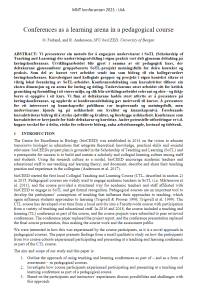
Vi presenterer ein metode for å engasjere undervisarar i SoTL (Scholarship of Teaching and Learning) derundervisingsutvikling i eigen praksisvert delt gjennom deltaking på læringskonferansar. Utviklingsarbeidet blir gjort i ramma av eit pedagogisk kurs, der deltakarane gjennomfører gruppebaserte SoTL-prosjekt meiningsfulle for deira kontekst og praksis. Som del av kursetvert arbeidet sendt inn som bidrag til ein kollegavurdert læringskonferanse. Kursdesignet med kollegiale grupper ogprosjekt i eigen kontekst sikrar ei viktig lokal forankring av SoTL-arbeidet. Konferansedeltaking som kursaktivitet tilfører ein ekstra dimensjon og enarenafor læring og deling. Undervisarane utset arbeidet sitt for kritisk gransking og formidling i eit større miljø, og slik blir utviklingsarbeidet relevant og ekte –og ikkje berre ei oppgåve i eit kurs.Vi finn at deltakarane hadde stort utbytte av å presentere på læringskonferansar, og opplevde at konferansedeltaking gav meirverdi til kurset. Å presentere for eit interessert og kunnskapsrikt publikum var inspirerande og meiningsfullt, men undervisarane kjende òg på usikkerheit om kvalitetog kunnskapsnivå. Førebuande kursaktivitetar bidrog til å styrke sjølvtillit og kvalitet, og førebygge usikkerheit.Konferanse som kursaktivitet er krevjandefor både deltakarar og kursleiar. Andre potensielle utfordringarer t.d. høgare terskel for å delta, risikofor refuserte bidrag, auka arbeidsmengde, kostnad og tidsbruk.
Reference and link to the article
Førland O and Andersson R. 2021. Conferences as a learning arena in a pedagogical course – MNT-konferansen 2021
Abstract

Practical teaching can give authentic learning experiences and teach valuable skills for undergraduate students in the STEM disciplines. One of the main ways of giving students such experiences, laboratory teaching, is met with many challenges such as budget cuts, increased use of virtual learning, and currently the university lockdowns due to the COVID‐19 pandemic. We highlight how at‐home do‐it‐yourself (DIY) experiments can be a good way to include physical interaction with your study organism, system, or technique to give the students a practical, authentic learning experience. We hope that by outlining the benefits of a practical, at‐home, DIY experiment we can inspire more people to design these teaching activities in the current remote teaching situation and beyond. By contributing two examples in the field of plant biology we enrich the database on experiments to draw inspiration from for these teaching methods.
Keywords: at-home experiment, botany experiment, inquiry-based learning, remote learning, student active
Reference and link to the article
Gya, R, Bjune, AE. Taking practical learning in STEM education home: Examples from do‐it‐yourself experiments in plant biology. Ecol Evol. 2021; 00: 1– 7. https://doi.org/10.1002/ece3.7207
Abstract

Undergraduate student participation in course-based research experiences results in many positive outcomes, but there is a lack of evidence demonstrating which elements of a research experience are necessary, especially for non-biology majors. Broad relevance is one element that can be logistically challenging to incorporate into research experiences in large-enrollment courses. We investigated the impacts of broad relevance in a short-term research experience in an introductory biology course for non-majors. Students either participated in an open-inquiry research experience (OI-RE), where they developed their own research question, or a broadly relevant research experience (BR-RE), where they investigated a question assigned to them that was relevant to an ongoing research project. We found a significant association between the type of research project experienced and students’ preference for an experience, with half of the students in the OI-RE group and nearly all students in the BR-RE group preferring a broadly relevant research experience. However, since science confidence increased over the course for both groups, these findings indicate that while students who participated in a BR-RE valued it, broadly relevant research experiences may not be necessary for positive outcomes for non-majors.
Reference and link to the article
Hebert S, Blum J, Wassenberg D, Marks D, Barry K, Cotner S. 2021. Open inquiry versus broadly relevant short-term research experiences for non-biology majors†. J. Microbiol. Biol. Educ. 22(1): doi:10.1128/jmbe.v22i1.2167
Abstract

I denne artikkelen ser vi på sammenhengen mellom læringsaktiviteter og innholdeti læringsutbyttebeskrivelser. Vår undersøkelse av læringsutbyttebeskrivelser viser at flere avferdighetene og de generelle kompetansene inngår i emnene sine læringsaktiviteter, men at de ikkealltid gjenspeiles i læringsutbyttebeskrivelsene på emnene.Læringsutbyttebeskrivelser tydeliggjør for student og underviser hva forventet læring i emnet er og bør derfor vise det reelle innholdet i emnene. Ved utforming av læringsutbyttebeskrivelser er det viktig å se på sammenhengen mellom læringsutbytte, læringsaktivitet og vurdering(constructive alignment) (Biggs og Tang, 2011; Biggs, 2014). Læringsutbyttet gir oversikt overinnhold i emner og konkretiserer hvilke emner som har ansvar for ulike deler av gradens samledelæringsutbytte. Læringsutbyttebeskrivelser kan også vise arbeidslivsrelevans gjennomsynliggjøring av ferdigheter og generell kompetanse (Smith og Reid, 2018).Bakgrunnen for undersøkelsen er prosjektetGeneriske ferdigheterved Det matematisk- naturvitenskapelige fakultet ved Universitetet i Bergen. Prosjektet inkluderer en emnekartlegging(curriculum mapping) der emnenes innhold av ferdigheter og generell kompetanse uttrykt somsamarbeid, skriftlig og muntlig kommunikasjon samtkritisk tenking og informasjonskompetanse bleidentifisert. Vi undersøkte om svarene fra emnekartleggingen kan gjenfinnes i læringsutbyttebekrivelsene for utvalgte emner. Gjennomføring av emnekartlegging kan brukes for å se på innholdet av generell kompetanse i utdanningen, men det er lite fokus på den praktiske utførelsen av dette (Sumsion og Goodfellow, 2004; Lam og Tsui, 2014). Derimot er det få artikler som konkretiserer hvordan man bruker resultatene fra en emnekartlegging for å identifisere mangler i læringsutbyttebeskrivelser. Dette paperet vil kunne bidra til en bedre forståelse av hvordan man kan jobbe med dette..
Reference and link to the article
Holtermann K, Gjerdevik B., Rensvik B U, Balevik S B and Stokka T. 2021. Er vi bedre på læringsaktiviteter enn på læringsutbyttebeskrivelser – MNT-konferansen 2021
Abstract
The main aim of this study is to test the validity of the Motivation, Engagement, and Thriving in User Experience (METUX) model (Peters, Calvo, & Ryan, 2018) in higher education. We propose a process model in which we investigate how the need-satisfaction of digital learning tools within the interface sphere and task sphere accounts for engagement, learning, and well-being. A total of 426 higher education students drawn from two subsamples participated in this cross-sectional study. A structural equation model shows that interface autonomy and competence satisfaction positively predict task autonomy and competence. Task competence, in turn, negatively predicts focused attention and positively perceived usability and well-being. Task autonomy positively predicts perceived usability and reward. Based on our results, we provide some initial support for the METUX model in higher education. However, more validation work is needed to improve the scale that measures need-satisfaction in the interface and task spheres. Moreover, we find no support for the effect of task sphere on learning. Further investigations are needed into how METUX can be used in domain- and situation-specific contexts to account for increases in engagement, learning, and well-being. Finally, future studies need to include all aspects of the METUX model in order to fully test its validity.
Keywords: Higher education, Self-determination theory, METUX, Achievement, Technology
Reference and link to the article
Jeno LM, Diseth Å and Grytnes J-A (2021) Testing the METUX Model in Higher Education: Interface and Task Need–Satisfaction Predict Engagement, Learning, and Well-Being. Front. Psychol. 12:631564. doi: 10.3389/fpsyg.2021.631564
Abstract
 Inadequate academic functioning among students might be a main cause of the considerable dropout rates, and well-being and achievement problems in higher education. Few studies address the role of motivation for academic functioning. Thus, using Self-Determination Theory, the main goal of this study was to investigate motivational determinants of academic functioning among 406 biology students (mode age 21-25, 69.5% females) from nine higher education institutions in Norway. Data were collected using an online survey and analyzed using Structural Equation Modeling. Results show that teacherś autonomy-support positively predicts autonomous motivation and perceived competence among the students. In turn, autonomous motivation and competence positively predicts vitality, and negatively predicts dropout intentions. Achievement was only predicted by perceived competence. We recommend that instructors adopt an autonomy-supportive teaching style, for example by providing a meaningful rationale when introducing teaching and learning activities, for students to feel more competent and autonomous in their motivation.
Inadequate academic functioning among students might be a main cause of the considerable dropout rates, and well-being and achievement problems in higher education. Few studies address the role of motivation for academic functioning. Thus, using Self-Determination Theory, the main goal of this study was to investigate motivational determinants of academic functioning among 406 biology students (mode age 21-25, 69.5% females) from nine higher education institutions in Norway. Data were collected using an online survey and analyzed using Structural Equation Modeling. Results show that teacherś autonomy-support positively predicts autonomous motivation and perceived competence among the students. In turn, autonomous motivation and competence positively predicts vitality, and negatively predicts dropout intentions. Achievement was only predicted by perceived competence. We recommend that instructors adopt an autonomy-supportive teaching style, for example by providing a meaningful rationale when introducing teaching and learning activities, for students to feel more competent and autonomous in their motivation.
Keywords: Motivation; dropout; well-Being; achievement; Self-Determination Theory; higher education; academic functioning
Reference and link to the article
Lucas M. Jeno, Jorun Nylehn, Torstein N. Hole, Arild Raaheim, Gaute Velle & Vigdis Vandvik (2021): Motivational Determinants of Students’ Academic Functioning: The Role of Autonomy-support, Autonomous Motivation, and Perceived Competence, Scandinavian Journal of Educational Research, DOI: 10.1080/00313831.2021.1990125
Abstract
Scholarly digital storytelling combines academic research and digital skills to communicate scholarly work within and beyond the classroom. This article presents three case studies that demonstrate efforts to integrate scholarly digital storytelling, a technology-enhanced assessment, across disciplines, geographic locations, and teaching contexts. The case studies originate in the United States, Northern Ireland [UK], and Norway, and represent learning across multiple disciplines, including history, higher education, geography, and biology. This article explores the potential for scholarly digital storytelling, when carefully planned, scaffolded, and implemented, to engage students in authentic learning, teaching students to think deeply and creatively about disciplinary content while creating sharable digital products.
Keywords: authentic learning, technology-enhanced assessment, scholarly digital storytelling, digital skills
Reference and link to the article
Schrum, Kelly, Niall Majury, and Anne Laure Simonelli. 2021. “Authentic Learning Across Disciplines and Borders With Scholarly Digital Storytelling”. Teaching and Learning Inquiry 9 (2). https://doi.org/10.20343/teachlearninqu.9.2.8
Abstract
Inquiry-based laboratory activities, as a part of science curricula, have been advocated to increase students’ learning outcomes and improve students’ learning experiences, but students sometimes struggle with open-inquiry activities. This study aims to investigate students’ perceptions of inquiry-based learning in a set of laboratory activities, specifically from a psychological (i.e., Self-Determination Theory) perspective. Students’ ratings of the level of inquiry in these activities indicate that students’ perceptions of inquiry align with the instructor-intended amount of inquiry in each exercise. Students’ written responses, explaining their ratings, indicate that students’ perceptions of the amount of inquiry in a given lab exercise relate to their feeling of freedom (or autonomy), competence, and relatedness (or support), during the inquiry-based learning activities. The results imply that instructors implementing inquiry-based learning activities should consider student motivation, and Self-Determination Theory can be a useful diagnostic tool during teaching development.
Keywords: inquiry-based learning, Self-Determination Theory (SDT), student perceptions, laboratory activities
Reference and link to the article
Zhao, FangFang, Gillian Roehrig, Lorelei Patrick, Chantal Levesque-Bristol, and Sehoya Cotner. 2021. “Using a Self-Determination Theory Approach to Understand Student Perceptions of Inquiry-Based Learning”. Teaching and Learning Inquiry 9 (2). doi: https://doi.org/10.20343/teachlearninqu.9.2.5
Abstract

The COVID‐19 crisis has forced researchers in Ecology to change the way we work almost overnight. Nonetheless, the pandemic has provided us with several novel components for a new way of conducting science. In this perspective piece, we summarize eight central insights that are helping us, as early career researchers, navigate the uncertainties, fears, and challenges of advancing science during the COVID‐19 pandemic. We highlight how innovative, collaborative, and often Open Science‐driven developments that have arisen from this crisis can form a blueprint for a community reinvention in academia. Our insights include personal approaches to managing our new reality, maintaining capacity to focus and resilience in our projects, and a variety of tools that facilitate remote collaboration. We also highlight how, at a community level, we can take advantage of online communication platforms for gaining accessibility to conferences and meetings, and for maintaining research networks and community engagement while promoting a more diverse and inclusive community. Overall, we are confident that these practices can support a more inclusive and kinder scientific culture for the longer term.
Keywords: data sharing, early career, inclusivity, networking, online collaboration, skill development
Reference and link to the article
Chacón-Labella, J., Boakye, M., Enquist, B. J., Farfan-Rios, W., Gya, R., Halbritter, A. H., Middleton, S. L., von Oppen, J., Pastor-Ploskonka, S., Strydom, T., Vandvik, V., and Geange, S. R. (2020). From a crisis to an opportunity: Eight insights for doing science in the COVID-19 era and beyond. Ecology and Evolution. 2020;00:1–9. DOI: 10.1002/ece3.7026
Abstract

Background: understanding student motivational factors such as test anxiety and science confidence is important for increasing retention in science, technology, engineering, and math (STEM), especially for underrepresented students, such as women. We investigated motivational metrics in over 400 introductory biology students in Norway, a country lauded for its gender equality. Specifically, we measured test anxiety and science confidence and combined students’ survey responses with their performance in the class.
Results: we found that female students expressed more test anxiety than did their male counterparts, and the anxiety they experienced negatively predicted their performance in class. By contrast, the anxiety male students experienced did not predict their performance. Conversely, men had higher confidence than women, and confidence interacted with gender, so that the difference between its impact on men’s and women’s performance was marginally significant.
Conclusions: our findings have implications for STEM instructors, in Norway and beyond: specifically, to counter gender-based performance gaps in STEM courses, minimize the effects of test anxiety.
Keywords: Gender equity, Science confidence, Test anxiety, Higher education, STEM
Reference and link to the article
Cotner, S., Jeno, L.M., Walker, J.D. et al. Gender gaps in the performance of Norwegian biology students: the roles of test anxiety and science confidence. IJ STEM Ed 7, 55 (2020). https://doi.org/10.1186/s40594-020-00252-1
Abstract
Being trapped in Peru as countries went into lockdown showed us just how little support is available to researchers working abroad, a group of biologists writes
Reference and link to the article
Cotner, S, et al. 2020. International scientists need better support during global emergencies. https://www.timeshighereducation.com/blog/international-scientists-need-better-support-during-global-emergencies
Abstract

As Open Science practices become more commonplace, there is a need for the next generation of scientists to be well versed in these aspects of scientific research. Yet, many training opportunities for early career researchers (ECRs) could better emphasize or integrate Open Science elements. Field courses provide opportunities for ECRs to apply theoretical knowledge, practice new methodological approaches, and gain an appreciation for the challenges of real‐life research, and could provide an excellent platform for integrating training in Open Science practices. Our recent experience, as primarily ECRs engaged in a field course interrupted by COVID‐19, led us to reflect on the potential to enhance learning outcomes in field courses by integrating Open Science practices and online learning components. Specifically, we highlight the opportunity for field courses to align teaching activities with the recent developments and trends in how we conduct research, including training in: publishing registered reports, collecting data using standardized methods, adopting high‐quality data documentation, managing data through reproducible workflows, and sharing and publishing data through appropriate channels. We also discuss how field courses can use online tools to optimize time in the field, develop open access resources, and cultivate collaborations. By integrating these elements, we suggest that the next generation of field courses will offer excellent arenas for participants to adopt Open Science practices.
Keywords: career development, early career researchers, FAIR principles, higher education, pedagogy, reproducible research
Reference and link to the article
Geange SR, von Oppen J, Strydom T, et al. Next-generation field courses: Integrating Open Science and online learning. Ecol Evol. 2020;00:1–11. https://doi.org/10.1002/ece3.7009
Abstract

In this study we investigate the effect of manipulating intrinsic goals, relative to extrinsic goals, in a mobile learning tool and traditional textbook for biology students. Using Self- Determination Theory, we hypothesized that framing intrinsic goals in a need-supportive mobile learning app would enhance motivation, intentions, effort, and achievement, relative to extrinsic goals in a traditional tool (textbook). We randomized 128 undergraduate students learning to identify species in this 2 × 2 experiment. Using Bayesian analyses, results show a credible interaction effect between the mobile app and intrinsic goal-framing for intentions and identified regulation. For effort and achievement, the main effect of mobile learning is credible with substantial effect sizes. We argue that these findings are due to the need-supportive features within the mobile app and need-satisfying experience of pursuing intrinsic goals. For intrinsic motivation and amotivation, however, extrinsic goal-framing and intrinsic goal-framing, respectively, are credible and positive main effects, which is unexpected. More research is needed to investigate if this contradictory finding is replicated by others, or if students are pursuing extrinsic goals for autonomous motivation. Bayesian multigroup path analysis found across both groups that identified regulation predicted intentions, and intrinsic motivation predicted effort and achievement. For the extrinsic goal-framing group, amotivation predicted achievement, identified regulation predicted effort and achievement, and intrinsic motivation negatively predicted intentions. The results of our study provide theoretical implications for how goal-framing energizes different types of motivation within the mLearning context, and how manipulation within technology may have a differential effect on motivation than a physical agent.
Keywords: Self-determination theory, Bayesian analysis, Goal-framing, Higher education, mLearning
Reference and link to the articleJeno, L. M., Dettweiler, U. and Grytnes, J.-A. (2020). The effects of a goal-framing and need-supportive app on undergraduates’ intentions, effort, and achievement in mobile science learning. Computers & Education 159 (2020) 104022 https://doi.org/10.1016/j.compedu.2020.104022
Abstract

Field courses, while generally considered as beneficial for students, are challenging to implement and can lead to strained relationships between local residents and visiting scientists. Thus, it is critical to both maximize the educational value of field courses and help students develop contextualized science communication skills. We report on the development of a science communication module, integrated into an existing field-based ecology course, which aims to add value to an international field course enrolling students from multiple countries. Specifically, students surveyed local residents about their knowledge and perceptions of climate change, and then discussed their findings.
Keywords: climate change, field courses, science communication.
Reference and link to the article
Patrick, L., S. Thompson, A. H. Halbritter, B. J. Enquist, V. Vandvik, S. Cotner. 2020. Adding Value to a Field-Based Course with a Science Communication Module on Local Perceptions of Climate Change. Bull Ecol Soc Am 101(3):e01680. https://doi.org/10.1002/bes2.1680
Abstract

Functional trait data enhance climate change research by linking climate change, biodiversity response, and ecosystem functioning, and by enabling comparison between systems sharing few taxa. Across four sites along a 3000–4130m a.s.l. gradient spanning 5.3°C in growing season temperature in Mt. Gongga, Sichuan, China, we collected plant functional trait and vegetation data from control plots, open top chambers (OTCs), and reciprocally transplanted vegetation turfs. Over fve years, we recorded vascular plant composition in 140 experimental treatment and control plots. We collected trait data associated with plant resource use, growth, and life history strategies (leaf area, leaf thickness, specifc leaf area, leaf dry matter content, leaf C, N and P content and C and N isotopes) from local populations and from experimental treatments. The database consists of 6,671 plant records and 36,743 trait measurements (increasing the trait data coverage of the regional fora by 500%) covering 11 traits and 193 plant taxa (ca. 50% of which have no previous published trait data) across 37 families.
Keywords: climate-change ecology, community ecology, natural variation in plants.
Reference and link to the article
Vandvik, V., Halbritter, A.H., Yang, Y. et al. Plant traits and vegetation data from climate warming experiments along an 1100 m elevation gradient in Gongga Mountains, China. Sci Data 7, 189 (2020). https://doi.org/10.1038/s41597-020-0529-0
Abstract

As science, technology, engineering, and mathematics (STEM) classrooms in higher education transition from lecturing to active learning, the frequency of student interactions in class increases. Previous research documents a gender bias in participation, with women participating less than would be expected on the basis of their numeric proportions. In the present study, we asked which attributes of the learning environment contribute to decreased female participation: the abundance of in-class interactions, the diversity of interactions, the proportion of women in class, the instructor’s gender, the class size, and whether the course targeted lower division (first and second year) or upper division (third or fourth year) students. We calculated likelihood ratios of female participation from over 5300 student–instructor interactions observed across multiple institutions. We falsified several alternative hypotheses and demonstrate that increasing class size has the largest negative effect. We also found that when the instructors used a diverse range of teaching strategies, the women were more likely to participate after small-group discussions.
Reference and link to the article
Cissy J Ballen, Stepfanie M Aguillon, Azza Awwad, Anne E Bjune, Daniel Challou, Abby Grace Drake, Michelle Driessen, Aziza Ellozy, Vivian E Ferry, Emma E Goldberg, William Harcombe, Steve Jensen, Christian Jørgensen, Zoe Koth, Suzanne McGaugh, Caroline Mitry, Bryan Mosher, Hoda Mostafa, Renee H Petipas, Paula A G Soneral, Shana Watters, Deena Wassenberg, Stacey L Weiss, Azariah Yonas, Kelly R Zamudio, Sehoya Cotner, Smaller Classes Promote Equitable Student Participation in STEM, BioScience, Volume 69, Issue 8, August 2019, Pages 669–680, https://doi.org/10.1093/biosci/biz069
Abstract

Portfolio-based designs are among the most popular student-centered approaches in higher education. While the pedagogical literature typically provides generic advice on ideal portfolio-based designs, there is little empirical data on how such designs are developed over time and what design decisions teachers take in response to challenges in practice. This article provides an empirical account of a three-year design cycle of a portfolio-based ecology course at a Norwegian university. It investigates how the design changed over the years and how these changes related to the challenges the teacher met during the enactment of the course. To that end, a thematic analysis of course plans, evaluations, and interviews with the designing teacher was conducted. The findings show how the teacher introduced, removed, and (re-)configured different course components in order to address challenges related to the limited coherence between portfolio items and organized class meetings, and students’ limited engagement with the disciplinary knowledge. Thereby, the course design gradually evolved from a portfolio-based design towards a hybrid design combining portfolio, traditional exam and team-based learning. This study illustrates that portfolio-based designs have great potential but no guarantee to support students in active engagement with knowledge; and that teachers need to actively maintain their student-centered focus in their designs by responding flexibly to the emerging challenges.
Keywords: portfolios, course design, biology education
Reference and link to the article
Esterhazy, R. and Fiksen, Ø. (2019). Evolution of a portfolio-based design in ecology: a three-year design cycle. Uniped, 01/2019 (volum 42) https://doi.org/10.18261/issn.1893-8981-2019-01-05
Abstract

Perceived novelty in mobile applications is an inevitable aspect of today’s technologies. Studies suggest that this perceived novelty effect increases motivation but wanes once the user becomes accustomed to the product. Using a Self-Determination Theory approach, the present study investigates how different tools relate to students’ motivation, basic psychological needs, and achievement, over and above the effect of perceived novelty. The results from a randomized controlled experiment show that a mobile-learning tool and a digital version of a textbook are perceived as more novel than a traditional textbook. However, only the mobile-learning tool enhances the students’ basic psychological needs. Additionally, using path-analysis, we find that the mobile-learning tool, need-satisfaction within the mobile-learning tool, and autonomous motivation account for achievement and internalization, over and above the effect of novelty. We argue that this finding is due to the inherent need-supportive elements within the mobile-learning tool that satisfy the basic psychological needs.
Reference and link to the article
Jeno L.M., Vandvik V., Eliassen S. & Grytnes J.-A. Testing the novelty effect of an m-learning tool on internalization and achievement: A Self-Determination Theory approach, Computers & Education (2019), doi: https://doi.org/10.1016/j.compedu.2018.10.008
Abstract

We extended the research on autonomy-supportive teaching to universities and examined the relationships between autonomous motivation to teach and autonomy-supportive teaching. Autonomously motivated university instructors were more autonomy-supportive instructors. The freedom to make pedagogical decisions was negatively correlated with external motivation towards teaching. Participants indicated that large class sizes, high teaching loads, publication pressures, and a culture that undervalues effective undergraduate teaching undermined both student learning and their feelings of autonomy. Together these results present a picture of a subset of university instructors who remained autonomously motivated to teach, irrespective of barriers they experienced from university administrators or policies.
Reference and link to the article
Yasué, Maï, Jeno, Lucas M., and Langdon, Jody L. (2019) "Are Autonomously Motivated University Instructors More Autonomy-Supportive Teachers?," International Journal for the Scholarship of Teaching and Learning: Vol. 13: No. 2, Article 5.
Available at: https://digitalcommons.georgiasouthern.edu/ij-sotl/vol13/iss2/5
Abstract

Gender differences in academic performance and attitudes are widespread in male-stereotyped disciplines but rarely are studied in the social sciences. To assess the extent that gender influences the behavior of undergraduate women in political science, participation was analyzed in a large (N = 130) introductory comparative-politics class at the University of Bergen—a large public university in Norway. In the 2016 fall semester, observers documented classroom behaviors of men and women using a protocol that characterizes types of in-class participation. Findings showed that women participate less than expected given their observed numbers in the classroom. After the semester ended, we provided an opportunity for students to describe why they chose to participate and whether they felt that barriers existed in the classroom that prevented them from expressing their opinions. This article characterizes those responses and presents the first study to draw conclusions about the gendered educational experience in political science by integrating these qualitative and quantitative results.
Reference and link to the article
Ballen, Cissy J.; Lee, Dahsol; Rakner, Lise; Cotner, Sehoya Harris Politics a “Chilly” Environment for Undergraduate Women in Norway. PS: Political Science and Politics 2018 (1049-0965) Vol. 51 (3), s.653-658. DOI: https://doi.org/10.1017/S1049096518000045
Abstract

This paper reports an investigation of biology students’ discussion of knowing in work placements, as accounted in blogs. Twenty-two blogs, containing 78 individual entries, written in conjunction with a work placement course for students in a tertiary level biology program, have been analysed in the study (The blogs are publicly available here: https://biopraksis.w.uib.no). The aim of the paper is to increase understanding of how work placements shape biology students’ personal epistemological trajectories. The analysis is performed by employing a theoretical lens that emphasizes the situated nature of knowing, as enacted in working practices. The blog accounts consist of the students’ appraisal of their own learning and knowing in work placements, situated in biology undergraduate education. The investigation suggests that the students’ personal epistemologies develop in an interplay with context and personal epistemologies to shape their trajectories toward biology knowing. These trajectories have been analysed in terms of their procedural, conceptual, and dispositional dimensions. The use of blogs as a data source is argued to be appropriate to analyse personal epistemologies. Other strengths and weaknesses of this design are discussed.
Reference and link to the article
Hole, T. N., Velle, G., Riese, H., Raaheim, A., & Simonelli, A. L. (2018). Biology students at work: Using blogs to investigate personal epistemologies. Cogent Education, 5(1), 1563026. https://doi.org/10.1080/2331186X.2018.1563026
Abstract
 This study aimed to discern sociocultural processes through which students learn in field excursions. To achieve this aim, short-term ethnographic techniques were employed to examine how undergraduate students work and enact knowledge (or knowing) during a specific field excursion in biology. The students participated in a working practice that employed research methods and came to engage with various biological phenomena over the course of their work. A three-level analysis of the students` experiences focused on three processes that emerged: participatory appropriation, guided participation, and apprenticeship. These processes derive from advances in practice-oriented theories of knowing. Through their work in the field, the students were able to enact science autonomously; they engaged with peers and teachers in specific ways and developed new understandings about research and epistemology founded on their experiences in the field. Further discussion about the use of “practice” and “work” as analytical concepts in science education is also included.
This study aimed to discern sociocultural processes through which students learn in field excursions. To achieve this aim, short-term ethnographic techniques were employed to examine how undergraduate students work and enact knowledge (or knowing) during a specific field excursion in biology. The students participated in a working practice that employed research methods and came to engage with various biological phenomena over the course of their work. A three-level analysis of the students` experiences focused on three processes that emerged: participatory appropriation, guided participation, and apprenticeship. These processes derive from advances in practice-oriented theories of knowing. Through their work in the field, the students were able to enact science autonomously; they engaged with peers and teachers in specific ways and developed new understandings about research and epistemology founded on their experiences in the field. Further discussion about the use of “practice” and “work” as analytical concepts in science education is also included.
Reference and link to the article
Hole (2018). Working and Learning in a Field Excursion. CBE – Life Sciences Educational Vol 17, No 2 (2018), pp 1-11
Abstract

We investigate a model based on Self-Determination Theory (SDT) to predict academic achievement and dropout intentions among biology students in higher education in Norway. Students (n = 754) from a representative national sample participated in this cross-sectional study. The results align with our hypotheses and SDT assumptions. The model explains a substantial amount of the variance in academic achievement and dropout intentions. Specifically, autonomous motivation and perceived competence positively predict academic achievement and negatively predict dropout intentions. Controlled motivation is unrelated to academic achievement and is a positive predictor of dropout intentions. Furthermore, significant indirect effects show that need-supportive teachers and students’ intrinsic aspirations positively predict academic achievement and negatively predict dropout intentions, via autonomous motivation and perceived competence. We recommend teachers to support students’ need for autonomy, competence and relatedness, by providing choice and volition to facilitate autonomous motivation, and give students effectance-relevant feedback and optimal challenges to increase perceived competence.
Reference and link to the article
Lucas M. Jeno, Anne G. Danielsen & Arild Raaheim (2018) A prospective investigation of students’ academic achievement and dropout in higher education: a Self-Determination Theory approach, Educational Psychology, DOI: 10.1080/01443410.2018.1502412
Abstract
 From the lens of Self‐Determination Theory, this study investigated the effects of a mobile application tool for identifying species on biology students’ achievement and well‐being. It was hypothesized that the mobile application, compared to a textbook, would enhance feelings of competence and autonomy and, in turn, intrinsic motivation, positive affect and achievement, because the mobile application’s built‐in functions provide students with choice and volition, informational feedback, and optimal challenges. Fifty‐eight second‐year students were randomly assigned to use either the mobile application or a textbook for a learning task. Well‐being was assessed before and after the learning task, and intrinsic motivation, perceived competence, perceived autonomy and achievement were assessed after the task. Results indicated that the mobile application, relative to the textbook, produced higher levels of students’ perceived competence, perceived autonomy and intrinsic motivation. Further, the mobile application had indirect effects on positive affect through autonomy, competence and intrinsic motivation, and on achievement through competence.
From the lens of Self‐Determination Theory, this study investigated the effects of a mobile application tool for identifying species on biology students’ achievement and well‐being. It was hypothesized that the mobile application, compared to a textbook, would enhance feelings of competence and autonomy and, in turn, intrinsic motivation, positive affect and achievement, because the mobile application’s built‐in functions provide students with choice and volition, informational feedback, and optimal challenges. Fifty‐eight second‐year students were randomly assigned to use either the mobile application or a textbook for a learning task. Well‐being was assessed before and after the learning task, and intrinsic motivation, perceived competence, perceived autonomy and achievement were assessed after the task. Results indicated that the mobile application, relative to the textbook, produced higher levels of students’ perceived competence, perceived autonomy and intrinsic motivation. Further, the mobile application had indirect effects on positive affect through autonomy, competence and intrinsic motivation, and on achievement through competence.
Reference and link to the article
Jeno, L. M., Adachi, P. J. C., Grytnes, J.-A., Vandvik, V., Deci, E. L. The effects of m‐learning on motivation, achievement and well‐being: A Self‐Determination Theory approach (2018). British journal of educational technology , 2018.
Abstract
 The nature of science (NOS) is a primary goal in school science. Most teachers are not well-prepared for teaching NOS, but a sophisticated and in-depth understanding of NOS is necessary for effective teaching. Some authors emphasize the need for teaching NOS in context. Species, a central concept in biology, is proposed in this article as a concrete example of a means for achieving increased understanding of NOS. Although species are commonly presented in textbooks as fixed entities with a single definition, the concept of species is a highly discussed one in the science and the philosophy of biology. A multitude of species concepts exist, reflecting both the views and interests of researchers and their utility in different organism groups. The present study serves to address the following questions: How do textbooks in Norwegian primary and lower secondary schools present the concept of species? Can inquiries into the concept of “species” serve to highlight aspects of NOS? A review of the available literature on species and species concepts in school is also performed. In the schoolbooks, the biological species concept is commonly used as the main definition, whereas the morphological species concept is represented by additional remarks of similarity. The potential and pitfalls of using the species concept for teaching NOS are discussed, with NOS being discussed both as a family resemblance concept and as a consensus list. Teacher education is proposed as a starting point for inducing a more sophisticated view of biology into schools.
The nature of science (NOS) is a primary goal in school science. Most teachers are not well-prepared for teaching NOS, but a sophisticated and in-depth understanding of NOS is necessary for effective teaching. Some authors emphasize the need for teaching NOS in context. Species, a central concept in biology, is proposed in this article as a concrete example of a means for achieving increased understanding of NOS. Although species are commonly presented in textbooks as fixed entities with a single definition, the concept of species is a highly discussed one in the science and the philosophy of biology. A multitude of species concepts exist, reflecting both the views and interests of researchers and their utility in different organism groups. The present study serves to address the following questions: How do textbooks in Norwegian primary and lower secondary schools present the concept of species? Can inquiries into the concept of “species” serve to highlight aspects of NOS? A review of the available literature on species and species concepts in school is also performed. In the schoolbooks, the biological species concept is commonly used as the main definition, whereas the morphological species concept is represented by additional remarks of similarity. The potential and pitfalls of using the species concept for teaching NOS are discussed, with NOS being discussed both as a family resemblance concept and as a consensus list. Teacher education is proposed as a starting point for inducing a more sophisticated view of biology into schools.
Reference and link to the article
Nyléhn, J., & Ødegaard, M. (2018). The “Species” Concept as a Gateway to Nature of Science. Species Concepts in Norwegian Textbooks. Science & Education, 27(7-8), 685-714. doi: https://doi.org/10.1007/s11191-018-0007-7
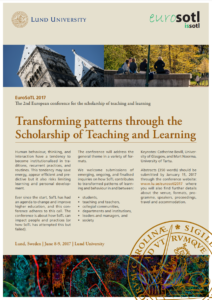 This year’s EuroSoTL conference took place at Lunds Universitet on June 8th-9th. Participants in bioCEED's CPC course 2019/17 contributed with 5 articles and corresponding presentations.. The full list of contributions and authors is found below with links to the articles published in the special edition of the Nordic Journal of STEM Education.
This year’s EuroSoTL conference took place at Lunds Universitet on June 8th-9th. Participants in bioCEED's CPC course 2019/17 contributed with 5 articles and corresponding presentations.. The full list of contributions and authors is found below with links to the articles published in the special edition of the Nordic Journal of STEM Education.
- Bjune, A., Grung, B., Holst, B. & Olsen, L. (2017). Testing the impact of active learning in first year undergraduate natural science courses.
- Borstad, C., Forchhammer, M., & Gabrielsen T. M. (2017). Active learning and course alignment in thematically complex courses.
- Damsgård, B., Strømseng, E., & Varpe, Ø. (2017). Are learning outcomes affected by course intensity and workload?
- Jørgensen, C., Goksøyr, A., Hjelle, K.L. & Linge, H. (2017). Exams as learning arena: A criterion-based system for justified marking, student feedback, and enhanced constructive alignment.
- Keers, H., Salvanes, A.G., Grytnes, JA & Waagbø, R. (2017). How Technologies Motivate and Enhance Student Learning.
All articles submitted to the conference are available HERE.
This year’s MNT-konferansen “Transformative education” took place in Oslo, Hotel Soria Moria on March 30th-31st. bioCEED contributed with 10 articles and corresponding presentations as well as an overview of the goals and activities of the Centre of Excellence. The full list of contributions and authors is found below with links to the articles published in the special edition of the Nordic Journal of STEM Education.
 Korleis få professorar med på ein kollegial SoTL-kultur? – R. Andersson, P. B. Eidesen, Ø. Fiksen, O. Førland, S. Stefansson og V. Vandvik.
Korleis få professorar med på ein kollegial SoTL-kultur? – R. Andersson, P. B. Eidesen, Ø. Fiksen, O. Førland, S. Stefansson og V. Vandvik.- Collegial evaluation of writing as a learning activity in a bachelor programme – Heidi Lie Andersen, Øyvind Fiksen, Lawrence Kirkendall, Sigurd Stefansson.
- Strategies to document active learning practices in biology – Sehoya Cotner, Lucas M Jeno, Cissy Ballen.
- Utnytter vi potensialet for læring og personlig utvikling i feltundervisning? – P. B. Eidesen, A. Vader og J. E. Søreide.
- Hvordan teknologi bidrar til biologi-studenters motivasjon og læring – L. M. Jeno, J.A. Grytnes og Vigdis Vandvik.
- Developing work placements in a discipline education – G. Velle and T. Nielsen Hole.
- Numerical competence and quantitative skills in biology education – S. Eliassen, J. Kolding, J. Smedmark, and V. Vandvik.
- Sense and sensibility in workload calculation – Jonathan Soulé, Oddfrid Førland, and Tina Dahl.
- Norway’s gender gap: classroom participation in undergraduate introductory science – Cissy Ballen, Marie Danielsen, Christian Jørgensen, John-Arvid Grytnes, and Sehoya Cotner.
- Kan integrering i fagmiljøet øke motivasjon hos studenter? R. Gya og M. V. Bjordal.
- bioCEED – Senter for fremragende utdanning i biologi
All articles submitted to the conference are available HERE.
Abstract
 Biology students traditionally use a textbook in the field and on courses to identify species, but now a new mobile-application tool has been developed as an alternative. Guided by Self-Determination Theory (SDT) we conducted an experimental study to test the effect of the mobile-application, relative to the traditional textbook, on students’ intrinsic motivation, perceived competence, and achievement. Seventy-one students were randomly assigned to either an experimental condition (mobile application – ArtsApp) or control condition (textbook – Lids flora). As hypothesised, the students using ArtsApp had higher intrinsic motivation, perceived competence, and achievement, compared to the textbook control group, with medium to large effect sizes. Furthermore, using the mobile application, relative to the textbook, predicted intrinsic motivation, which in turn, predicted higher achievement scores in a path analysis. Lastly in a hierarchical regression analysis, intrinsic motivation and autonomous motivation accounted over and above in students’ interest for species identification, and importance of knowing species. These results are in line with SDT’s theorising: emphasising that when students act out of interest, choice, and have an internal locus of causality, they achieve better outcomes, presumably because these satisfy students’ psychological needs for autonomy, competence, and relatedness. Factors facilitating this are interest, choice, and feedback, which we argue are in-built functions in the mobile application as opposed to the textbook, and which might account for the positive results. Further studies with several student-groups and complex designs are needed before inferring causality across educational levels. Based on the present study, we recommend that biology teachers in higher education employ mobile application tools in species identification due to increases in motivation and a higher degree of accurate identification of sedges.
Biology students traditionally use a textbook in the field and on courses to identify species, but now a new mobile-application tool has been developed as an alternative. Guided by Self-Determination Theory (SDT) we conducted an experimental study to test the effect of the mobile-application, relative to the traditional textbook, on students’ intrinsic motivation, perceived competence, and achievement. Seventy-one students were randomly assigned to either an experimental condition (mobile application – ArtsApp) or control condition (textbook – Lids flora). As hypothesised, the students using ArtsApp had higher intrinsic motivation, perceived competence, and achievement, compared to the textbook control group, with medium to large effect sizes. Furthermore, using the mobile application, relative to the textbook, predicted intrinsic motivation, which in turn, predicted higher achievement scores in a path analysis. Lastly in a hierarchical regression analysis, intrinsic motivation and autonomous motivation accounted over and above in students’ interest for species identification, and importance of knowing species. These results are in line with SDT’s theorising: emphasising that when students act out of interest, choice, and have an internal locus of causality, they achieve better outcomes, presumably because these satisfy students’ psychological needs for autonomy, competence, and relatedness. Factors facilitating this are interest, choice, and feedback, which we argue are in-built functions in the mobile application as opposed to the textbook, and which might account for the positive results. Further studies with several student-groups and complex designs are needed before inferring causality across educational levels. Based on the present study, we recommend that biology teachers in higher education employ mobile application tools in species identification due to increases in motivation and a higher degree of accurate identification of sedges.
Reference and link to the article
Jeno, L. M., Grytnes, J.-A. and Vandvik, V. (2017). The effect of a mobile-application tool on biology students’ motivation and achievement in species identification: A Self-Determination Theory perspective. Computers and Education, 107, 1-12
Abstract
 We investigate the effects of team-based learning (TBL) on motivation and learning in a quasi-experimental study. The study employs a self-determination theory perspective to investigate the motivational effects of implementing TBL in a physiotherapy course in higher education. We adopted a one-group pretest–posttest design. The results show that the students’ intrinsic motivation, identified regulation, perceived competence, and perceived autonomy support significantly increased going from lectures to TBL. The results further show that students’ engagement and perceived learning significantly increased. Finally, students’ amotivation decreased from pretest to posttest; however, students reported higher external regulation as a function of TBL. Path analysis shows that increases in intrinsic motivation, perceived competence, and external regulation positively predict increases in engagement, which in turn predict increases in perceived learning. We argue that the characteristics of TBL, as opposed to lectures, are likely to engage students and facilitate feelings of competence. TBL is an active-learning approach, as opposed to more passive learning in lectures, which might explain the increase in students’ perception of teachers as autonomy supportive. In contrast, the greater demands TBL puts on students might account for the increase in external regulation. Limitations and practical implications of the results are discussed.
We investigate the effects of team-based learning (TBL) on motivation and learning in a quasi-experimental study. The study employs a self-determination theory perspective to investigate the motivational effects of implementing TBL in a physiotherapy course in higher education. We adopted a one-group pretest–posttest design. The results show that the students’ intrinsic motivation, identified regulation, perceived competence, and perceived autonomy support significantly increased going from lectures to TBL. The results further show that students’ engagement and perceived learning significantly increased. Finally, students’ amotivation decreased from pretest to posttest; however, students reported higher external regulation as a function of TBL. Path analysis shows that increases in intrinsic motivation, perceived competence, and external regulation positively predict increases in engagement, which in turn predict increases in perceived learning. We argue that the characteristics of TBL, as opposed to lectures, are likely to engage students and facilitate feelings of competence. TBL is an active-learning approach, as opposed to more passive learning in lectures, which might explain the increase in students’ perception of teachers as autonomy supportive. In contrast, the greater demands TBL puts on students might account for the increase in external regulation. Limitations and practical implications of the results are discussed.
Reference and link to the article
Jeno, L. M., Raaheim, A., Kristensen, S. M., Kristensen, K. D., Hole, T. N., Haugland, M. J., and Mæland, S. (2017). The Relative Effect of Team-Based Learning on Motivation and Learning: A Self-Determination Theory Perspective. CBE—Life Sciences Education • 16:ar59, Winter 2017.
Abstract
 Higher education is often divided into discipline-oriented and professional programs. Professional programs prepare students for a specific profession and include relevant theoretical and practical knowledge. Discipline-oriented programs emphasize theoretical knowledge and research within a specific discipline or field. Except for a career within research and higher education, discipline-oriented programs provide less obvious links to future careers. The transition from student life to working life may therefore be challenging.
Higher education is often divided into discipline-oriented and professional programs. Professional programs prepare students for a specific profession and include relevant theoretical and practical knowledge. Discipline-oriented programs emphasize theoretical knowledge and research within a specific discipline or field. Except for a career within research and higher education, discipline-oriented programs provide less obvious links to future careers. The transition from student life to working life may therefore be challenging.
In this paper, we present and discuss the development and implementation of a work placement course as part of the disciplinary programs in biology at the University of Bergen. The course was developed to provide students with practical- and work- related competences, to inform
about opportunities for future career and to foster motivation and learning. We have revised the course according to feedback from students, workplace hosts and our experience as course teachers during the six semesters the course has been running.
The work placement course is at the bachelor (BSc) level and consists of two main components; a work placement and the student’s own reporting of placement outcomes. For the placement, the students work 140 hours at a workplace as a biologist. The reporting consists of four open blog-posts, one written reflective essay and a final oral presentation. The course teachers also meet with the students and convey information on the roles of biology and biologists in today’s society through a Facebook group. Feedback from the students, hosts and course teachers point to a range of benefits from work practice in discipline-oriented study programs. Based on our experience, we provide guidance for implementing such courses.
Reference and link to the article
Velle, G., Hole, T. N., Førland, O., Simonelli, A.-L., and Vandvik, V. (2017). Developing work placements in a discipline-oriented education Nordic Journal of STEM Education, Vol. 1, No. 1 (2017), pp 287-306.
Abstract
There has been a gradual change over time towards an increased focus on the collegial and cultural aspects of teaching and learning. According to this perspective, quality emerges not within the individual, but within communities of teachers and students. Developing a quality culture requires a cultural shift supported by training and development activities to ensure that the teachers, as a collegium, have the knowledge and will to develop and change towards learner-centered teaching. Building a scholarly and collegial teaching culture, using the research culture as a model, was a first priority of Centre of Excellence in Biology Education (bioCEED). This paper discusses how a shift towards such a collegial Scholarly Teaching and Learning (SoTL) culture can come about, using the story of bioCEED as a case.
Reference and link to the article
Førland, O., Vandvik, V. and Andersson, R. (2016) The story of bioCEED or how to grow a SoTL culture from scratch. Proceedings of The 38th ANNUAL EAIR FORUM. https://lup.lub.lu.se/search/publication/21da69fd-e9cf-491d-926b-46d4d5e53751
Abstract
Transferable skills as a concept in tertiary education has received increased interest since the Bologna process and through developments in the work market. The concept as a learning goal is seen as a means for ensuring employability in a changing industrial economy as well as increasing legitimacy of skills that are desirable across different disciplines. In this paper I will present some means to develop legitimacy in transferable skill learning in discipline education in general and biology education specifically. A concrete focus is collaboration, which functions as an example of how the intangible nature of some educational goals requires a theoretical response. This is performed on the basis of theoretical conceptions about tacit and work-place learning.
Reference and link to the article
Hole, T. N. (2015). Developing Collaboration as a Transferrable Skills in Biology Tertiary Education. Literacy Information and Computer Education Journal, 6(3), 1971-1975.
Abstract
Based on the work of Self-Determination Theory, this article suggests how to implement Self-Determination Theory based principle in a learner-centered perspective. Higher education has traditionally rested on learning methods that render passive students. Societal changes require self-regulatory skills and an active motivational set. However, lack of theoretical, empirical and practical driven theory in implementation of learner-centered education has lead to a philosophical debate. It is argued for a holistic model for implementing principles derived from Self-Determination Theory (SDT) in a learner-centered paradigm. SDT makes specific prediction for nurturing vs. neglecting learning environments, and thus highly appropriate framework. An important differentiation between types of motivations that differs in relative autonomy, and social climates that may be perceived as amotivating, controlling, and informational is necessary for understanding learning and educational practices. Finally, practical recommendations for teachers in higher education to put into practice. It is argued for a system in which all levels of education supports motivation to support student motivation. Both the institutional level and teacher culture must have a learner centered perspective, further, pre-during-post class preparations are important for high quality learning.
Reference and link to the article
Jeno, L. M. (2015). Encouraging Active Learning in Higher Education: A Self-Determination Theory Perspective. International Journal of Technology and Inclusive Education, 5(1), 716-721
Heidi Lie Andersen, Øyvind Fiksen, Lawrence Kirkendall, Sigurd Stefansson. Collegial evaluation of writing as a learning activity in a bachelor programme – MNT-konferansen 2017. https://doi.org/10.5324/njsteme.v1i1.2248
R. Andersson, P. B. Eidesen, Ø. Fiksen, O. Førland, S. Stefansson og V. Vandvik. Korleis få professorar med på ein kollegial SoTL-kultur? – MNT-konferansen 2017. https://doi.org/10.5324/njsteme.v1i1.2248
Cissy J Ballen, Stepfanie M Aguillon, Azza Awwad, Anne E Bjune, Daniel Challou, Abby Grace Drake, Michelle Driessen, Aziza Ellozy, Vivian E Ferry, Emma E Goldberg, William Harcombe, Steve Jensen, Christian Jørgensen, Zoe Koth, Suzanne McGaugh, Caroline Mitry, Bryan Mosher, Hoda Mostafa, Renee H Petipas, Paula A G Soneral, Shana Watters, Deena Wassenberg, Stacey L Weiss, Azariah Yonas, Kelly R Zamudio, Sehoya Cotner, Smaller Classes Promote Equitable Student Participation in STEM, BioScience, Volume 69, Issue 8, August 2019, Pages 669–680, https://doi.org/10.1093/biosci/biz069
Ballen, Cissy J.; Lee, Dahsol; Rakner, Lise; Cotner, Sehoya Harris Politics a “Chilly” Environment for Undergraduate Women in Norway. PS: Political Science and Politics 2018 (1049-0965) Vol. 51 (3), s.653-658. DOI: https://doi.org/10.1017/S1049096518000045
Cissy Ballen, Marie Danielsen, Christian Jørgensen, John-Arvid Grytnes, and Sehoya Cotner. Norway’s gender gap: classroom participation in undergraduate introductory science – MNT-konferansen 2017. https://doi.org/10.5324/njsteme.v1i1.2325
Chacón-Labella, J., Boakye, M., Enquist, B. J., Farfan-Rios, W., Gya, R., Halbritter, A. H., Middleton, S. L., von Oppen, J., Pastor-Ploskonka, S., Strydom, T., Vandvik, V., and Geange, S. R. (2020). From a crisis to an opportunity: Eight insights for doing science in the COVID-19 era and beyond. Ecology and Evolution. 2020;00:1–9. DOI: 10.1002/ece3.7026
Cotner, S., Jeno, L.M., Walker, J.D. et al. Gender gaps in the performance of Norwegian biology students: the roles of test anxiety and science confidence. IJ STEM Ed 7, 55 (2020). https://doi.org/10.1186/s40594-020-00252-1
Cotner, S, et al. 2020. International scientists need better support during global emergencies. https://www.timeshighereducation.com/blog/international-scientists-need-better-support-during-global-emergencies
Sehoya Cotner, Lucas M Jeno, Cissy Ballen. – Strategies to document active learning practices in biology – MNT-konferansen 2017. https://doi.org/10.5324/njsteme.v1i1.2248
P. B. Eidesen, A. Vader og J. E. Søreide. Utnytter vi potensialet for læring og personlig utvikling i feltundervisning? – MNT-konferansen 2017. https://doi.org/10.5324/njsteme.v1i1.2248
S. Eliassen, J. Kolding, J. Smedmark, and V. Vandvik. Numerical competence and quantitative skills in biology education – MNT-konferansen 2017. https://doi.org/10.5324/njsteme.v1i1.2248
Esterhazy, R. and Fiksen, Ø. (2019). Evolution of a portfolio-based design in ecology: a three-year design cycle. Uniped, 01/2019 (volum 42) https://doi.org/10.18261/issn.1893-8981-2019-01-05
Førland, O., Vandvik, V. and Andersson, R. (2016) The story of bioCEED or how to grow a SoTL culture from scratch. Proceedings of The 38th ANNUAL EAIR FORUM. https://lup.lub.lu.se/search/publication/21da69fd-e9cf-491d-926b-46d4d5e53751
Førland, O. and Andersson, R. 2021. Conferences as a learning arena in a pedagogical course – MNT-konferansen 2021. https://doi.org/10.5324/njsteme.v5i1.3930
Geange SR, von Oppen J, Strydom T, et al. Next-generation field courses: Integrating Open Science and online learning. Ecol Evol. 2020;00:1–11. https://doi.org/10.1002/ece3.7009
Gya, R, Bjune, AE. Taking practical learning in STEM education home: Examples from do‐it‐yourself experiments in plant biology. Ecol Evol. 2021; 00: 1– 7. https://doi.org/10.1002/ece3.7207
R. Gya og M. V. Bjordal. Kan integrering i fagmiljøet øke motivasjon hos studenter? – MNT-konferansen 2017. https://doi.org/10.5324/njsteme.v1i1.2248
Hebert S, Blum J, Wassenberg D, Marks D, Barry K, Cotner S. 2021. Open inquiry versus broadly relevant short-term research experiences for non-biology majors†. J. Microbiol. Biol. Educ. 22(1): doi:10.1128/jmbe.v22i1.2167
Hole, T. N., Velle, G., Riese, H., Raaheim, A., & Simonelli, A. L. (2018). Biology students at work: Using blogs to investigate personal epistemologies. Cogent Education, 5(1), 1563026. https://doi.org/10.1080/2331186X.2018.1563026
Hole, T. N. (2018). Working and Learning in a Field Excursion. CBE – Life Sciences Educational Vol 17, No 2 (2018), pp 1-11, https://doi.org/10.1187/cbe.17-08-0185
Hole, T. N. (2015). Developing Collaboration as a Transferrable Skills in Biology Tertiary Education. Literacy Information and Computer Education Journal, 6(3), 1971-1975. DOI:10.20533/licej.2040.2589.2015.0263
Holtermann, K., Gjerdevik, B., Rensvik, B. U., Balevik, S. B. and Stokka, T. 2021. Er vi bedre på læringsaktiviteter enn på læringsutbyttebeskrivelser – MNT-konferansen 2021. https://doi.org/10.5324/njsteme.v5i1.3913
Lucas M. Jeno, Kjetil Egelandsdal, John-Arvid Grytnes. A qualitative investigation of psychological need-satisfying experiences of a mobile learning application: A Self-Determination Theory approach. Computers and Education Open, Volume 3, 2022, 100108. https://doi.org/10.1016/j.caeo.2022.100108.
Lucas M. Jeno, Jorun Nylehn, Torstein N. Hole, Arild Raaheim, Gaute Velle & Vigdis Vandvik (2021): Motivational Determinants of Students’ Academic Functioning: The Role of Autonomy-support, Autonomous Motivation, and Perceived Competence, Scandinavian Journal of Educational Research, DOI: 10.1080/00313831.2021.1990125
Jeno, L. M., Diseth , Å. and Grytnes, J.-A. (2021). Testing the METUX Model in Higher Education: Interface and task need-satisfaction predict engagement, learning, and well-being. Front. Psychol. | doi: 10.3389/fpsyg.2021.631564
Jeno, L. M., Dettweiler, U. and Grytnes, J.-A. (2020). The effects of a goal-framing and need-supportive app on undergraduates’ intentions, effort, and achievement in mobile science learning. Computers & Education 159 (2020) 104022. https://doi.org/10.1016/j.compedu.2020.104022
Jeno, L. M., Adachi, P. J. C., Grytnes, J.-A., Vandvik, V., Deci, E. L. The effects of m‐learning on motivation, achievement and well‐being: A Self‐Determination Theory approach (2018). British journal of educational technology. https://doi.org/10.1111/bjet.12657
Lucas M. Jeno, Anne G. Danielsen & Arild Raaheim (2018) A prospective investigation of students’ academic achievement and dropout in higher education: a Self-Determination Theory approach, Educational Psychology, DOI: 10.1080/01443410.2018.1502412
Jeno L.M., Vandvik V., Eliassen S. & Grytnes J.-A. (2019). Testing the novelty effect of an m-learning tool on internalization and achievement: A Self-Determination Theory approach. Computers & Education. doi: https://doi.org/10.1016/j.compedu.2018.10.008
Jeno, L. M., Grytnes, J.-A. and Vandvik, V. (2017). The effect of a mobile-application tool on biology students’ motivation and achievement in species identification: A Self-Determination Theory perspective. Computers and Education, 107, 1-12. https://doi.org/10.1016/j.compedu.2016.12.011
Jeno, L. M., Raaheim, A., Kristensen, S. M., Kristensen, K. D., Hole, T. N., Haugland, M. J., and Mæland, S. (2017). The Relative Effect of Team-Based Learning on Motivation and Learning: A Self-Determination Theory Perspective. CBE—Life Sciences Education • 16:ar59, Winter 2017. https://doi.org/10.1187/cbe.17-03-0055
L. M. Jeno, J.A. Grytnes og Vigdis Vandvik. Hvordan teknologi bidrar til biologi-studenters motivasjon og læring – MNT-konferansen 2017. https://doi.org/10.5324/njsteme.v1i1.2248
Jeno, L. M. (2015). Encouraging Active Learning in Higher Education: A Self-Determination Theory Perspective. International Journal of Technology and Inclusive Education, 5(1), 716-721
Møgelvang, A., Nyléhn, J. (2022) Co-operative Learning in Undergraduate Mathematics and Science Education: A Scoping Review. Int J of Sci and Math Educ. https://doi.org/10.1007/s10763-022-10331-0
Møgelvang, A., Vandvik, V., Ellingsen, S., Strømme, C. B., & Cotner, S. (2023). Cooperative learning goes online: Teaching and learning intervention in a digital environment impacts psychosocial outcomes in biology students. International Journal of Educational Research, 117, 102114. https://doi.org/10.1016/j.ijer.2022.102114
Nyléhn, J., & Ødegaard, M. (2018). The “Species” Concept as a Gateway to Nature of Science. Species Concepts in Norwegian Textbooks. Science & Education, 27(7-8), 685-714. doi: https://doi.org/10.1007/s11191-018-0007-7
Patrick, L., S. Thompson, A. H. Halbritter, B. J. Enquist, V. Vandvik, S. Cotner. 2020. Adding Value to a Field-Based Course with a Science Communication Module on Local Perceptions of Climate Change. Bull Ecol Soc Am 101(3):e01680. https://doi.org/10.1002/bes2.1680
Schrum, Kelly, Niall Majury, and Anne Laure Simonelli. 2021. “Authentic Learning Across Disciplines and Borders With Scholarly Digital Storytelling”. Teaching and Learning Inquiry 9 (2). https://doi.org/10.20343/teachlearninqu.9.2.8
Jonathan Soulé, Oddfrid Førland, and Tina Dahl. Sense and sensibility in workload calculation – MNT-konferansen 2017. https://doi.org/10.5324/njsteme.v1i1.2248
Vandvik, V., Halbritter, A.H., Yang, Y. et al. Plant traits and vegetation data from climate warming experiments along an 1100 m elevation gradient in Gongga Mountains, China. Sci Data 7, 189 (2020). https://doi.org/10.1038/s41597-020-0529-0
G. Velle and T. Nielsen Hole. Developing work placements in a discipline education – MNT-konferansen 2017. https://doi.org/10.5324/njsteme.v1i1.2248
Velle, G., Hole, T. N., Førland, O., Simonelli, A.-L., and Vandvik, V. (2017). Developing work placements in a discipline-oriented education Nordic Journal of STEM Education, Vol. 1, No. 1 (2017), pp 287-306. https://doi.org/10.5324/njsteme.v1i1.2344
Zhao, FangFang, Gillian Roehrig, Lorelei Patrick, Chantal Levesque-Bristol, and Sehoya Cotner. 2021. “Using a Self-Determination Theory Approach to Understand Student Perceptions of Inquiry-Based Learning”. Teaching and Learning Inquiry 9 (2). https://doi.org/10.20343/teachlearninqu.9.2.5.
Yasué, Maï; Jeno, Lucas M.; and Langdon, Jody L. (2019) "Are Autonomously Motivated University Instructors More Autonomy-Supportive Teachers?," International Journal for the Scholarship of Teaching and Learning: Vol. 13: No. 2, Article 5.
Available at: https://digitalcommons.georgiasouthern.edu/ij-sotl/vol13/iss2/5 - https://doi.org/10.20429/ijsotl.2019.130205

